It seems we can’t find what you’re looking for. Perhaps searching can help.
Sign Up for newsletter!
Subscribe to get the latest eBook!
Hotline






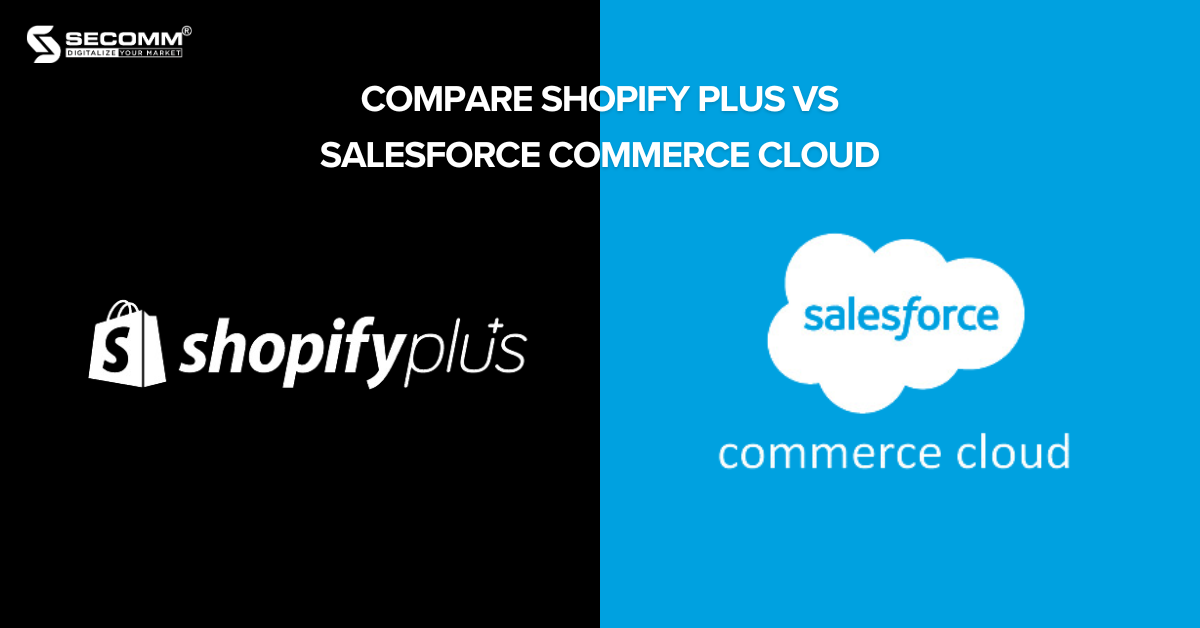
Shopify Plus vs Salesforce Commerce Cloud are two leading platforms chosen by large enterprises worldwide to build eCommerce websites. Each platform has its advantages, from the flexibility and user-friendliness of Shopify Plus to the comprehensive solutions offered by SFCC.
Understanding each system’s differences and strengths is crucial before deciding between these two platforms. Let’s explore and compare the capabilities of Shopify Plus and SFCC in detail to make the most suitable decision.
Read more: Shopify Plus vs Advanced: Which one is right for you?
Shopify Plus is a premium scalable platform version tailor-made for large enterprises. Launched in 2014, It rapidly emerged as the preferred option for those seeking efficient and adaptable expansion of their online operations. Unlike a fixed pricing model, Shopify Plus is customized according to specific deployment needs.
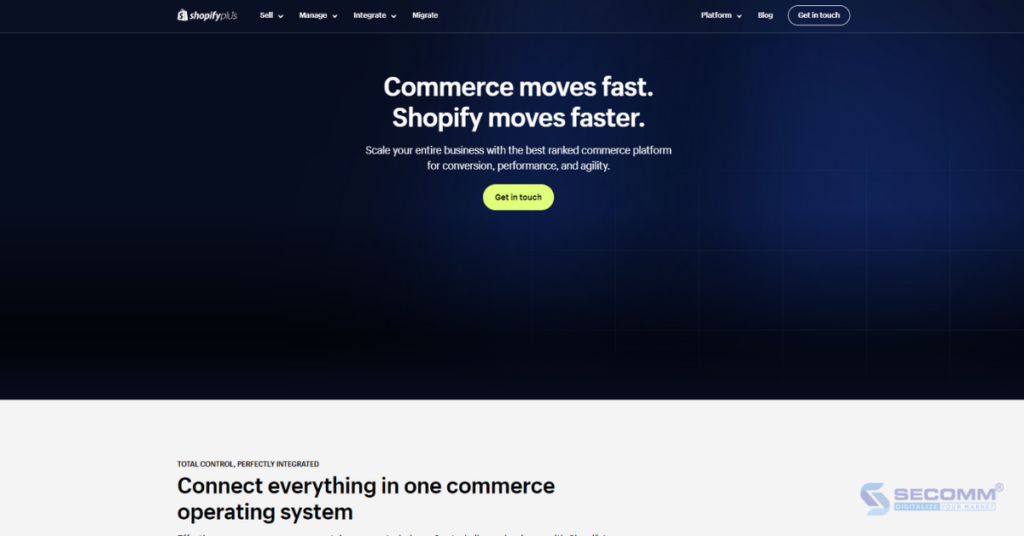
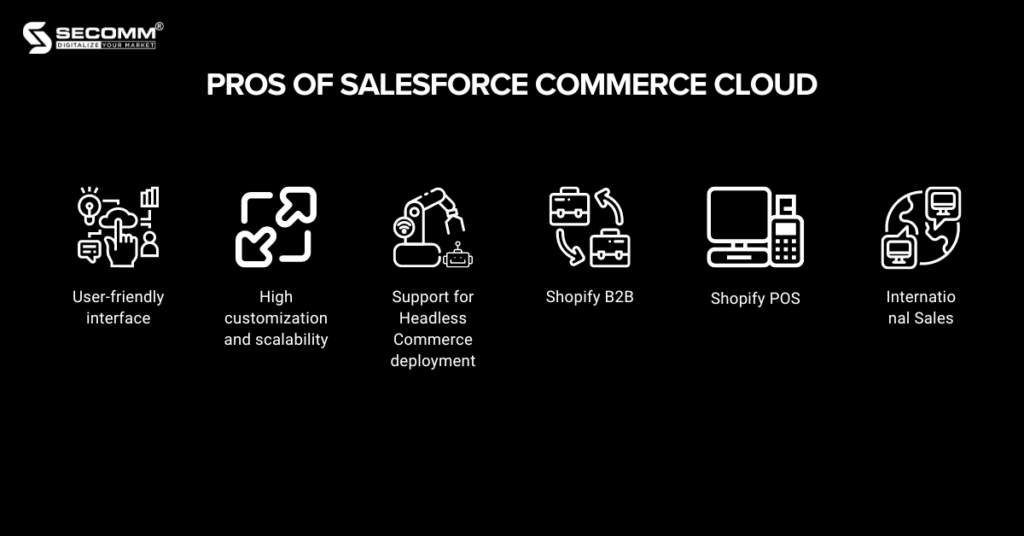
Salesforce Commerce Cloud (formerly known as Demandware) is a robust cloud-based eCommerce platform built on Salesforce’s infrastructure, one of the world’s largest CRM software companies.
SFCC provides a comprehensive system for operating online stores, from building and deploying shopping websites to managing orders, marketing, and customer service. With robust integration capabilities and intelligent analytics tools, SFCC helps businesses create unique online shopping experiences and enhance customer interaction.
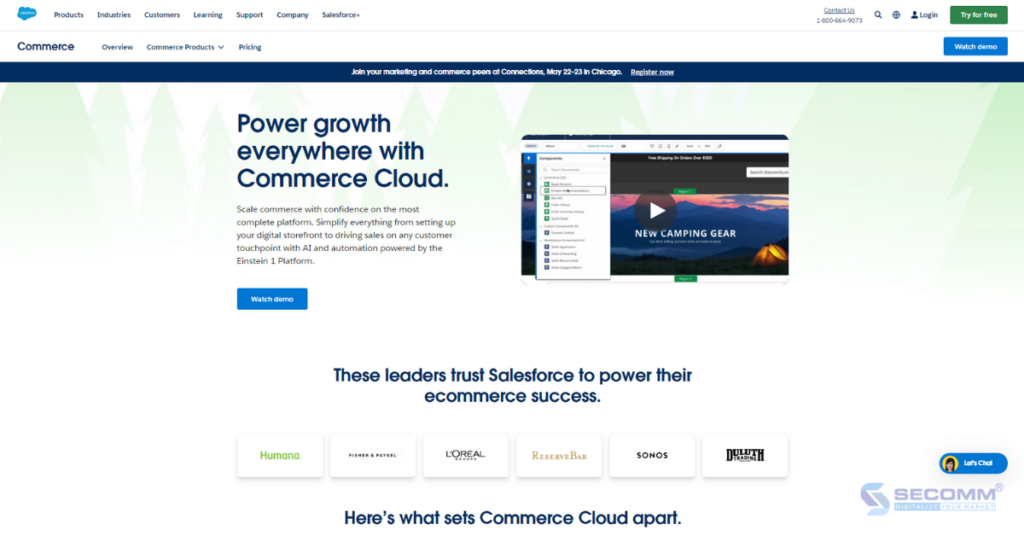
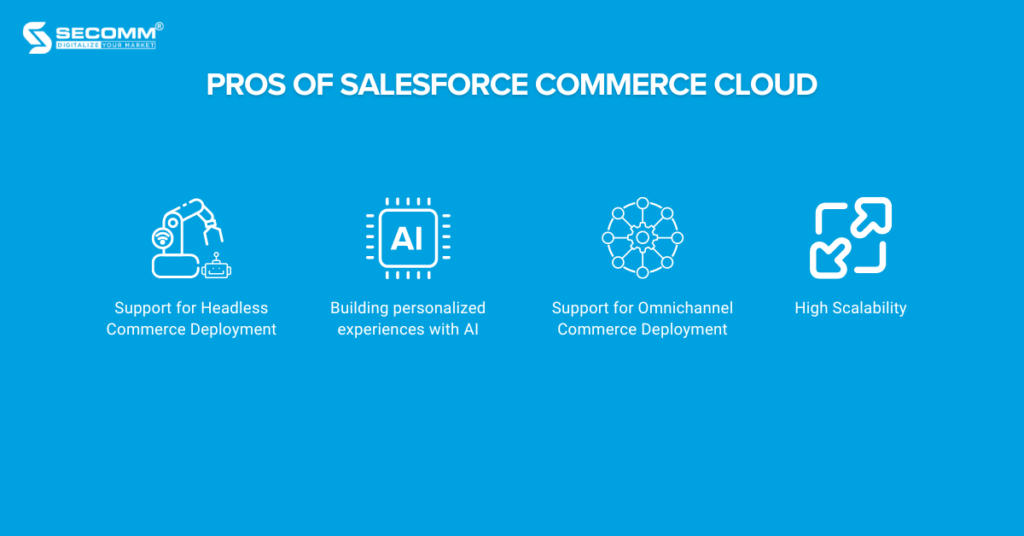
The Plus version costs from $2300/month but is not fixed and will be customized based on specific needs. For merchants reaching a revenue threshold of $800,000/month, the Plus usage fee will gradually increase based on GMV (0.25% GMV for months with revenue exceeding $800,000). Merchants often must spend an additional $1K – $5K/month to integrate third-party applications.
There are no exact figures for SFCC, as the cost is determined based on each merchant’s requirements. However, SFCC merchants with revenues around $20 million may have to pay about $200,000 – $600,000/year. Larger-scale enterprises with higher revenues may have platform fees totalling millions annually.
+ Customizes unique storefront with Hydrogen.
+ Seamless third-party integrations
+ Ultilize cutting-edge technologies like AI, VR/AR for enhanced customer experience
+ Offers flexibility for complex customizations
+ Requires expertise in SFCC and specific technical skills
+ Easily scales without slowing down website performance.
+ Provides a clear roadmap with over 100 product updates released twice a year
+ Continuously improves to keep your business ahead in eCommerce
+ Integrates seamlessly with other Salesforce systems but struggles with third-party apps
+ Updates regularly but at a slower pace compared to Shopify
Both platforms have rich features, differing mainly in focus and approach
Plus focuses on flexibility and ease of use, providing merchants with a more intuitive interface than SFCC. This platform is renowned for its seamless integration with various payment options, marketing tools, and sales channels. This flexibility has made Plus attractive and accessible to most merchants.
Additionally, Shopify Plus offers their merchants exclusive and custom solutions to effectively handle various aspects of eCommerce, such as Shopify POS, Shopify Market, Shopify Hydrogen, Shopify Checkouts, B2B on Shopify, and more.
SFCC, on the other hand, emphasises enterprise-level features such as integrated sales management tools, advanced search, order management, and promotion creation. Additionally, this platform excels in supporting international sales, advanced customer segmentation and personalization, as well as real-time dashboards and reports.
All of these features help businesses optimize eCommerce operations and drive growth.
Shopify Plus will be the ideal choice in the following cases:
Plus is designed specifically for large retailers with high demands for scale. With a range of exclusive solutions developed and continuously updated, this flexible eCommerce platform can effectively meet growth needs, allowing for easy scalability and customization.
With lower license fees compared to SFCC and the ability for quick deployment, Shopify Plus is a suitable option for businesses with moderate budgets or those needing to implement projects in a short time frame.
Plus is known for its user-friendly interface and high flexibility. Its drag-and-drop builder ensures that users of all technical levels can easily and efficiently set up an online store.
Shopify Plus’s infrastructure provides a seamless integration system with third-party applications and tools. This is a significant advantage if you need to integrate quickly with CRM applications, marketing tools, or other online sales channels.
If customer experience is a top priority, Shopify Plus offers many tools and features to easily and effectively optimize shopping experiences and customer interactions.
SFCC is a suite of solutions your eCommerce system needs to grow rapidly. If the following criteria apply, SFCC may be the more suitable choice:
If you have already used other Salesforce products and services such as Salesforce CRM, Marketing Cloud, or Service Cloud, choosing SFCC will optimize workflows and integrate customer data across your entire system.
SFCC is often the top choice for large enterprises with high deployment demands requiring flexibility in managing online stores. The platform provides powerful tools and features for customizing interfaces, managing complex product catalogs, and integrating with distinct business processes.
Built on the infrastructure of Salesforce, one of the world’s largest cloud technology service providers, SFCC offers high levels of security and reliability, best for those with important customer data and information.
SFCC provides tools to help you better understand customer shopping behavior and optimize business strategies. This enhances the shopping experience and increases sales revenue.
In today’s highly competitive eCommerce landscape, selecting the appropriate platform is crucial for your business success. This article has provided an overview of the top two choices, Shopify Plus and SFCC.
When it comes to making a decision, careful consideration of the specific needs is essential, from scale and goals to budget and technical requirements, to make the most appropriate choice.
Need help making the right decision? Contact SECOMM or call (028) 7108 9908 immediately!
 4
4
 3,295
3,295
 0
0
 2
2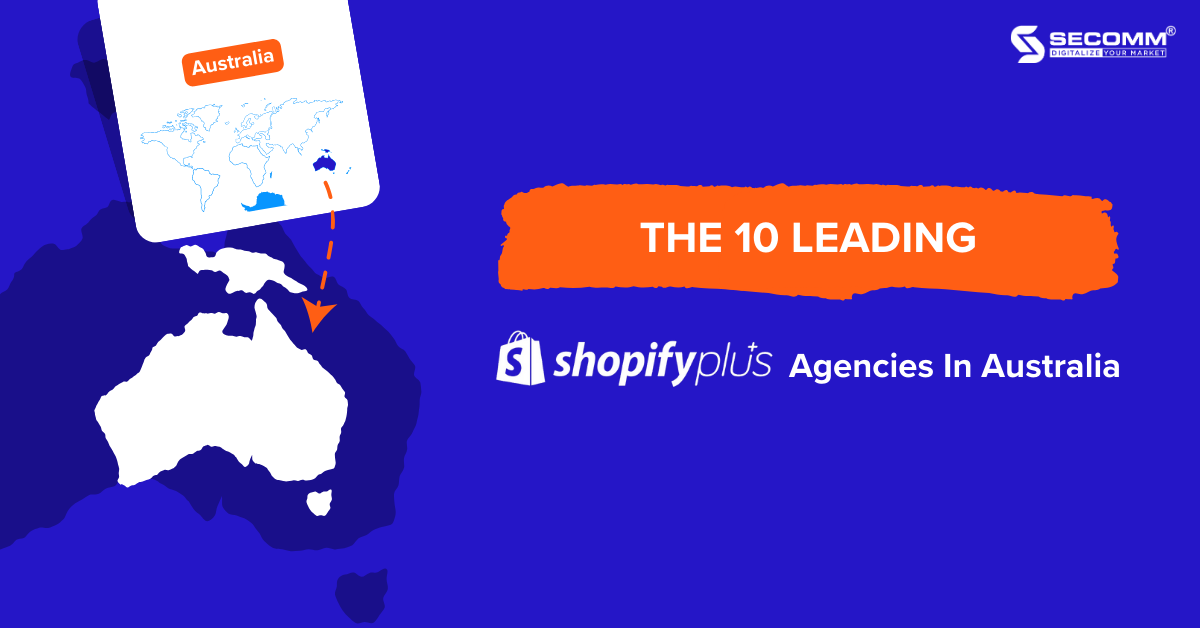
The Shopify Plus agencies in Australia are more than just experts in this eCommerce platform; they’re also dependable allies in your online business growth. The Australian eCommerce market has experienced significant expansion in recent years, so choosing the right Shopify Plus development partner is a pivotal strategic move.
In this article, we’ll outline Australia’s top 10 premier Shopify Plus developers and the criteria for selecting the ideal partner for your eCommerce development project.
Read more: Top 10 Shopify Plus eCommerce websites in Australia
Shopify Plus is an advanced eCommerce platform tailored for large enterprises that aim to expand their business operations and elevate their customers’ online shopping experience. It offers a robust infrastructure for building custom eCommerce websites and flexible scalability for seamless integration with third-party applications.
Moreover, the platform continuously evolves and enhances its exclusive solutions, empowering businesses to operate more efficiently and deliver an exceptional customer experience.
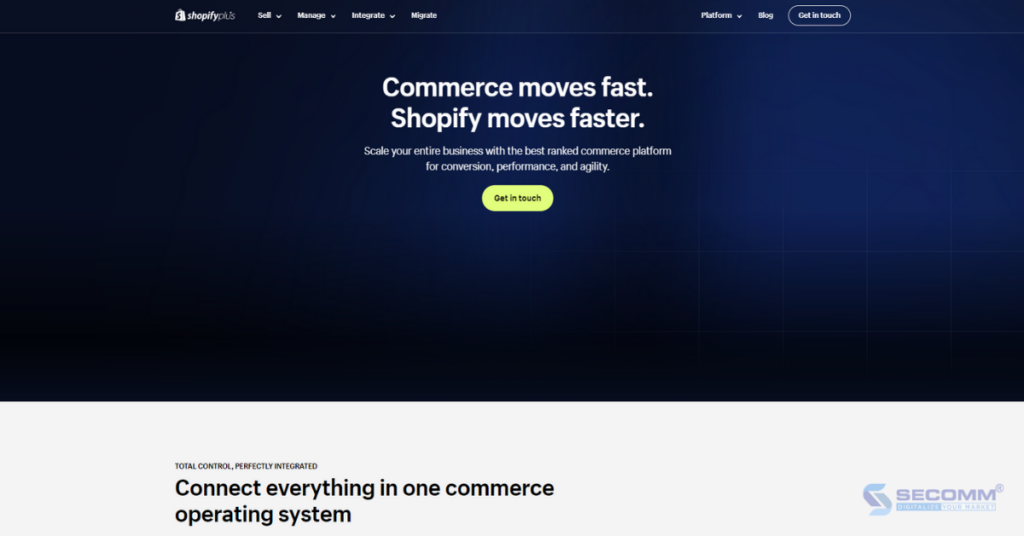
Read more: 15 reasons to migrate to Shopify Plus
This is an important question that many businesses often ask when starting their eCommerce projects. Below are some reasons why collaborating with a Shopify Plus development company:
Shopify Plus developers typically have teams of experts highly skilled in this platform. Most companies will participate in the Shopify Plus Partners program, receiving technical support, educational resources, commissions, and branding.
Moreover, these developers must demonstrate that they meet the standards to become official Shopify Plus partners. Therefore, collaborating with them will help businesses launch their eCommerce websites quickly while utilizing features and integrations to optimize business performance.
Partnering with Shopify Plus agencies can save time and costs compared to independently building and managing an eCommerce website.
Collaboration becomes even more valuable when tight deadlines and rapid online store deployment are required. These developers already have the tools, processes, and experience to efficiently and swiftly deploy projects.
It is crucial to ensure smooth and stable website operation after launch. Shopify Plus developers often provide continuous support services after the project is completed.
This involves the ongoing maintenance and management of the website, along with technical assistance, to ensure seamless operation and constant alignment with Shopify Plus’s latest features.
Read more: Shopify Plus and Advanced: Which one is right for you?
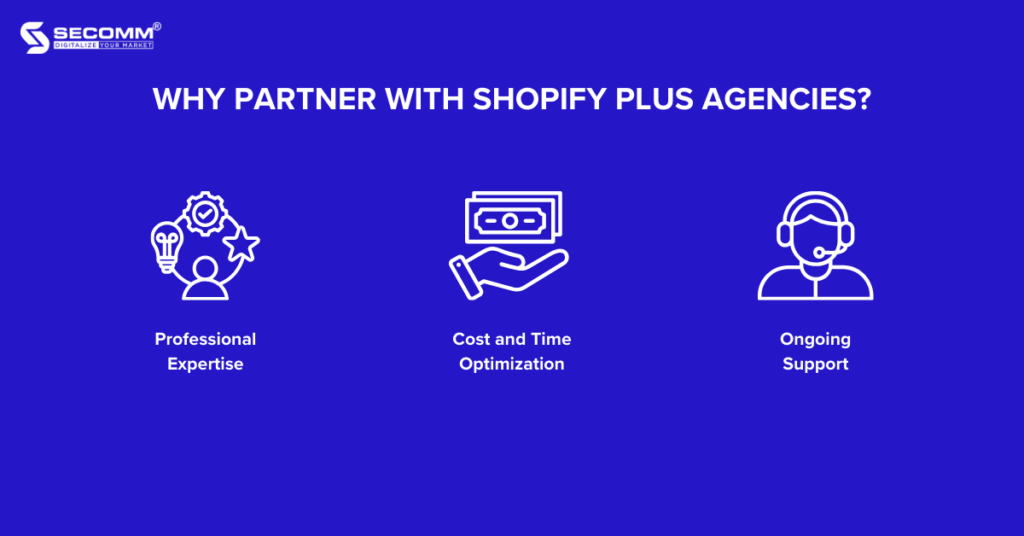
Partnering with any development company in Australia can greatly influence the success or failure of a Shopify Plus implementation project. Here are four key criteria to consider when seeking a suitable developer:
A thorough understanding and experience with this platform are essential when developing an eCommerce project with Shopify Plus. Therefore, this is the primary point to evaluate any potential development agency.
You must ensure that the chosen developer has the knowledge and skills to implement the Shopify Plus platform. They need a team of capable experts to build, customize, and optimize eCommerce websites based on specific.
Designing and building a website with a customized shopping experience tailored to the needs of Australian consumers isn’t an easy task. This requires technical skills and expertise in the Shopify Plus platform and a deep understanding of how the Australian eCommerce market operates.
Therefore, developers need to understand the target audience, their shopping behaviours, legal regulations, and other factors related to the distinctive business culture in this country.
Evaluating feedback from previous clients can be valuable in the decision-making process. You can check reviews from various sources and clients to ensure objectivity and transparency. The Shopify Plus developer must have the necessary skills and experience to complete the eCommerce project as required.
When your Shopify Plus website is done and launched, you must pay attention to technical support and maintenance. That’s why should opt for a development agency dedicated to providing prompt support and ongoing maintenance after completing the project.
This ensures the website’s stability, swift resolution of technical glitches, and consistent security updates to keep the site current with the latest platform versions.
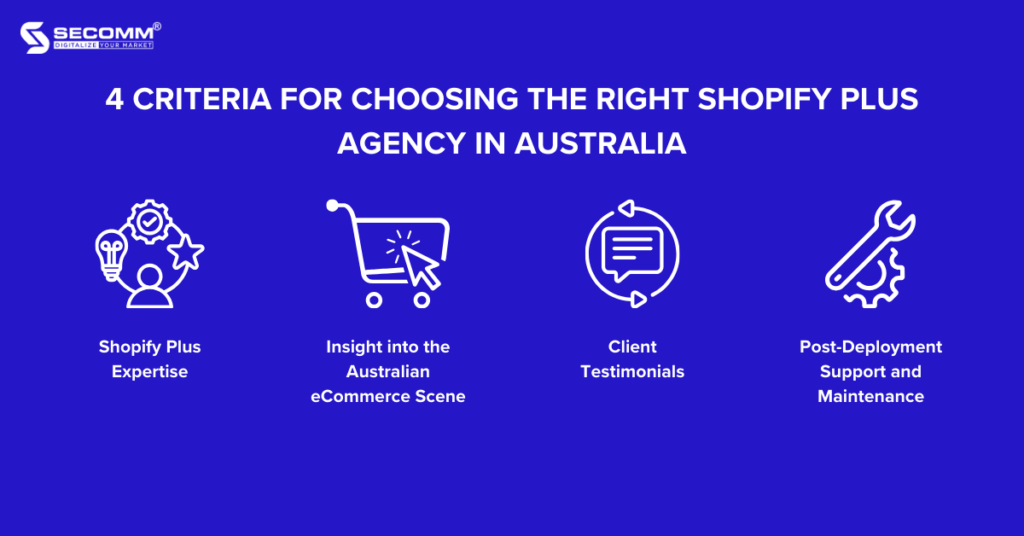
The continuous growth of the Australian eCommerce market has led to an increasing demand for collaboration with top-notch developers, especially those specializing in the Shopify Plus platform. Below are the top 10 Shopify Plus development companies in Australia:
With over 10 years of experience in the eCommerce industry, SECOMM is one of the trustworthy Shopify Plus developers in Australia. SECOMM can design and build Shopify Plus eCommerce websites, implement Headless Shopify Hydrogen, migrate platforms to Shopify Plus, and provide related services.
Moreover, the company offers various custom solutions based on different technology platforms such as Magento, WordPress, WooCommerce, and commercetools. With a team of talented and professional experts, SECOMM ensures the success of eCommerce projects collaborating with Australian clients. Notable among these are Laybyland, Trentham Estate, The Rod Shop, and Seconds Deals.
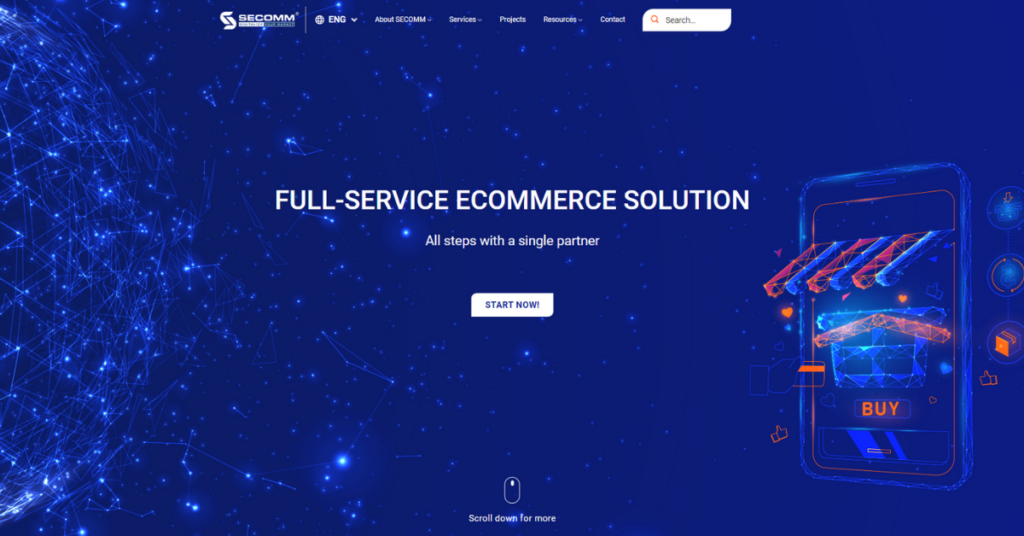
Dive Digital provides eCommerce consulting services, UI/UX design, and Shopify website development. Its solutions optimise customers’ online shopping experiences and enhance business performance.
10SQ aims to become the leading Shopify Plus development company in Australia, making it easy for businesses to access specialized services for this platform. Here, businesses can find customized solutions to expand and enhance their eCommerce systems efficiently.
Aron gathers highly skilled eCommerce developers proficient in various platforms and technologies, including Shopify Plus. The company has expanded its operations to many countries beyond Australia, such as the United States, the United Kingdom, and India.
Clean Commit is a reliable partner with high expertise in developing and optimizing websites on the Shopify Plus platform. They are committed to providing effective and sustainable solutions for businesses.
Magneto IT Solutions is a Shopify Plus developer with diverse industry experience. They offer customized and professional solutions to meet the specific requirements of businesses.
In Australia, Acidgreen is renowned as a leading developer of eCommerce websites, excelling in Magento and Shopify Plus. The team’s experience and expertise in open-source and SaaS platforms are sufficient to maintain the company’s position in the market
This company develops solutions for businesses in Australia and New Zealand looking to implement eCommerce with Shopify Plus. Additionally, they provide continuous support even after the project is completed.
Pipelabs’ solutions aim to deploy Omnichannel eCommerce on the Shopify Plus platform. Numerous projects’ success and positive reviews from previous clients attest to Pipelabs’ capabilities.
Moustache Republic is among the clients looking to implement Shopify Plus and BigCommerce. They provide solutions for eCommerce deployment based on these two platforms and offer seamless and efficient platform migration solutions.
The partners mentioned above are just a few of Australia’s skilled and trustworthy Shopify Plus developers. Choosing the most suitable partner to ensure your eCommerce objectives’ success and sustainable growth depends on your project’s specific requirements.
Start with Shopify Plus today with specialised solutions from SECOMM. Contact us or call (+84)28 7108 9908 for a free consultation!
 2
2
 2,969
2,969
 0
0
 1
1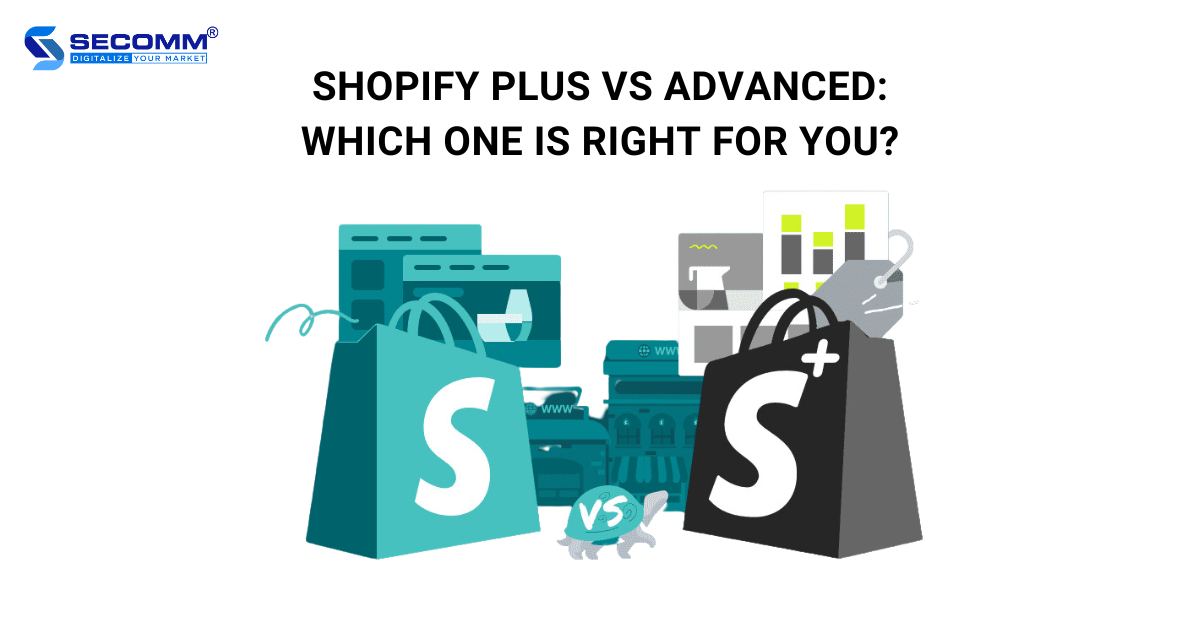
Shopify Plus vs Advanced are the two most essential versions of Shopify. They provide your business with many solutions and features to build and optimise eCommerce websites quickly.
Each version has advantages, from Advanced’s advanced features and cost-effectiveness to Plus’s flexible customization. Therefore, the question ‘Which is the right choice?’ becomes challenging for many eCommerce businesses.
In this article, let’s find a reasonable answer so each business can make the most appropriate decision.
Read more: What is Shopify? Pros and Cons of Shopify
Shopify Advanced is a pricing plan offered by Shopify, designed to support medium-sized businesses in developing their eCommerce operations. The Advanced includes all the features of the Basic and Shopify plans while also providing optimized transaction fees and additional advanced features.
These features include custom reporting and analytics, enhanced live chat, optimized checkout, 3rd-party calculated shipping rates, and more.
Scaling businesses will need many advanced features to optimize their eCommerce operations. Therefore, the Advanced plan offers many outstanding advantages that enhance the ability to manage and grow your business flexibly and efficiently.
This version excels in terms of reporting and analytics compared to standard plans. This feature lets you track and evaluate your business performance based on specific criteria, facilitating informed decisions.
The Advanced ensures lower transaction fees than the two standard plans, helping you save costs and enhance profitability. These lower transaction fees optimize profit opportunities and make the transaction process more appealing and sustainable.
The Advanced also emphasizes its ability to support international sales through Shopify Markets, a tightly integrated platform. This helps you expand your business scope into the global market efficiently and flexibly, leveraging growth potential from diversifying sales revenue.
The Advanced plan allows you to integrate and manage shipping fees by third-party carriers, providing customers with more options. This integration capability helps optimize the shipping process and reduces any complexity associated with shipping costs, thereby creating the best online shopping experience for customers.
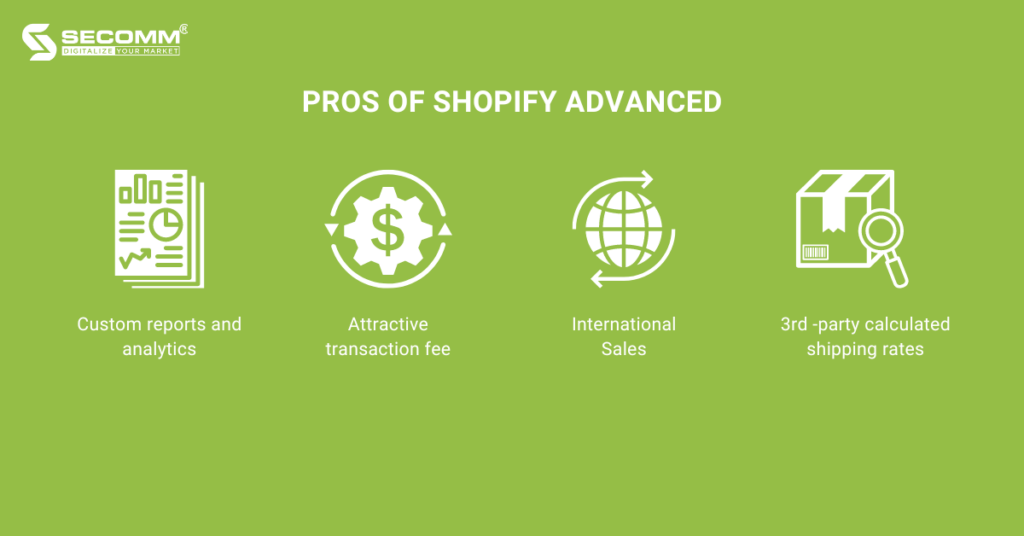
This premium version is tailored for large-scale, multinational, and fast-growing businesses. The Plus offers advanced features, superior customization, and scalability. Unlike the regular version, Plus does not have a fixed price; instead, costs are customized based on the business’s specific needs.
Businesses with high sales revenue, large product catalogues, and complex customization needs would be suitable targets for Shopify Plus.
The Plus version brings superior capabilities to help businesses create an optimized eCommerce experience for customers and achieve the expected revenue.
Shopify Plus offers high customization and flexibility in developing eCommerce websites. You can customize many aspects of the website, integrate applications, and expand functionality. This helps create an optimal online shopping experience and enhances customer interaction.
The B2B solution set with exclusive features is only available to Shopify Plus merchants. These features are regularly enhanced to optimize the B2B process, from ordering to customer management, providing a unique and efficient experience.
With its flexibility, Shopify Plus can fully support the implementation needs of Headless Commerce. Furthermore, through the exclusive solution Hydrogen, Shopify allows businesses to build custom Headless eCommerce websites to provide the most unique customer experience.
With Shopify POS Pro integrated, Shopify Plus supports omnichannel commerce deployment, helping you create a seamless shopping experience across multiple channels, from eCommerce websites to brick-and-mortar stores.
Through the Winter ’24 Editions update, Shopify recently added two new features: POS Terminal and Ship From Store. These features optimize customers’ payment processes and simplify merchant experiences
The Plus version supports large-scale expansion and international outreach. The integrated Shopify Market Pro solution allows you to efficiently optimize your eCommerce operations and seize opportunities in the global market.
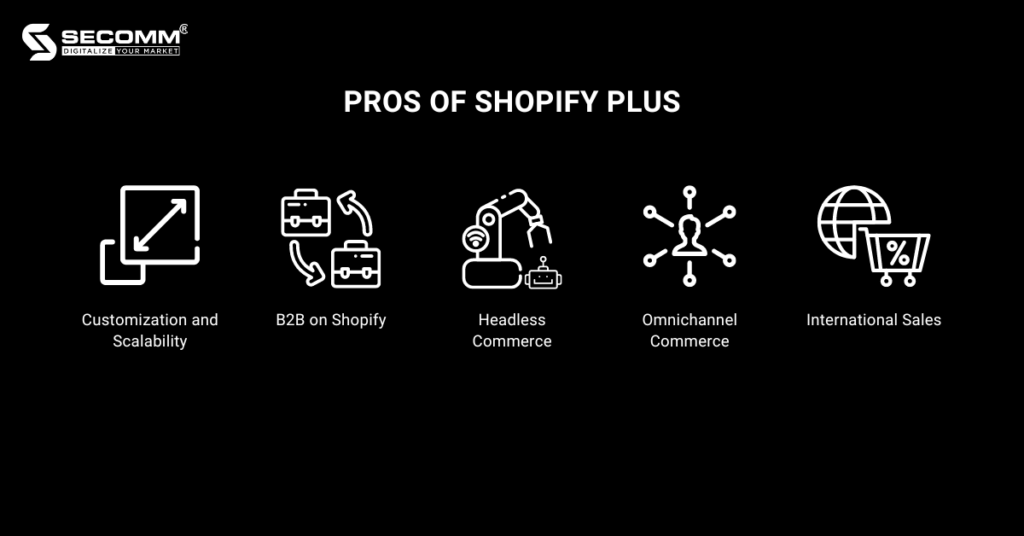
The platform usage fee for the Advanced service package is $299 per month. This pricing is reasonable for medium-scale businesses seeking advanced features to develop their eCommerce websites. Additionally, the transaction fee for the Advanced package is 0.6% per transaction, lower than the Basic and Shopify packages.
The usage fee for the Plus package typically starts at $2,300 per month and is not fixed but customized based on deployment needs. At this price point, you’ll gain access to numerous advanced features and exclusive solutions that are regularly fine-tuned and improved to meet the increasing demands of eCommerce development.
Online transaction fees will vary by geographic region. Businesses using Shopify Payments will have this fee waived.
With the Advanced plan, you can seek 24/7 support from the Shopify team through in-depth live chat. Additionally, many Shopify merchants’ community groups are on Facebook and Slack.
Shopify Plus merchants can expect deep customer care services 24/7 through email, hotline, and live chat. They will receive technical support and valuable business advice from Shopify’s top experts. Additionally, businesses can join the Plus merchant community on Facebook to share and learn from each other’s experiences.
Advanced offers robust security features, including protection for personal information and payment data. However, its security level is lower than that of the Plus plan.
Plus provides a range of security measures and features to protect business data, customer information, and payment transactions as much as possible. This includes:
This is an important question that many businesses are seeking answers to. If your business is on a growth trajectory and has high demands for flexibility and customization, Shopify Advanced is a worthy consideration.
First and foremost, if you desire more autonomy over the store interface and user experience, Shopify Advanced provides customizable reporting and analytics tools, enabling you to track business performance in the way you want to make informed decisions.
Furthermore, Shopify Advanced could be an ideal companion if you’re looking for a cost-effective solution and don’t want to be constrained by fundamental limitations. With lower usage fees than higher-tier packages, Advanced offers financial benefits while keeping the eCommerce website running smoothly.
Plus will be the perfect choice for large-scale businesses with high flexibility, performance, and support demands. If the following characteristics apply, Plus is very likely to be the more suitable choice:
The decision between Shopify Plus and Advanced is not just about choosing a platform but also about building an eCommerce system that reflects your business’s true values and long-term goals.
Shopify Advanced is a flexible solution for medium to large businesses seeking flexibility and low costs. On the other hand, Shopify Plus is an excellent choice for larger enterprises, where premium features and support are key to strong and efficient growth.
With the development and fluctuations of the market, the choice between Shopify Plus and Shopify Advanced is not only a current decision but also a long-term strategy to shape the future of your business.
Need help to make decisions? Contact SECOMM or call (028) 7108 9908 now!
 13
13
 2,057
2,057
 0
0
 1
1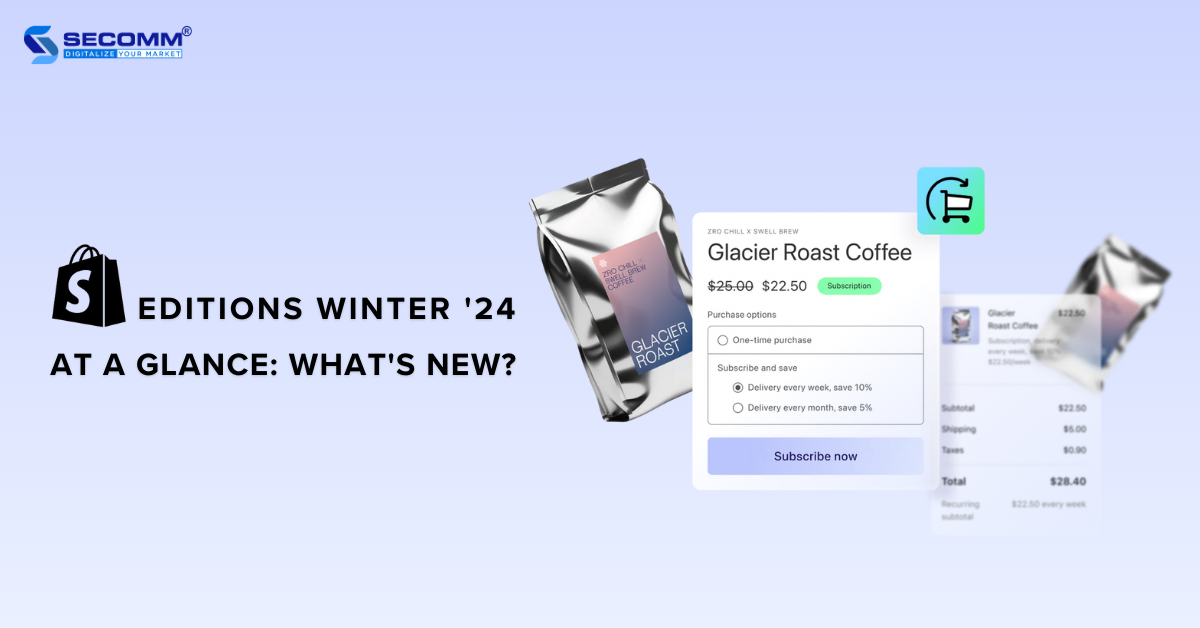
Shopify Editions Winter ’24 is the latest update with a host of new features and notable improvements. Especially, the SaaS platform has dedicated research efforts to bring about some groundbreaking updates that could be highly beneficial for large-scale eCommerce enterprises.
Let’s go through the 5 most important updates that large brands should pay attention to.
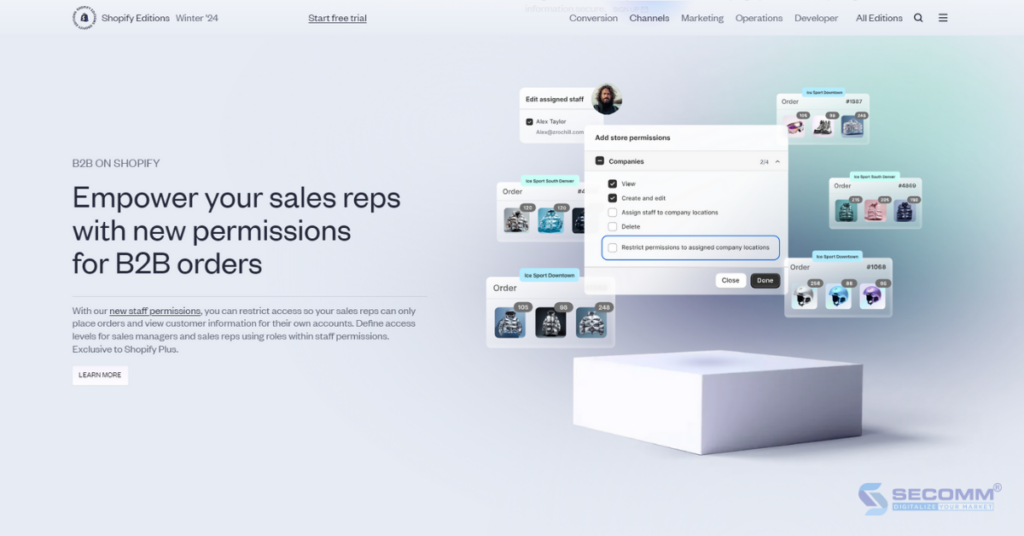
Best for: All the ‘Plus’ plan B2B merchants
Bobby Morrison, Shopify’s Chief Revenue Officer, confidently states that B2B is the next big opportunity for businesses of all sizes in 2024 and beyond.
Since the launch of the B2B solution, the platform has consistently rolled out updates to enhance this solution. In this particular update, Shopify focuses on upgrading the flexible infrastructure to help businesses optimize operations and deliver a unique customer experience.
Best for: All retail merchants, including merchants not on Shopify
In Editions Winter ’24, the POS solution has been fine-tuned and improved, addressing some minor issues and simplifying the experience for sellers. Among these enhancements, two new top-notch features are POS Terminal and POS Ship From Store.
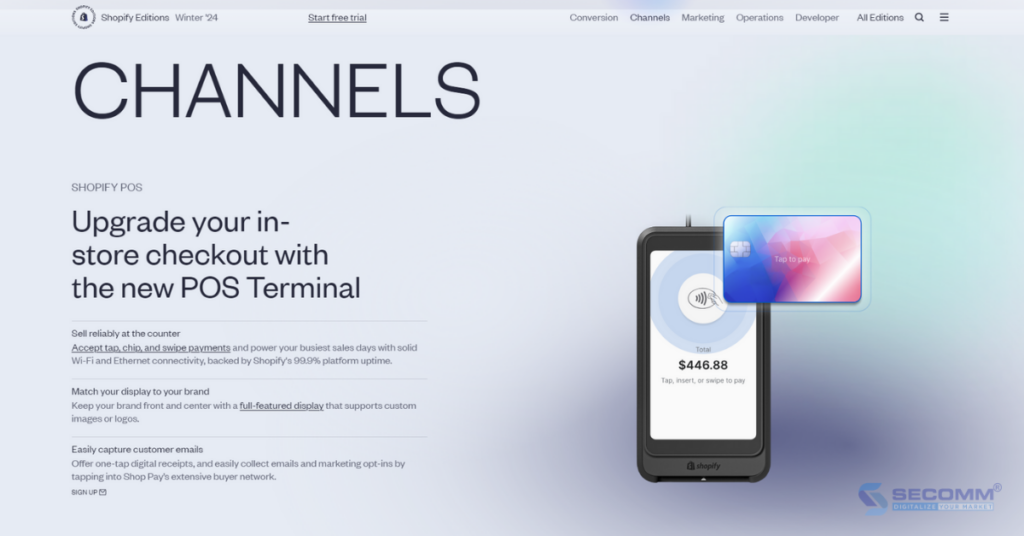
Shopify POS
Accept tap, chip, and swipe payments and power your busiest sales days with solid Wi-Fi and Ethernet connectivity, backed by the 99.9% platform uptime.
Assigned staff members can easily process orders directly in POS at multiple retail locations. They can view, pick up, pack, and fulfil orders through the new feature, POS Ship From Store.
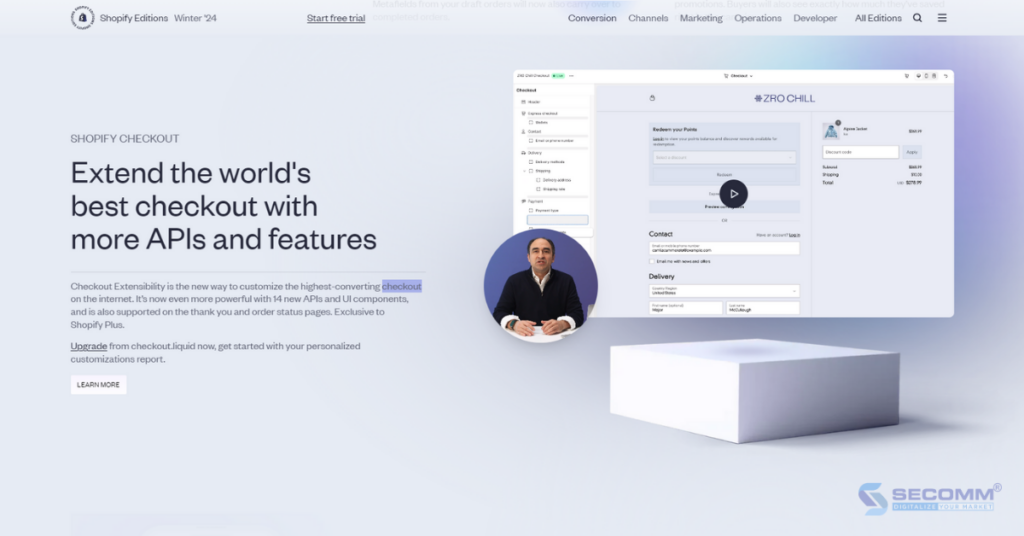
Checkout ExtensibilityBest for: all Shopify merchants
The checkout page also significantly shapes the customer experience. Therefore, in this Shopify Editions Winter ’24 update, numerous changes and improvements will be introduced to help businesses optimize the payment process and enhance conversion rates.
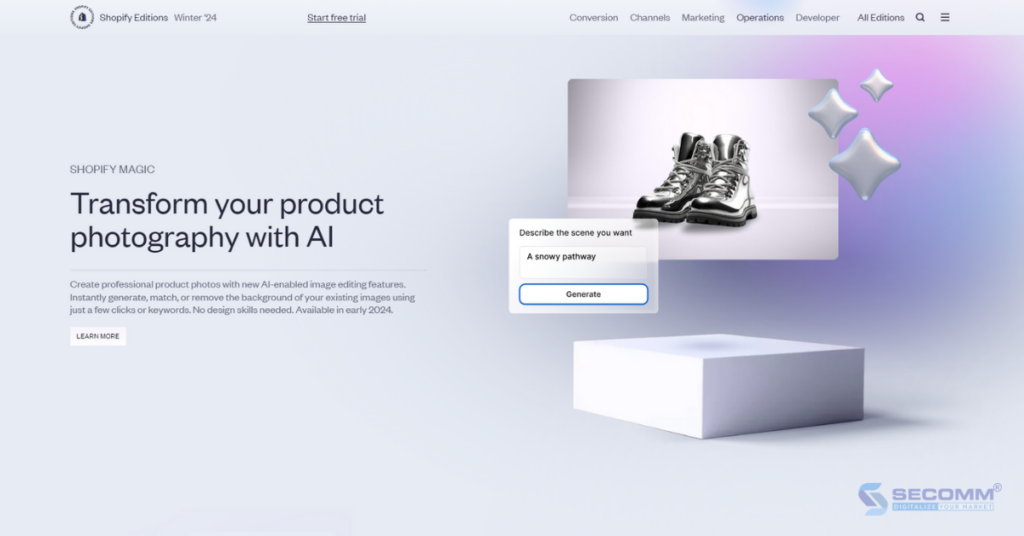
AIBest for: All Shopify merchants
AI technology is currently significantly boosting the performance and operational efficiency of individuals and businesses in the eCommerce sector. The Shopify Magic solution integrates free AI-supported features across the entire platform.
Best for: All Shopify merchants with a high number of product variants, especially enterprises and B2B brands.
Shopify has released new product APIs that allow increasing the limit to 2000 variants per product. Compared to the previous Shopify Editions Summer ’23, the product variant limit was only up to 100. This change in the product variant limit is a groundbreaking improvement, making it an ideal choice for businesses intending to switch from platforms like Magento or Salesforce Commerce Cloud.
Similarly, this enhancement also brings many benefits for B2B merchants.
The features and improvements in the Editions Winter ’24 demonstrate that Shopify has invested significantly in research to create solutions tailored to the needs of large businesses. These are just a few of the many enticing updates from Shopify in this release.
To delve deeper into Editions Winter ’24 and discuss your eCommerce website deployment plans on the Shopify platform, contact SECOMM or call the hotline at (+84)28 7108 9908 today for detailed advice!
 5
5
 2,945
2,945
 0
0
 1
1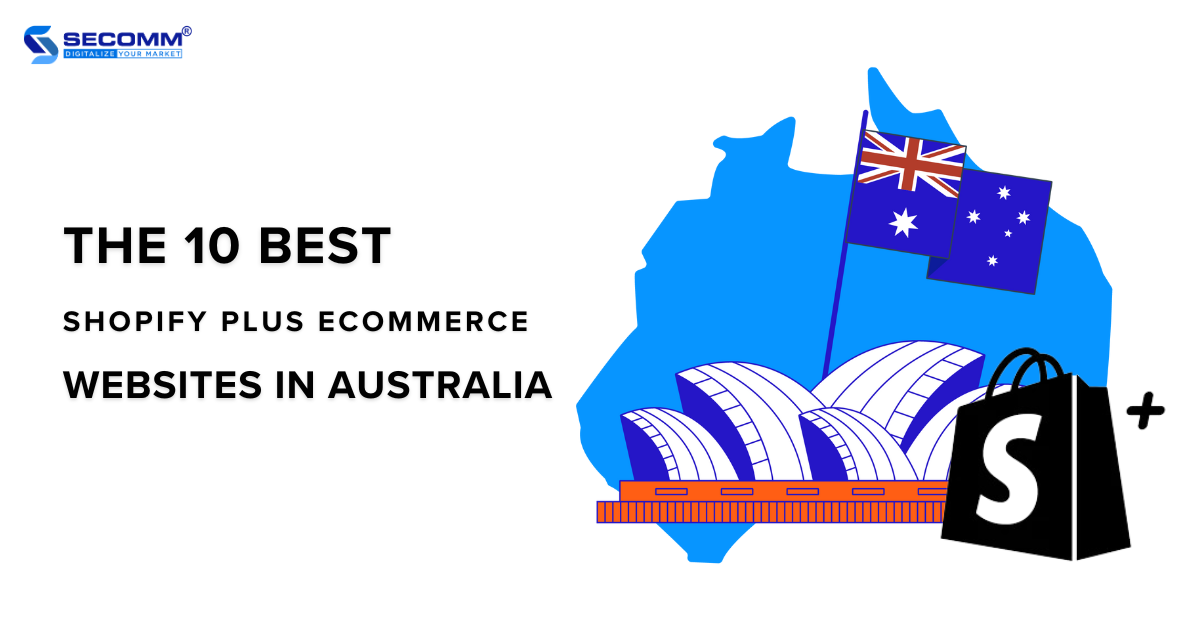
Shopify is a well-known SaaS platform among global e-commerce businesses, including those in Australia, where approximately 150 thousand live stores. Notably, Shopify Plus is regarded as the high-end version specially crafted for large enterprises to construct and enhance custom eCommerce websites.
In the following article, we will examine the top 10 leading Shopify Plus eCommerce websites in Australia.
JB Hi-Fi is a popular Australian consumer electronics retail brand that has gained worldwide recognition since its launch in 2004. In addition to its physical stores in Australia and New Zealand, the brand has made significant investments in its online sales, particularly in eCommerce websites.
The JB Hi-Fi website is built on the Shopify Plus platform, taking full advantage of its flexible customization capabilities to establish a distinctive and secure online shopping experience for its customers.
The design is carefully created, featuring yellow and black as the primary colour scheme. The interface is user-friendly, ensuring ease of use and navigation. These design elements contribute to a more convenient search and purchase process for customers.
Furthermore, the brand has incorporated the Buy Now Pay Later payment option alongside traditional methods, creating conditions for customers to swiftly make purchase decisions for their preferred products.
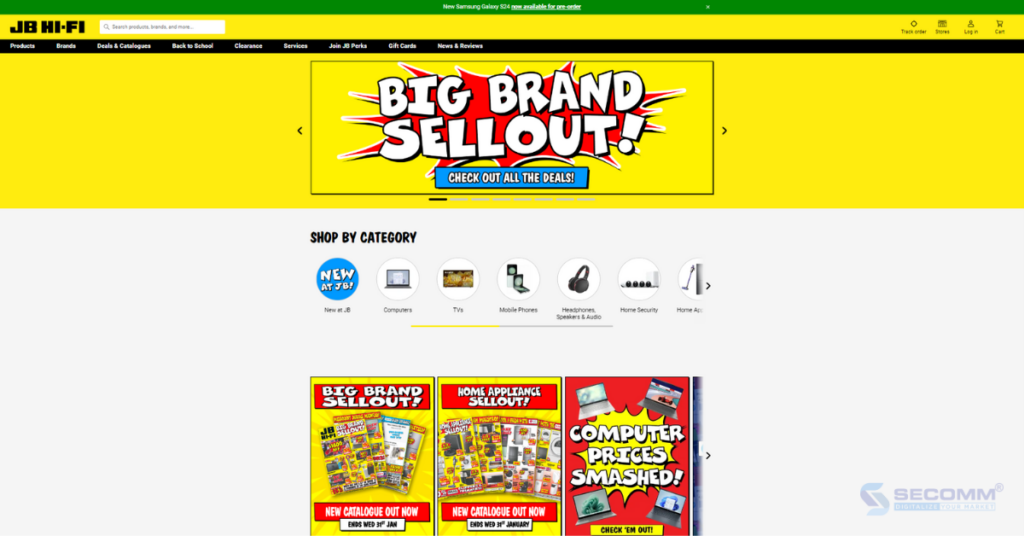
The Koala brand has gained significant popularity in the Australian and New Zealand regions, known for its high-quality furniture and home decor featuring modern and creative designs. Moreover, Koala’s mattress has consistently claimed the top spot as the most beloved mattress product on the Product Review ranking for both 2023 and 2024.
To enhance customers’ online shopping experience, Koala has built its eCommerce website using Shopify Plus. By leveraging exclusive solutions developed for Shopify Plus merchants, Koala has optimized product displays and the payment process, automated shopping events, and promotional programs, among other features.
The Koala website is designed to emphasize the sophistication and modernity of its products. With an intuitive interface, customers can easily explore and select products. Moreover, industry-specific features such as AR/VR and 360-degree viewing are integrated into the website.
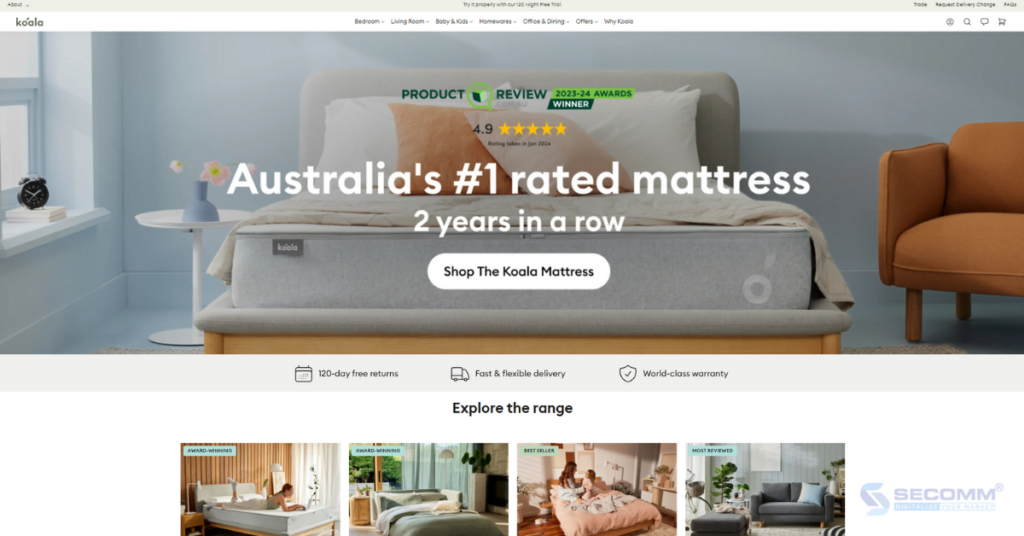
Boody, the renowned Australian fashion brand, specializes in manufacturing and providing products made from natural and organic materials. Over the years, with a commitment to emphasizing quality and customer service, Boody has established a strong presence in the Australian and New Zealand markets.
The brand’s eCommerce website serves as a primary business channel alongside traditional brick-and-mortar stores. Therefore, Boody has invested in building its website with Shopify Plus.
With outstanding flexibility and scalability, Shopify Plus allows Boody to customize features freely while also leveraging exclusive solutions such as Shopify Flow and Payments to optimize the customer experience.
The design of Boody’s eCommerce website typically reflects simplicity, friendliness, and alignment with the brand’s values. Additionally, customer reviews are integrated into the website, creating a reliable and appealing online shopping space for those seeking sustainable fashion choices.
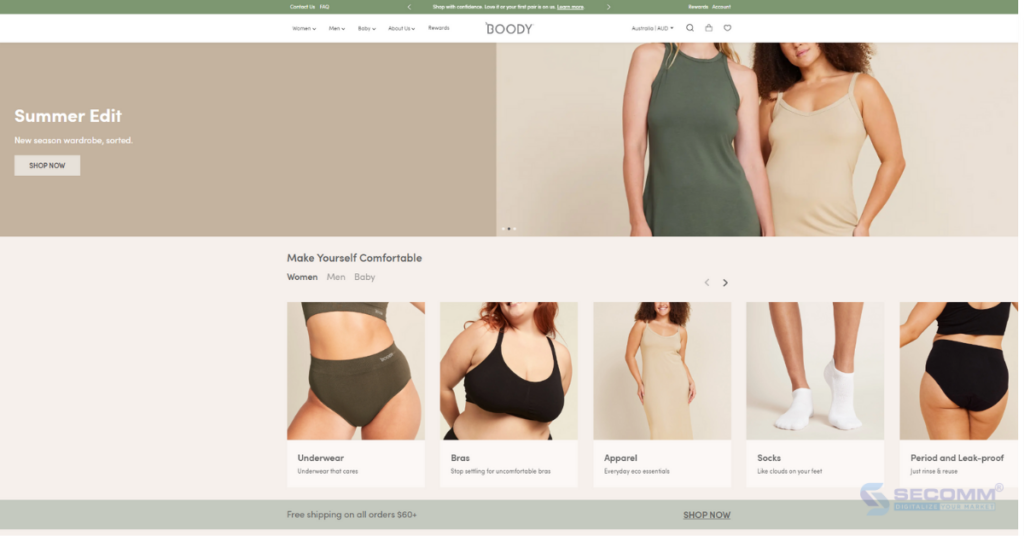
Life Interiors is a prominent name in the Australian market, specializing in the fields of interior design and decor. With a strong presence in Australia, Life Interiors has become a leading destination for those seeking stylish and contemporary furniture.
In the online realm, Life Interiors also places significant emphasis on using Shopify Plus to build and develop its eCommerce website. With a visually appealing and user-friendly interface, along with unique customizations and integrated features, Life Interiors provides customers with an optimal online shopping experience, offering quality and sustainable products.
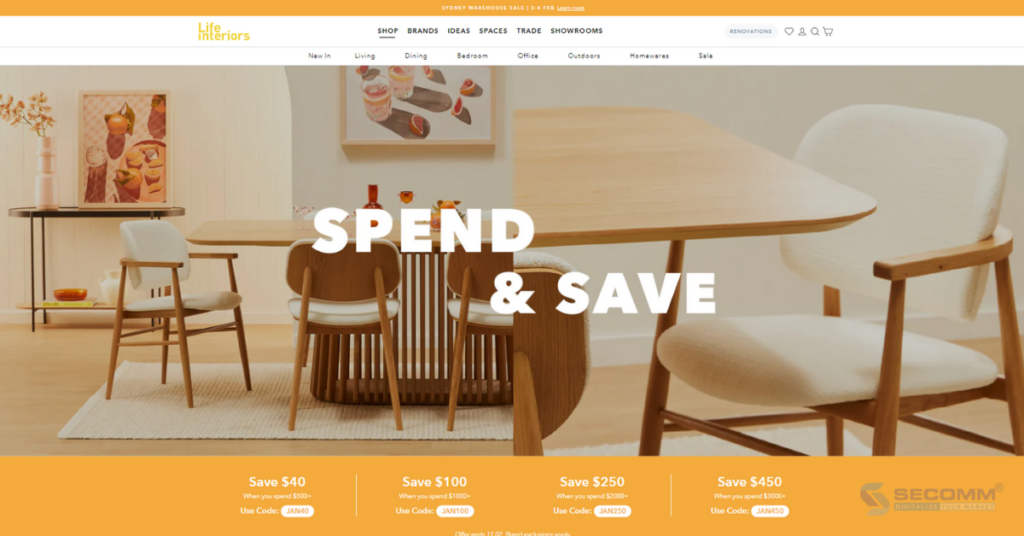
Milligram is a notable retailer in the Australian market. It specializes in office supplies, personal accessories, and unique and creative gifts. Milligram’s eCommerce website is built on the Shopify Plus platform, which provides a robust infrastructure for online business operations.
The use of Shopify Plus has helped Milligram manage online business performance flexibly and efficiently, from inventory management to order processing and customer interactions. In addition, Milligram offers a variety of payment methods and a customer loyalty program with enticing gifts to attract and retain customers.
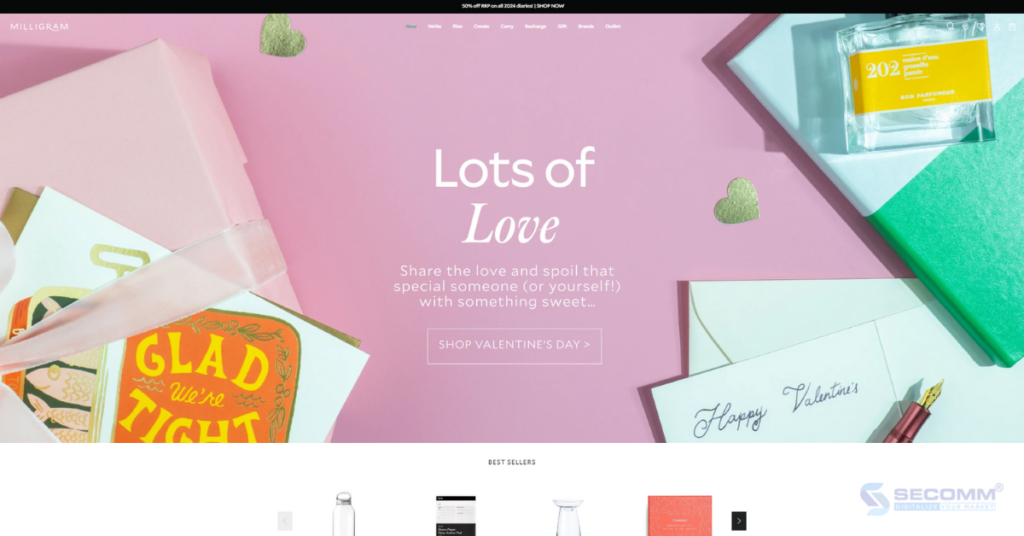
In Australia, Alternative Brewing is known as a reputable retailer of products and tools related to the art of coffee brewing and creative beverages.
With a mission to provide a personalized and high-quality brewing experience for coffee enthusiasts, Alternative Brewing has quickly gained popularity and preference within the community of high-quality beverage enthusiasts.
The eCommerce website of Alternative Brewing is a convenient shopping destination for various brewing machines and tools, as the shopping and payment experience is optimized with the infrastructure of Shopify Plus. Additionally, the brand offers customers 24/7 support services, a variety of secure online payment methods, and fast delivery options.
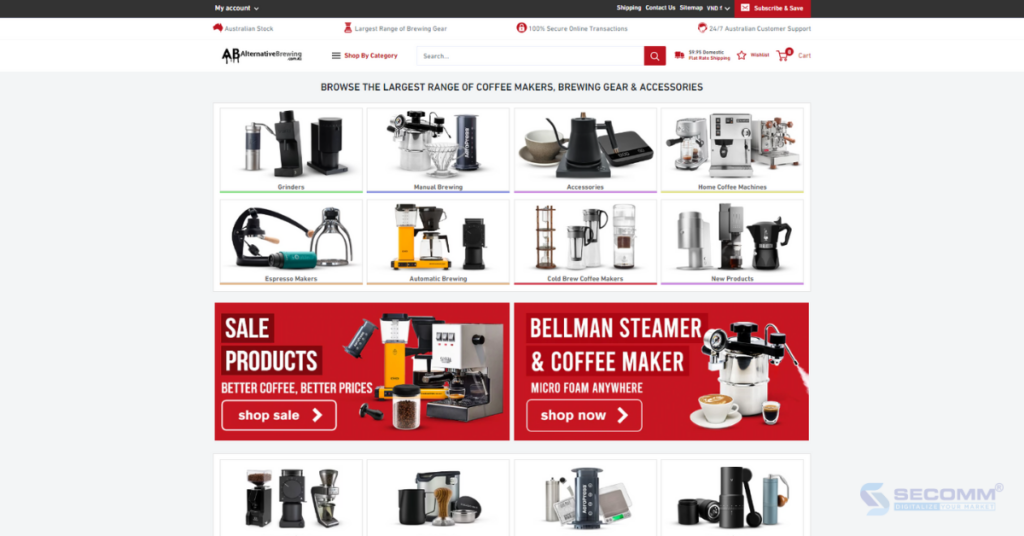
AMR Hair & Beauty is a brand specializing in products and services for hair care and beauty. The eCommerce website is built with Shopify Plus, a premium SaaS platform with numerous solutions to optimize the customer experience.
Through Shopify Plus’s infrastructure, this hair brand has developed and customized various unique features, such as displaying best-selling products, related products, and viewed products, showing store availability, and streamlining the payment process.
In addition, AMR Hair & Beauty has integrated various payment methods, including BNBL and LayBuy, into its eCommerce website.
As a result, AMR has created an online shopping space with diverse products, comprehensive information, and convenience for both professionals and consumers looking to care for their hair and appearance.
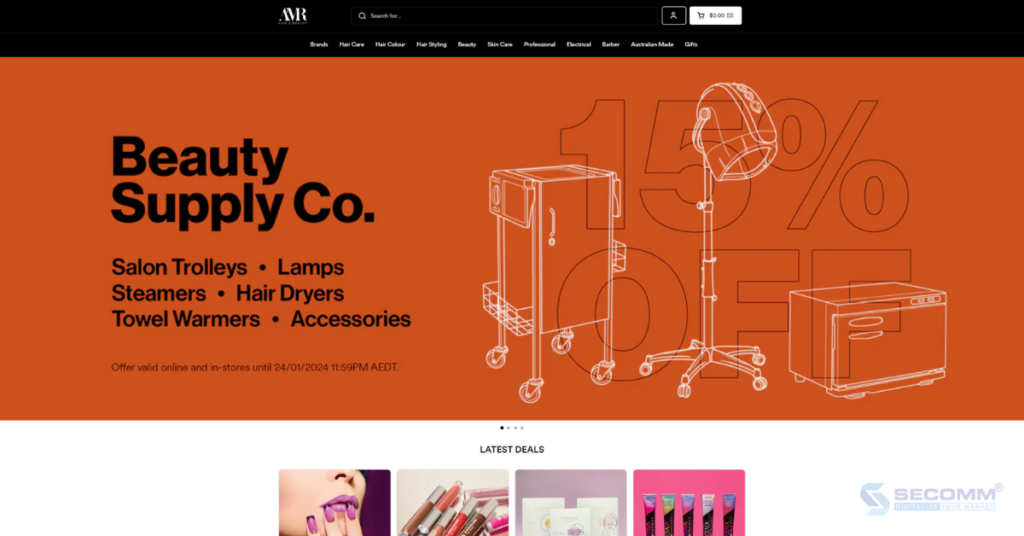
Beard & Blade is a leading brand in Australia, specializing in grooming products for beards and skin care for men. Initially, Beard & Blade’s eCommerce website was built on the Magento platform.
However, to enhance the shopping experience and facilitate easier management, they decided to switch to Shopify Plus – a powerful platform with premium features and flexibility.
Since making this transition, Beard & Blade has not only benefited from seamless system management and online interface but has also achieved notable successes. The flexibility of Shopify Plus has helped them optimize the sales process, enhance customer interaction, and notably improve overall business performance.
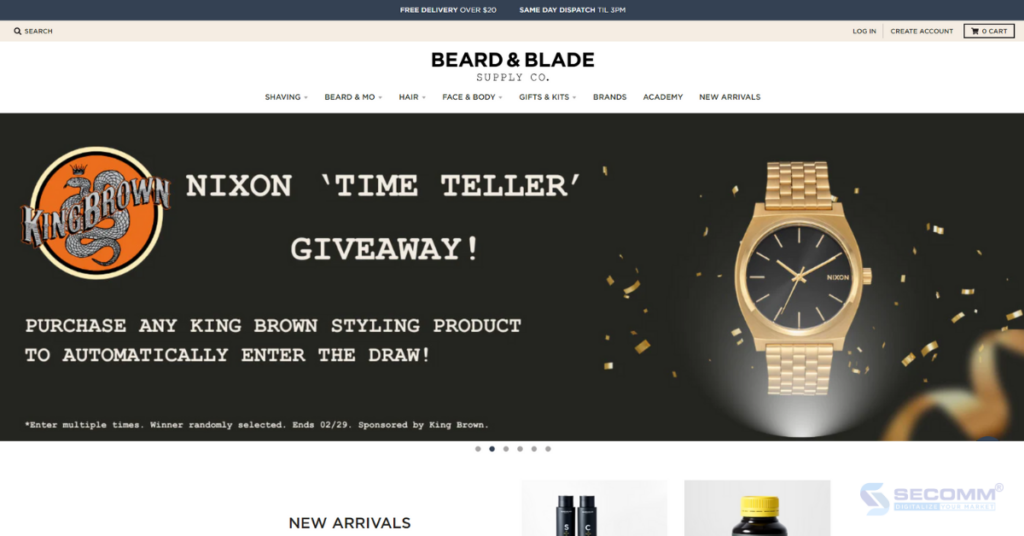
In 2020, Desky was officially launched. This brand specializes in providing furniture and accessories to decorate modern and comfortable workspaces, inspired by the increasing demand for home offices in Australia due to the impact of the COVID-19 pandemic.
As it quickly began to expand its scale, Desky aimed to have a robust and reliable eCommerce platform that could support rapid growth and handle large volumes of traffic. Therefore, Desky chose Shopify Plus to build and develop its eCommerce website.
Initially, the Desky team set a goal to launch their website, products, and brand within six months, but with Shopify Plus, the business achieved that in just three months.
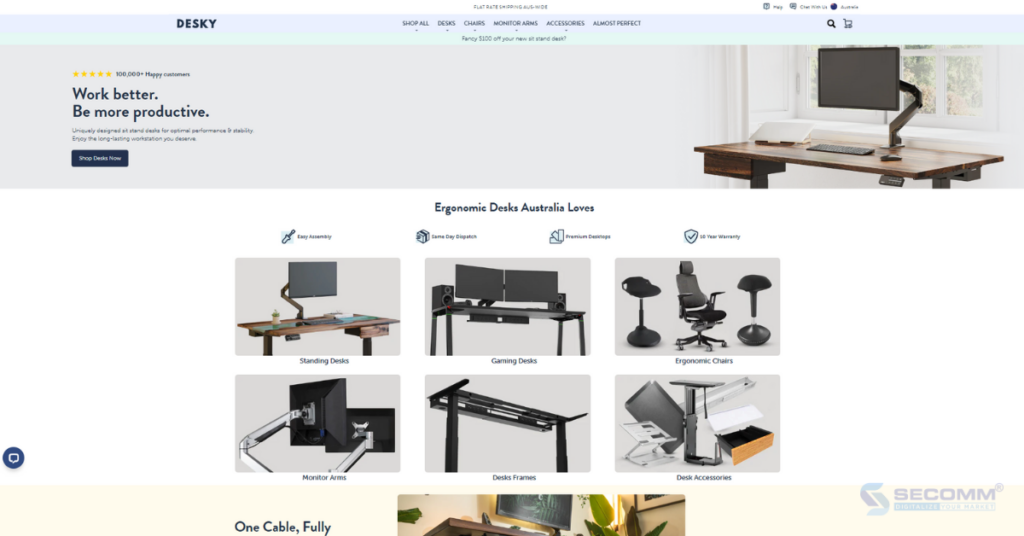
Since its establishment in 1991, DARCHE has been a leader in the Australian camping and outdoor products market. For over three decades, DARCHE has expanded its product range, providing customers with a diverse array of choices for their outdoor needs.
DARCHE’s core business model is B2B, and although OroCommerce has provided an eCommerce solution for B2B customers, it did not meet expectations due to performance issues and a subpar user experience on the website.
However, with the transition to Shopify Plus, DARCHE has built an eCommerce website that they can proudly present to all their B2B customers, thereby boosting sales during this process.
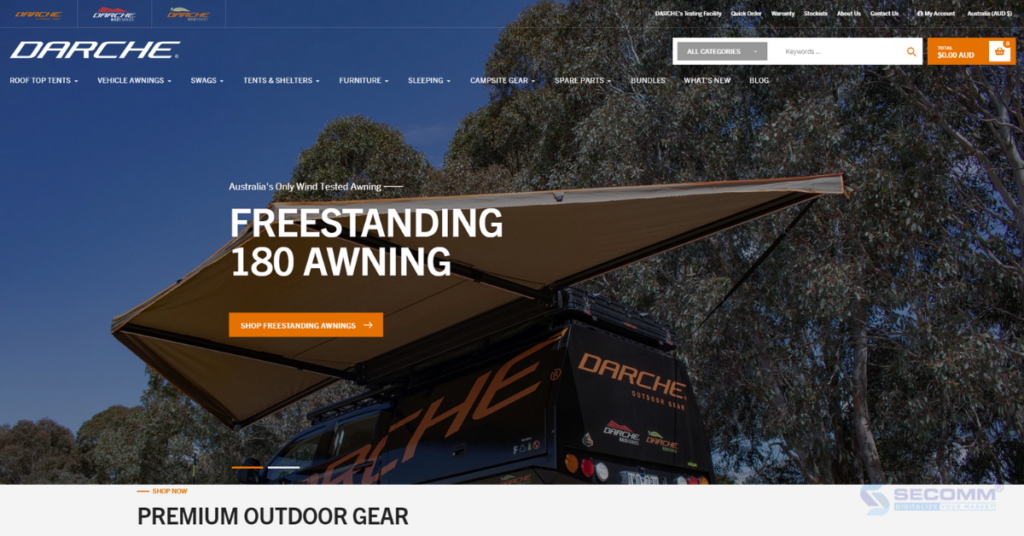
Build Your First Shopify Plus eCommerce Website Now!
Here are the top 10 Shopify Plus eCommerce websites, favored destinations for Australian consumers. These businesses not only prioritize product quality but also focus on enhancing the online shopping experience for customers.
With many years of successful collaboration in deploying Shopify Plus eCommerce websites for numerous Australian clients, SECOMM boasts a team of highly experienced experts with advanced technical skills and a deep understanding of the eCommerce market.
Contact SECOMM or call the hotline (+84)28 7108 9908 for more detailed information about the Shopify Plus platform!
 2
2
 3,545
3,545
 0
0
 1
1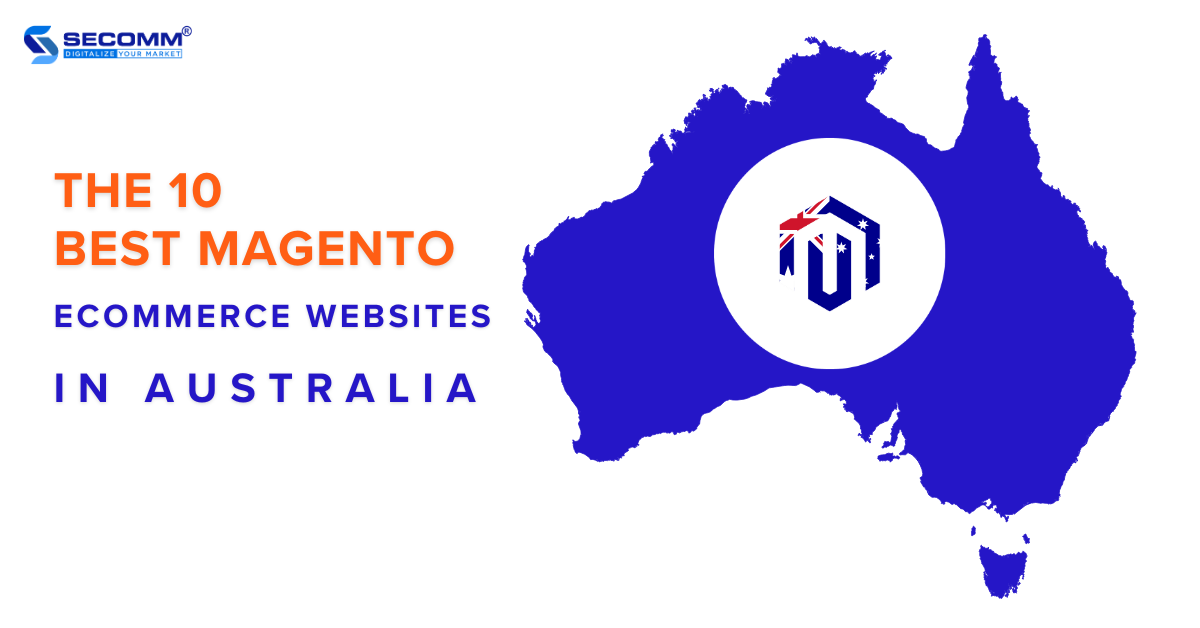
Magento is one of the most popular platforms today, allowing businesses in every industry to build customized eCommerce websites. In Australia, Magento is also highly favored and consistently chosen as the top preference for local businesses, with nearly 4000 live stores.
Let’s take a look at the top 10 leading Magento eCommerce websites in Australia in the following article.
Pet Barn is a leading brand in Australia, specializing in providing products and services for pets. Over a decade, Pet Barn has earned a strong reputation among the pet-loving community in Australia, offering a wide array of safe and high-quality products.
The Pet Barn eCommerce website is built on the Magento platform, a robust system for eCommerce and content management. By using Magento, Pet Barn can efficiently manage and operate while optimizing the online shopping experience for customers.
The flexibility, security, and ease of customization and expansion provided by Magento continually empower the brand to improve its services and cater to the ever-evolving and diverse needs of Australian customers.
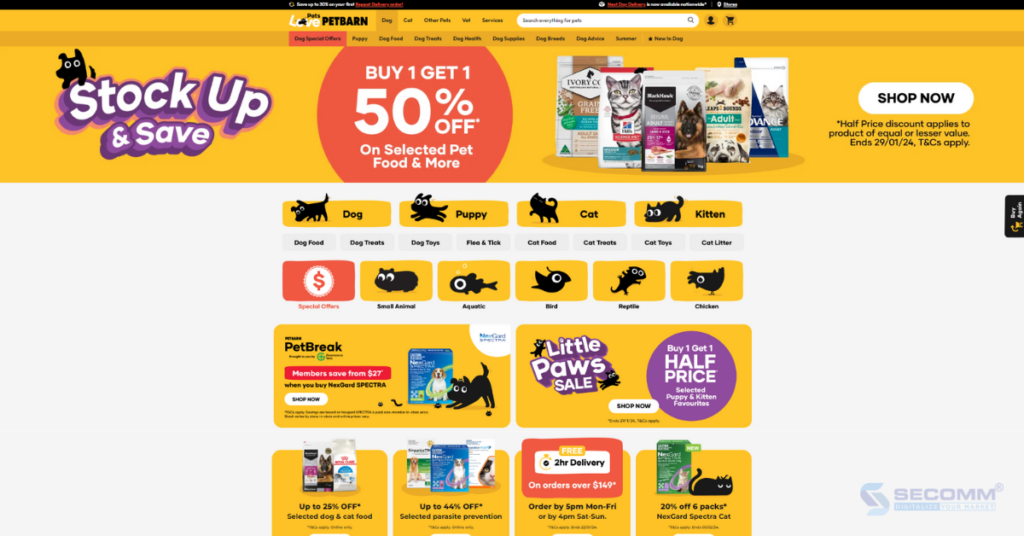
Forever New is an Australian fashion brand, renowned for its high-quality clothing and accessories for women with an elegant and modern style. Over a decade, Forever New has gained customer trust and secured a significant position in the Australian fashion industry.
The brand used Magento to build the eCommerce website, striving to boost its online visibility and find the most efficient operational solutions. This move played a huge role in Forever New’s digital success, enabling remarkable growth and swift adaptation to emerging trends in the market.
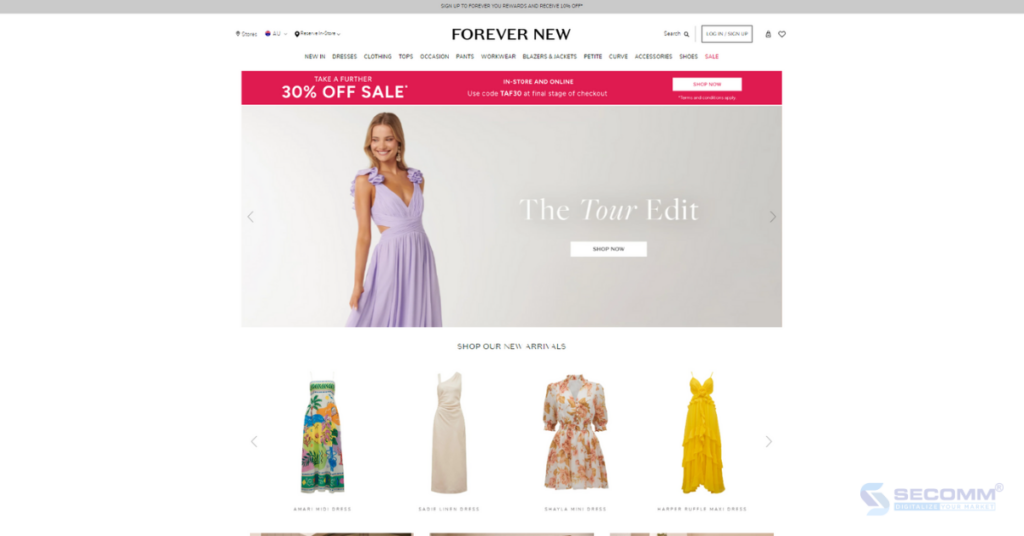
Dick Smith is one of Australia’s leading brands specializing in consumer electronics products. With a rich history and a robust reputation, Dick Smith has established a unique position in the Australian market, recognized as a trustworthy destination for technology enthusiasts seeking top-tier products.
The great customizability and scalability of Magento helped Dick Smith efficiently manage a large product portfolio and optimize the customer experience with unique features and promotional programs.
The website design not only ensures a seamless online shopping experience but also reflects the brand’s identity with a visually appealing, innovative, and user-friendly interface. The advanced search feature and product filters make it easy for customers to find their favorite items.
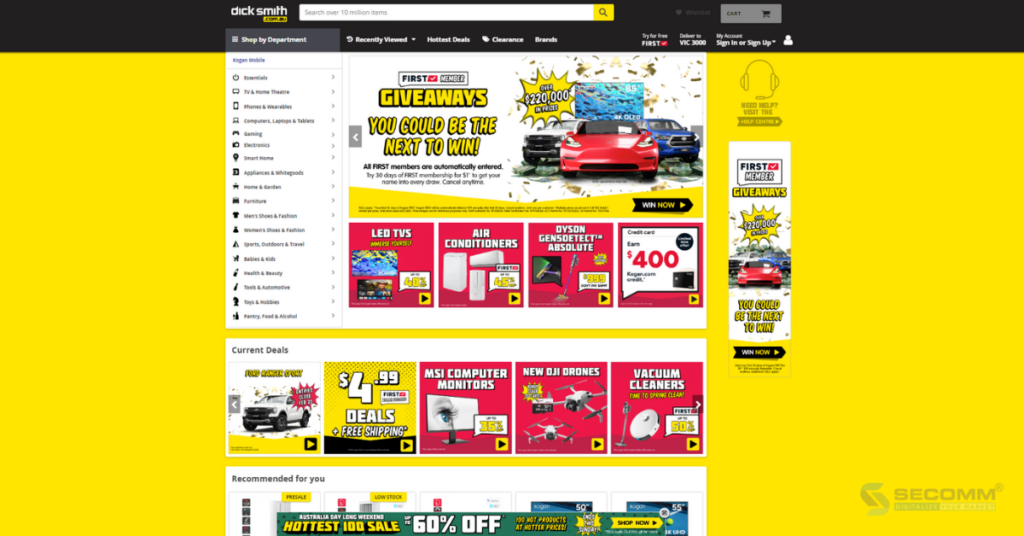
Another widely known fashion brand throughout Australia is Bonds. This brand is famous for its diverse array of fashion products for men, women, and children, offering a variety of styles, and sizes, as well as ensuring durability and safety.
Magento, a top-tier eCommerce platform, has delivered numerous advantages to Bonds. The flexibility in managing products, high customization, and easy scalability have aided Bonds in maintaining diversity in its collection and swiftly adapting to market trends.
The Bonds eCommerce website showcases the brand’s sophistication through a visually appealing user interface and provides advanced search features, secure payment processes, and detailed product information. This ensures that Bonds not only retains its current customer base but also attracts the attention of newcomers looking to experience the comfort and distinctive style of the brand.
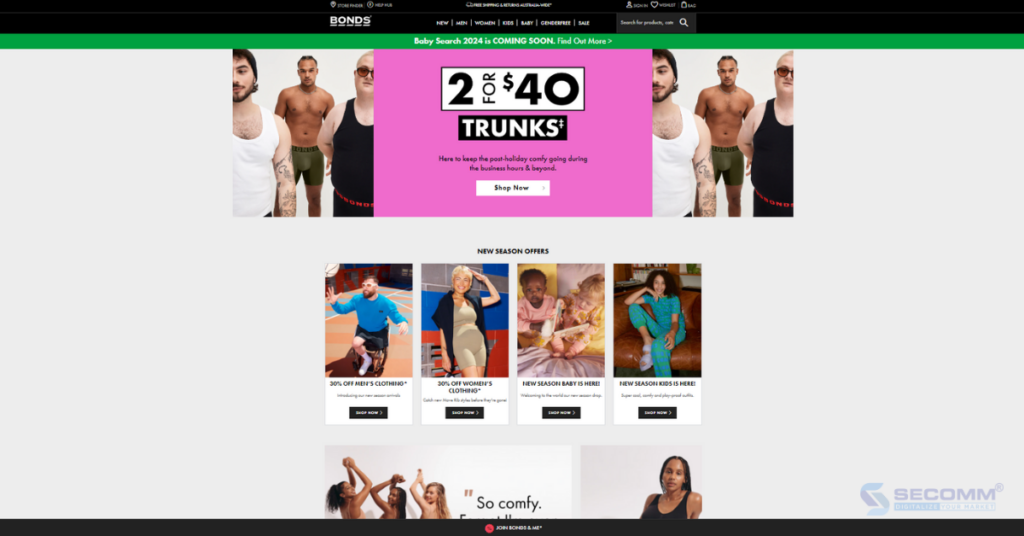
Bed Bath N’ Table is a renowned brand in Australia, specializing in providing furniture and decorations for bedrooms, bathrooms, and dining areas. With a focus on quality and beautiful design, Bed Bath N’ Table has been promoted as an ideal destination for those seeking a luxurious and comfortable living space.
The eCommerce website, built with Magento, offers flexible customization and scalability. The website impresses with a user-friendly interface, an advanced search system, a secure payment process, and optimization.
Moreover, the brand provides useful information about home decor and helpful cleaning tips. To date, Bed Bath N’ Table is not only a reliable furniture shopping destination but also a place for customers to find inspiration and ideas to decorate their living spaces.
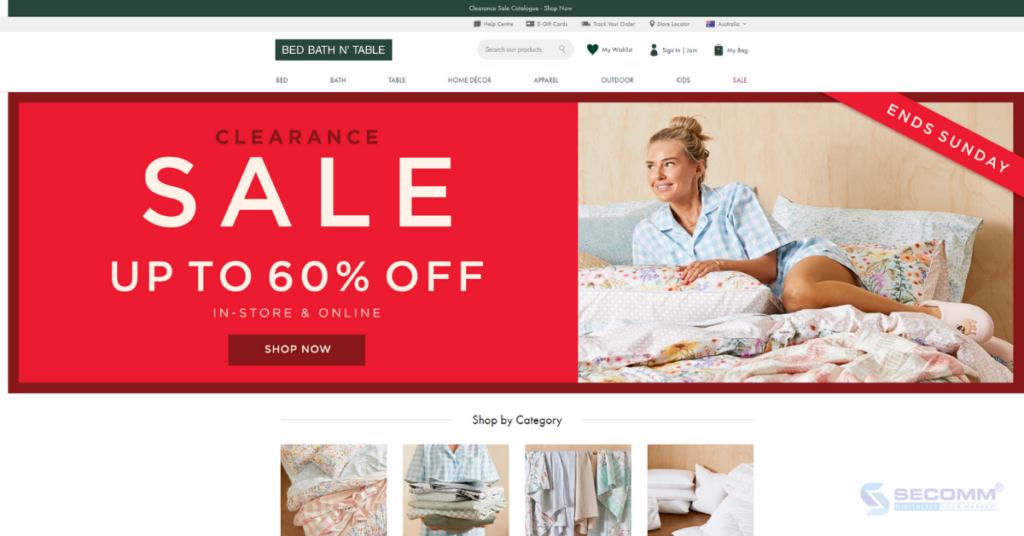
Sussan, a long-established and reputable fashion brand in the Australian market, has won the hearts of consumers through the blend of modern style and comfort. Over 80 years, Sussan has become an icon in the Australian fashion industry, known for creating outfits that reflect the confidence and creativity of modern women.
The eCommerce website of Sussan is a good destination for fashion enthusiasts seeking quality products. Developed on the Magento platform, the website helps Sussan deliver an optimal customer experience and enhance operational efficiency.
Moreover, the website integrates secure and convenient payment features, offering detailed insights into product information and origins. This creates an interesting and reliable shopping experience for Sussan’s customers.
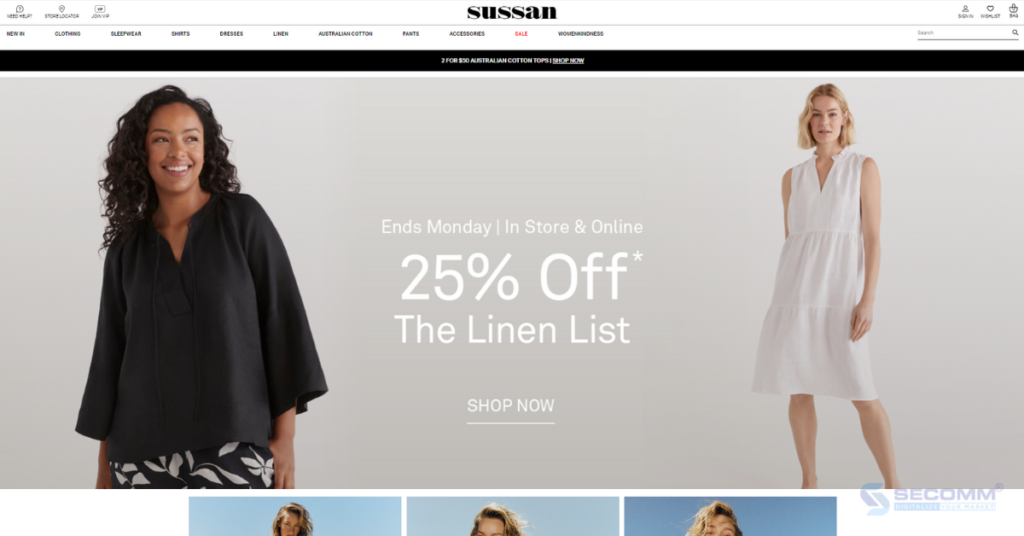
Kathmandu, a well-known brand specializing in outdoor apparel and equipment for adventure and sports, has made a notable contribution to enhancing the excitement and comfort of outdoor living. The Magento-developed eCommerce website of Kathmandu offers a rich customer experience that can be easily customized and expanded based on business needs.
Alongside the optimized shopping experience, Kathmandu provides enticing discounts and promotional programs to attract new customers and retain the loyalty of existing ones.

Sportsgirl, a renowned fashion brand in Australia, has dominated the market with innovation and diversity in its women’s fashion collections. Over 70 years, Sportsgirl isn’t just a shopping destination but also a source of inspiration for personal style, blending the latest fashion trends with a unique flair.
Sportsgirl’s eCommerce website, powered by Magento, allows the brand to deliver an optimal customer experience while effortlessly customizing features and expanding the system to meet the evolving needs and trends of the market.
Moreover, Sportsgirl provides customers with appealing offers, including discounts, buy one get one free promotion, free shipping, gift card giveaways, and a variety of payment methods.
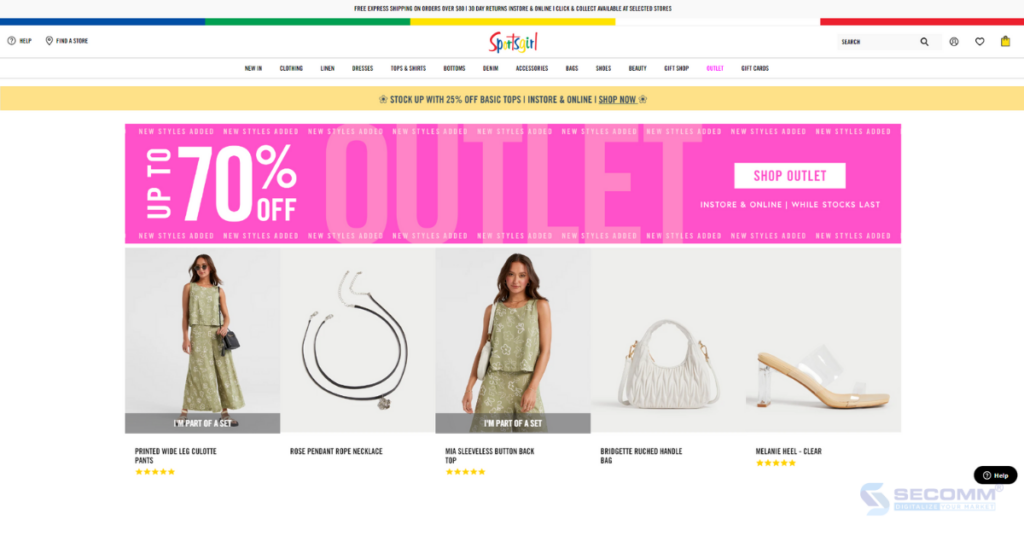
Another well-known Australian furniture brand on this list is King Living. This brand has become an icon of luxury and innovation in creating high-quality furniture products.
King Living’s eCommerce website is a reliable online shopping destination for customers seeking the most convenient solutions for furniture purchases. The website is built and developed on the Magento platform, allowing King Living to freely customize unique features specific to the industry to provide the best online shopping experience for customers.
Notable features include 360-degree viewing, VR/AR capabilities, product specification viewing and downloading, one-page checkout, and more. After over 40 years, King Living has built a strong reputation in the consumer community, particularly among those who appreciate the value of upscale living spaces.
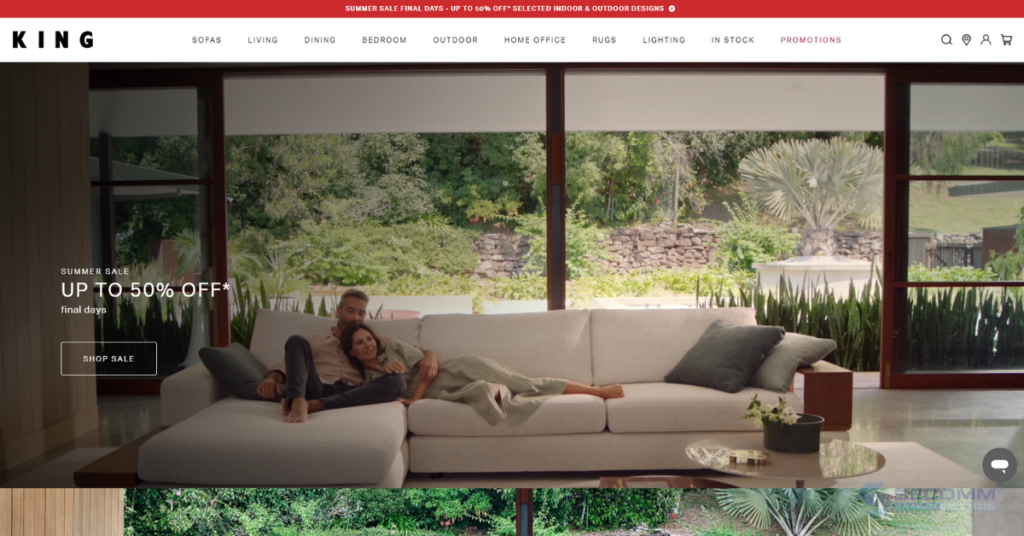
Chemist Direct is a leading brand in the Australian market, offering a wide range of healthcare and beauty products and services. The brand not only provides a diverse selection of medications, vitamins, and beauty items but also prioritizes delivering quality healthcare information to empower customers in effective at-home health management.
Utilizing Magento for its eCommerce website, Chemist Direct can tailor unique features to enhance customers’ shopping experiences. The website offers a variety of products from multiple brands and diverse payment methods, including the Buy Now Pay Later option.
Moreover, with advanced search functionality and a secure and simple payment process, the Chemist Direct website stands out, making it easy for customers to find and purchase high-quality healthcare and beauty products.
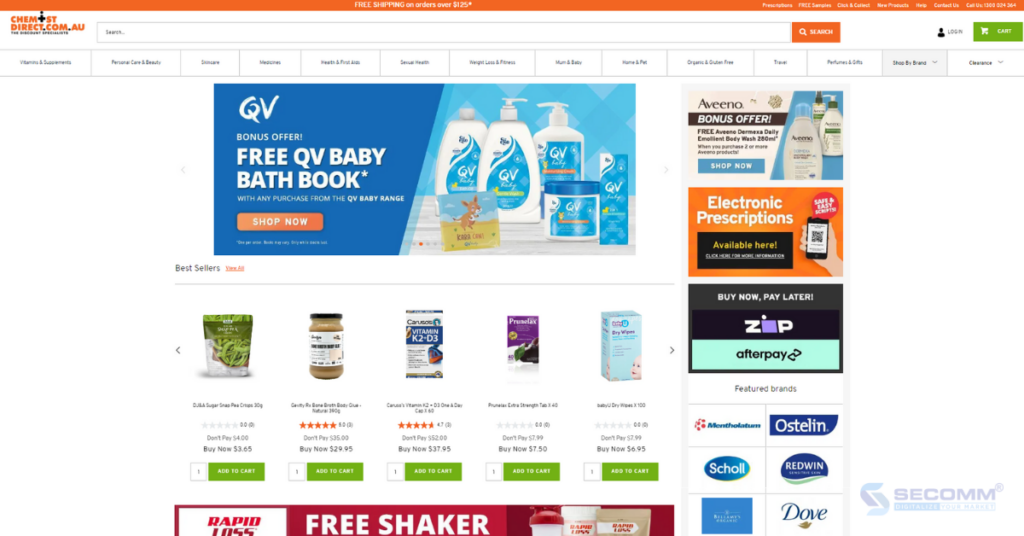
Build Your First Magento eCommerce Website Now!
Above are 10 eCommerce websites in Australia, notable for being built on the Magento platform. These brands have effectively utilized Magento’s customizable and flexible features to introduce unique features, ultimately enhancing the overall customer shopping experience.
With extensive experience in successfully developing Magento eCommerce projects for various Australian clients such as Laybyland, Jasnor, RodShop, Trentham Estate,
etc, SECOMM boasts a team of highly skilled experts with advanced technical skills and a deep understanding of the eCommerce landscape.
For further details about the Magento platform, please contact SECOMM or call the hotline at (+84)28 7108 9908!
 2
2
 3,351
3,351
 0
0
 1
1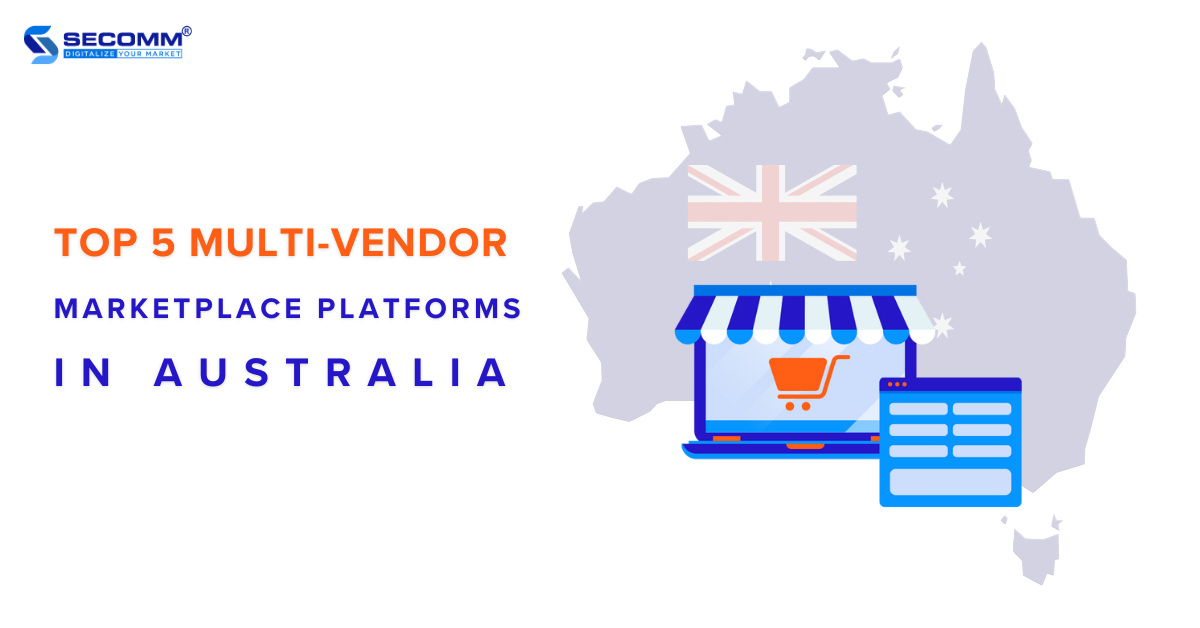
The demand for shopping on multi-vendor marketplaces has been rising in Australia recently, particularly since the Covid-19 pandemic.
Data from Statista, up to December 2023, reveals the leading players in the Australian multi-vendor marketplace market, measured by average monthly visits. This includes international giants like Amazon and eBay and local brands such as Kmart and Coles.
Therefore, other Australian businesses still have ample opportunities to join the eCommerce landscape. The critical initial step is to choose the right platform to build an online marketplace that suits the specific business needs.
Here 5 popular choices of many Australian eCommerce businesses.
Learn more: 14 must-have features to build your online marketplace
Marketplacer is a Software as a Service (SaaS) platform that allows you to create your multi-vendor marketplace by integrating with existing eCommerce systems like Adobe Commerce, BigCommerce, Salesforce Commerce Cloud, and commercetools.
You can also build the Headless eCommerce marketplace by integrating custom frontends into Marketplacer’s backend through APIs. This gives you complete control over the user experience and the optimized platform operation.
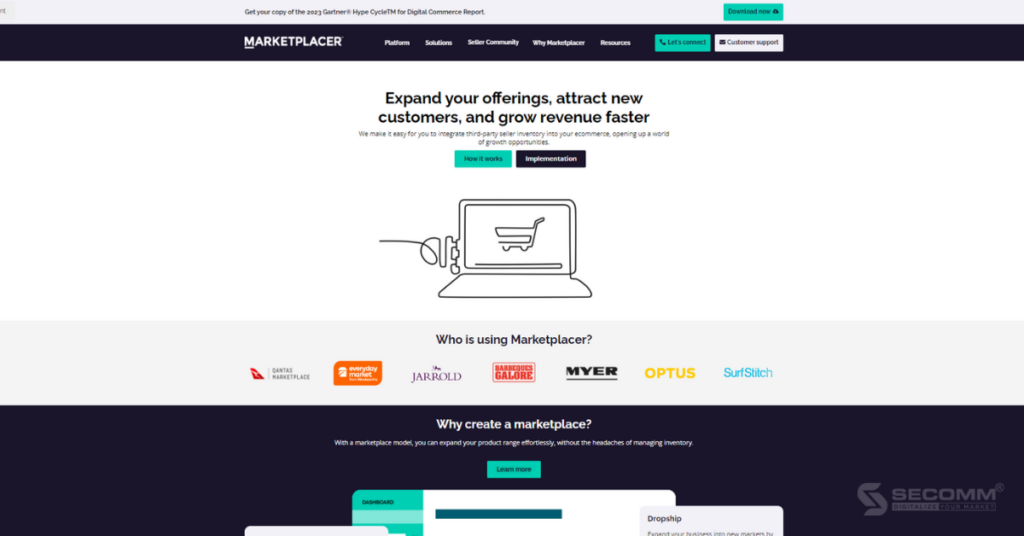
Pros:
Cons:
Top features:
Price: Pricing may vary based on specific requirements
Learn more: Build your first online marketplace with the Marketplacer platform
Magento 2 is a widely used eCommerce platform globally, known for its flexibility and superior scalability. The platform offers you the Multi-Vendor Marketplace Extension, allowing you to build your online marketplace with the Magento framework.
Using this extension, you can convert your Magento eCommerce website into a feature-rich marketplace like Amazon and eBay.
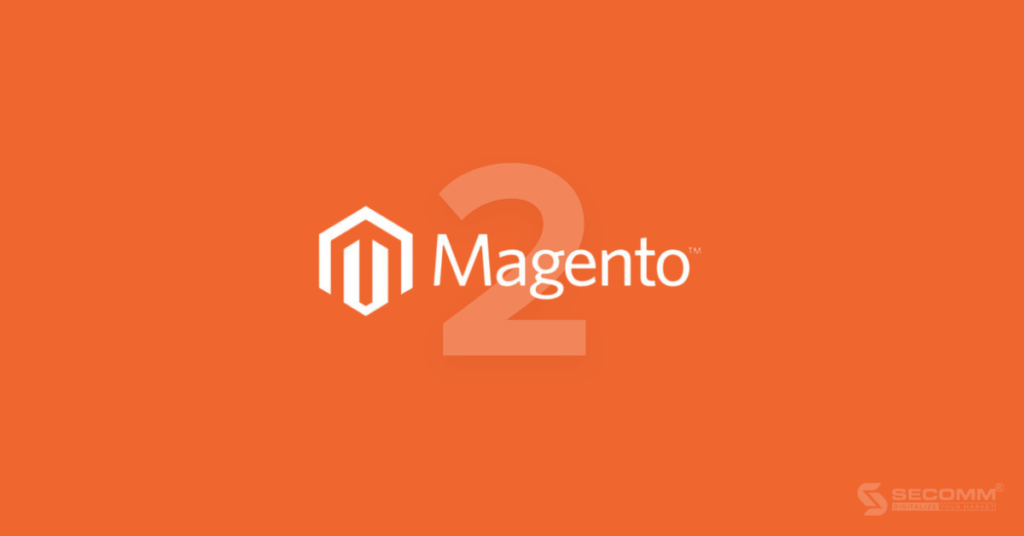
Pros:
Cons:
Top features:
Price: Pricing may vary based on specific requirements
Learn more: Magento 1 vs Magento 2: Full Comparison
Yo!Kart is a leading self-hosted eCommerce solution that you can consider for building a customized online marketplace. Yo!Kart is designed to be user-friendly
prominent that businesses can consider for building a customized online marketplace. Designed to be user-friendly, Yo!Kart allows businesses complete control, customization, and flexible scale to manage and operate their eCommerce marketplace efficiently.
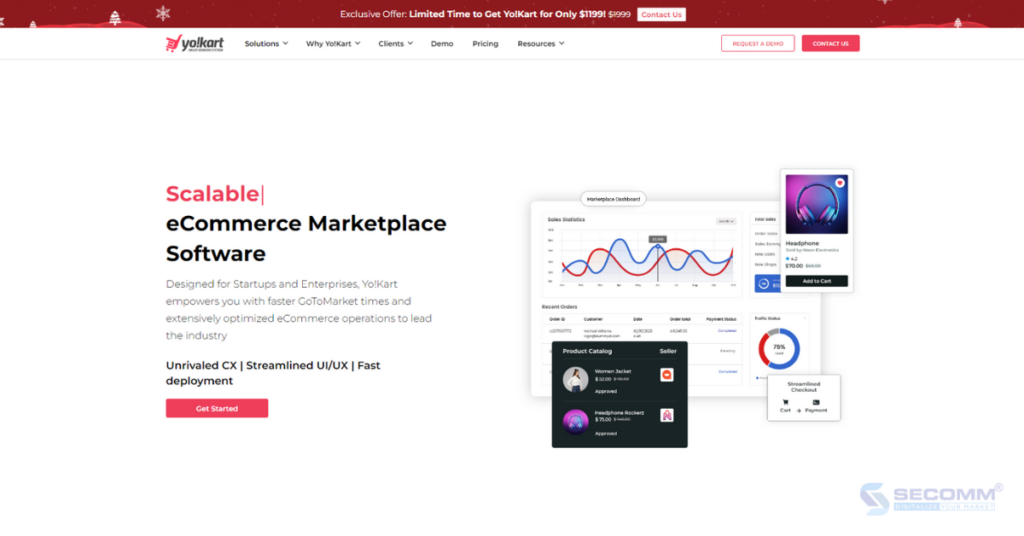
Pros:
Cons:
Top features:
Price: Starting from $1099/year. However, costs may vary based on specific requirements.
CedCommerce is a platform that helps you expand your online operations by creating a feature-rich eCommerce marketplace. With CedCommerce, you can easily manage multiple vendors and provide them with a robust platform to sell their products.
One key feature of CedCommerce is its ability to integrate with various eCommerce platforms such as Magento, Shopify, BigCommerce, WooCommerce, etc. CedCommerce, with its high flexibility, offers you many customization options, including the ability to customize vendor onboarding processes, commission rates, shipping rates, and more.
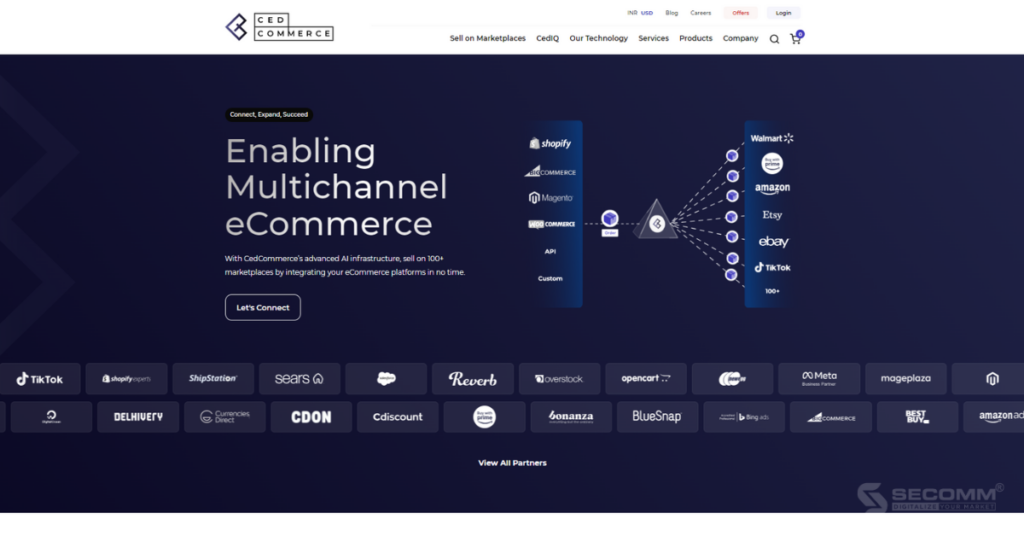
Pros:
Cons:
Top features:
Price: The fees aren’t public and will vary based on specific requirement
CS-Cart Multi-Vendor is known as a specialized platform for building online marketplaces with superior customizability and scalability. Integrated with over 26 languages and featuring unique functionalities, this all-in-one solution is suitable for various industries and deployment needs.
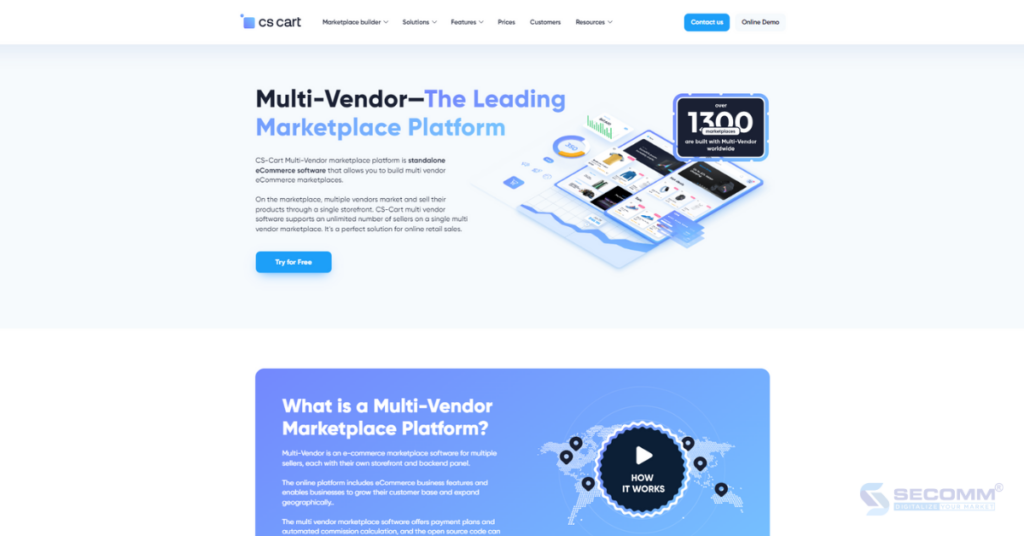
Pros:
Cons:
Top features:
Price: Pricing may vary depending on specific needs.
Build Your First Multi-Vendor Marketplace Platform Today!
Here are 5 platforms widely used by Australian businesses to build flexible, feature-rich, and optimized custom online marketplaces. With experience in deploying numerous multi-vendor marketplace projects for Australian clients such as Laybyland, Seconds Deals, etc., SECOMM has a team of highly skilled technical experts with a deep understanding of the Australian market.
If you’re ready to build an eCommerce marketplace, contact SECOMM or call (+84)28 7108 9908 today for a free consultation!
 2
2
 4,002
4,002
 0
0
 1
1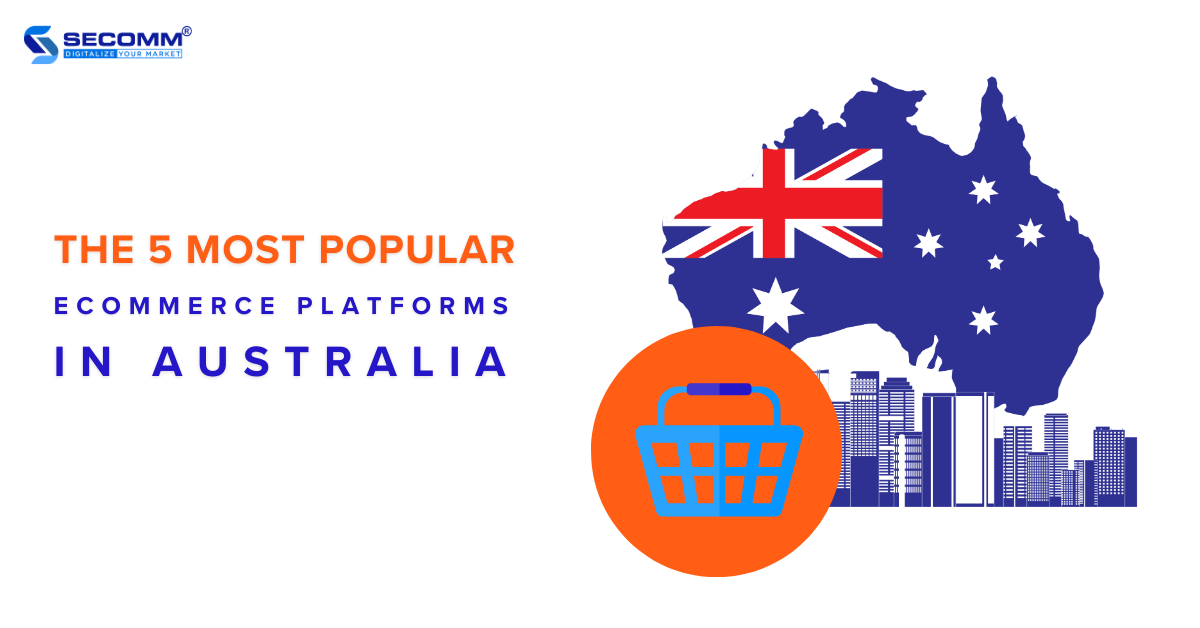
The Australian eCommerce world is continually evolving alongside the constant emergence of technological solutions. As a result, there is an increasing and diverse range of choices for eCommerce platforms.
This presents both an advantage and a challenge for businesses, as selecting the right platform for building an eCommerce website is a crucial first step.
Below are the top 5 leading eCommerce platforms in Australia.
Learn more: Top 10 most-visited eCommerce websites in Australia
Magento is a globally popular open-source platform, and its prevalence extends to Australia as well. According to BuiltWith, there are currently more than 4000 live websites in Australia utilizing the platform.
With its high flexibility, businesses can effortlessly tailor features and scale the system according to their unique business requirements.
Presently, Magento provides businesses with two versions: Open Source (Free) and Adobe Commerce (Paid).
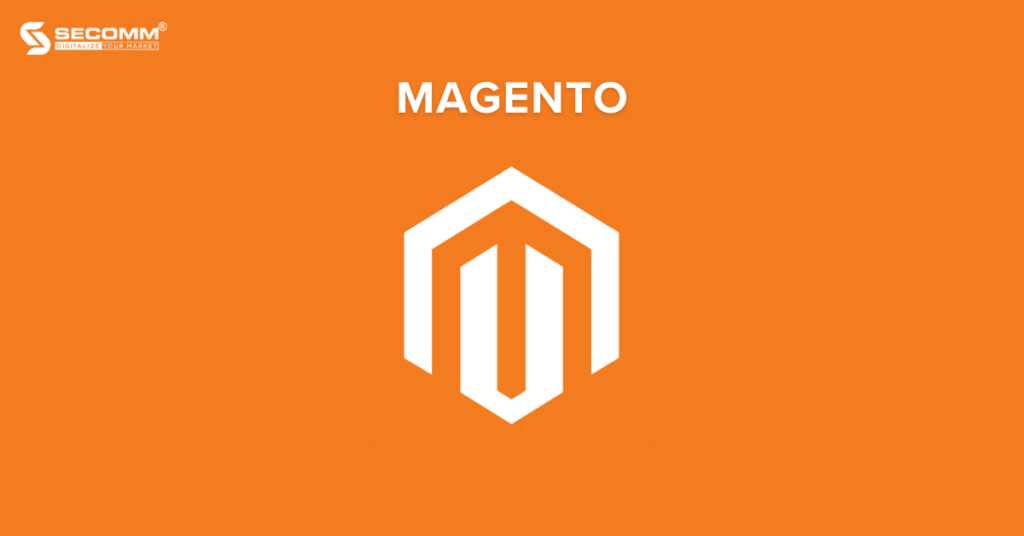
Pros:
Cons:
Core feature:
Pricing:
Learn more: Top Magento eCommerce websites in Australia
Shopify is a popular SaaS platform with over 4.8 million active websites. In Australia alone, over 150 thousand online stores are operating on the platform.
Recently, the premium version of Shopify, ‘Plus,’ has garnered attention from businesses across various sectors in Australia.
These businesses may have previously deployed different eCommerce platforms and later switched to the Plus to seek a superior solution. Some businesses initially launched websites with core plans and later upgraded to ‘Plus’ to optimize their operations.
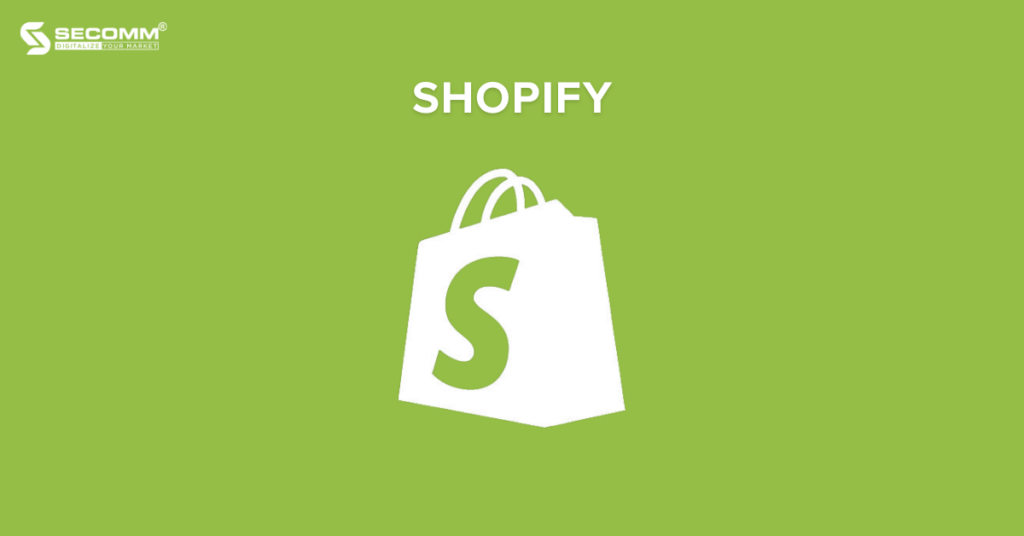
Learn more: Top eCommerce websites upgrade to Shopify Plus
Pros:
Cons:
Core feature:
Pricing
Here are Shopify pricing plans:
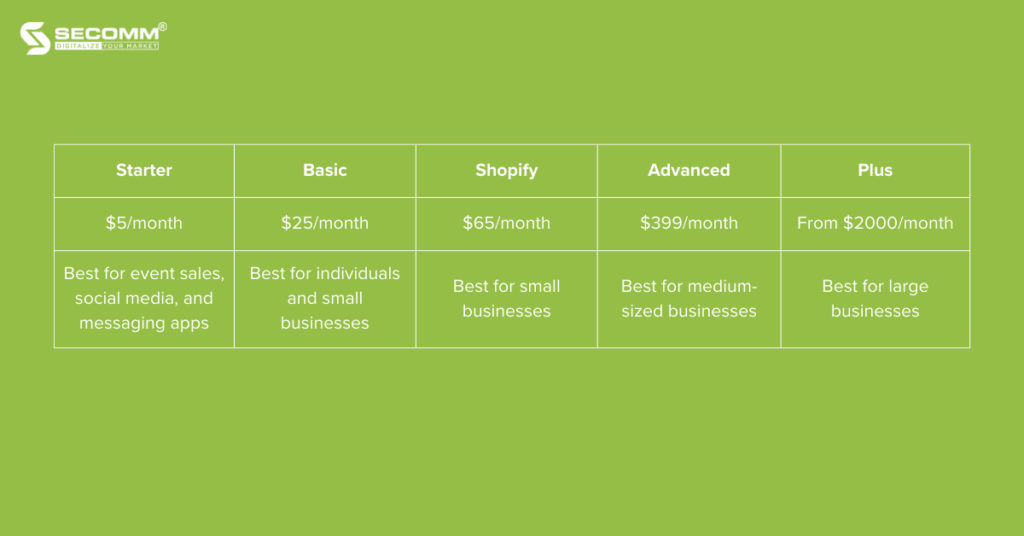
BigCommerce is another popular SaaS platform worldwide, with over 43 thousand active websites. In Australia, there are more than 2 thousand active BigCommerce websites.
The standout feature of this SaaS platform is its integrated features, enabling businesses of all sizes and technical expertise to deploy eCommerce websites quickly. In addition to standard solution packages, BigCommerce offers an ‘Enterprise’ version tailored for large businesses with custom pricing.
Learn more: Top 10 eCommerce websites using BigCommerce
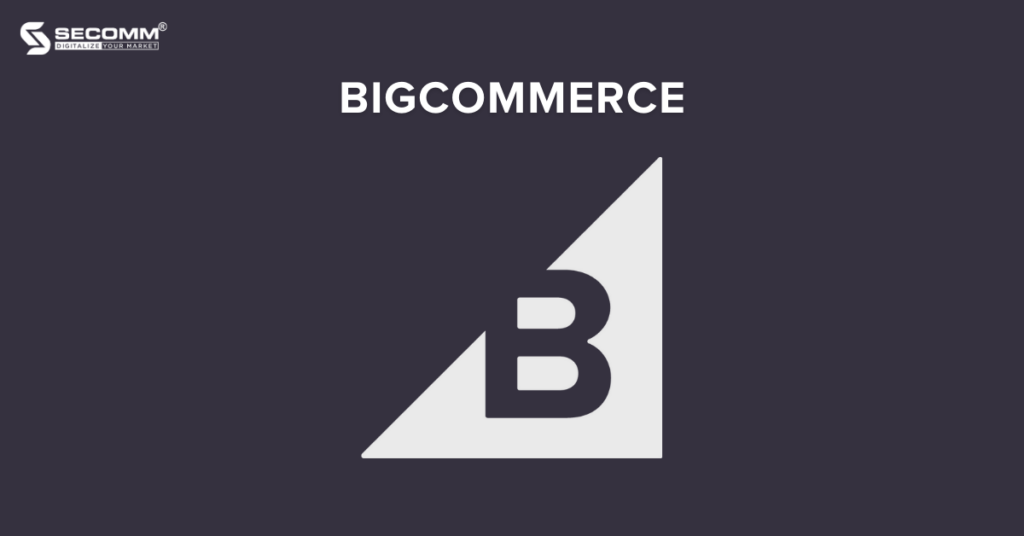
Pros:
Cons:
Core feature:
Pricing
Here are BigCommerce pricing plans:
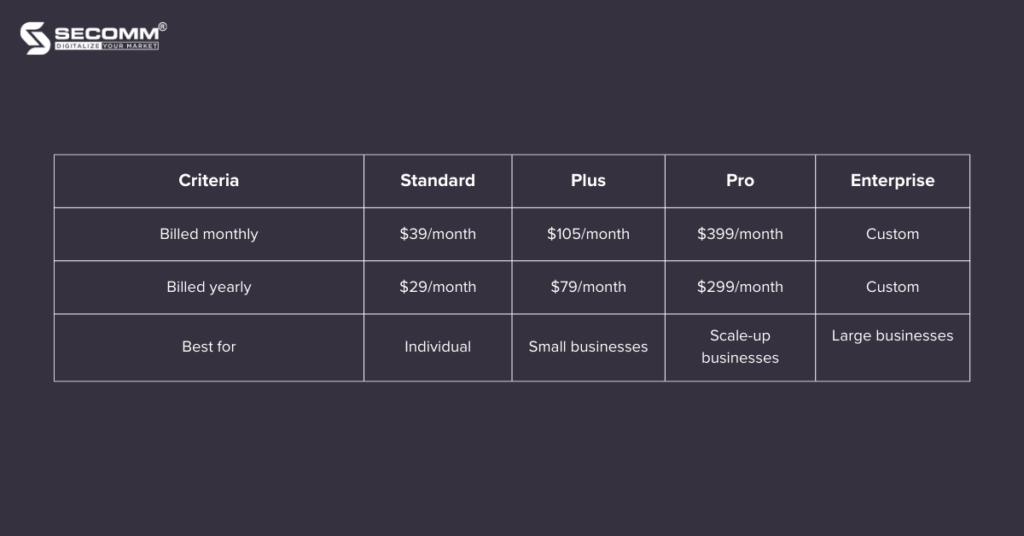
WooCommerce, a free and open-source WordPress plugin, enables brands to integrate eCommerce functionality into their existing WordPress websites.
With just a few clicks, the WooCommerce plugin helps convert a standard WordPress site into a fully-featured eCommerce platform, complete with essential features and easy customization.
Learn more: 20 websites using WooCommerce
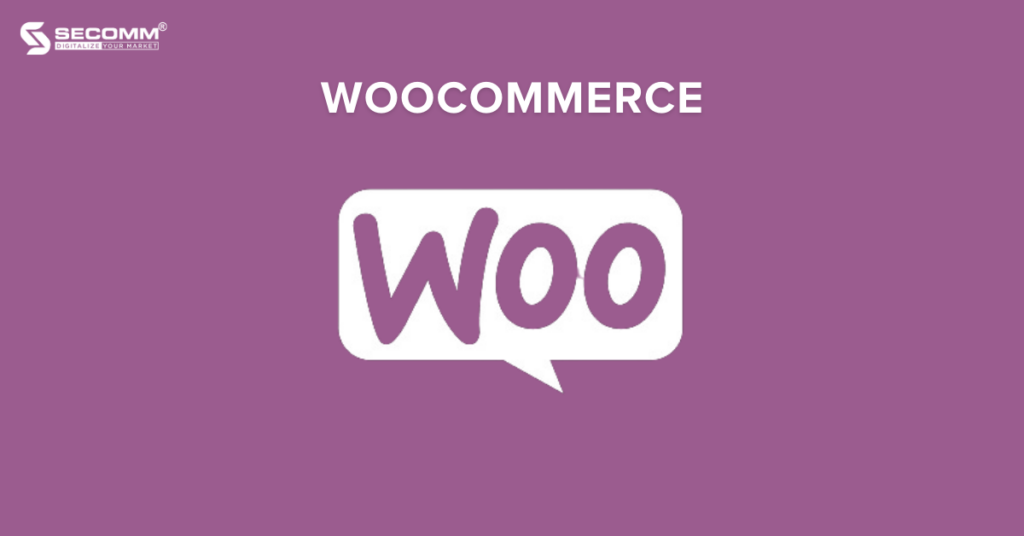
Pros:
Cons:
Core feature:
Pricing: Free to use. However, some integrations with other plugins may incur charges.
OpenCart is a globally popular open-source platform, powering over 900 thousand active websites worldwide. In Australia, it has gained popularity with more than 2 thousand active OpenCart websites, establishing itself as a favored open-source platform in the country, following Magento.
Founded by Daniel Kerr in 1998, OpenCart operates as open-source software, utilizing the PHP programming language. It currently offers two versions: Free (Free-to-use version) and Cloud Store (Paid version).
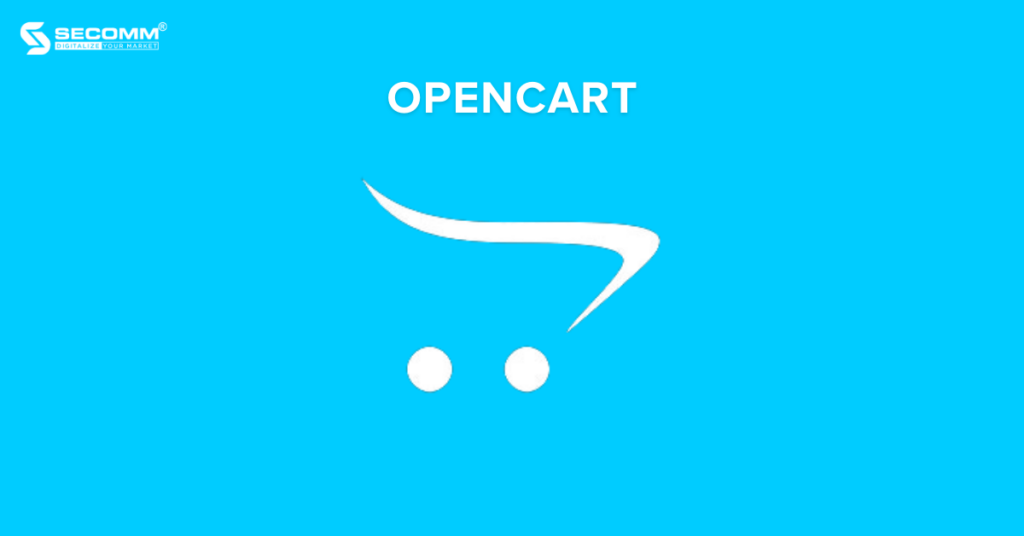
Learn more: Top OpenCart websites
Pros:
Cons:
Core feature:
Pricing:
Free for the Free version. For the Cloud Store version, the specific costs are as follows:
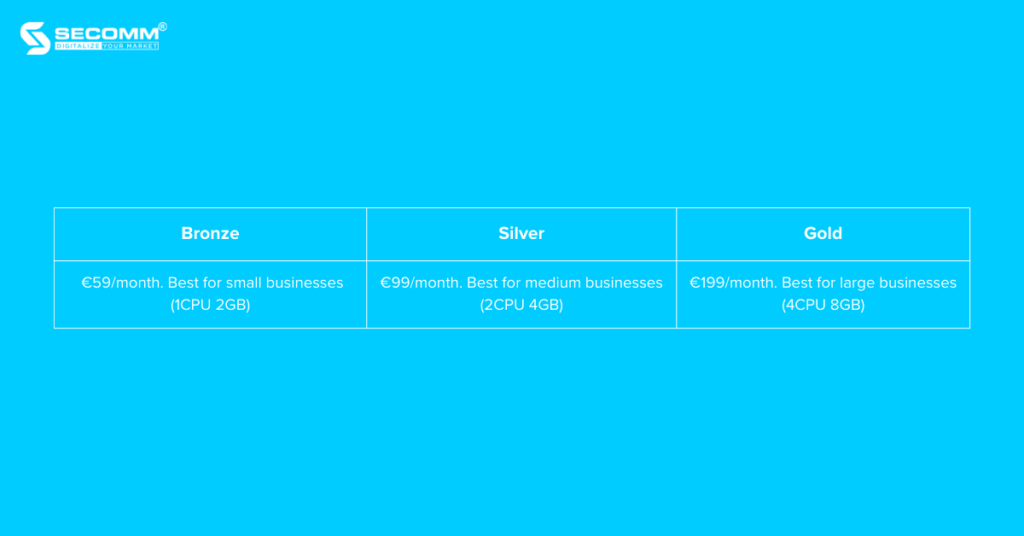
Above are 10 eCommerce platforms preferred by businesses in Australia when establishing their online stores. Each business will make its decision based on factors like scale, business model, and specific deployment requirements.
With over 10 years of experience collaborating with various Australian businesses such as Laybyland, RodShop, Trentham Estate, Jasnor, etc., to build eCommerce websites, SECOMM now possesses a team of highly skilled technical experts and a deep understanding of the Australian market.
For personalized advice on the best-suited platforms for your business, contact us or call the hotline (+84)28 7108 9908 today!
 2
2
 3,692
3,692
 0
0
 1
1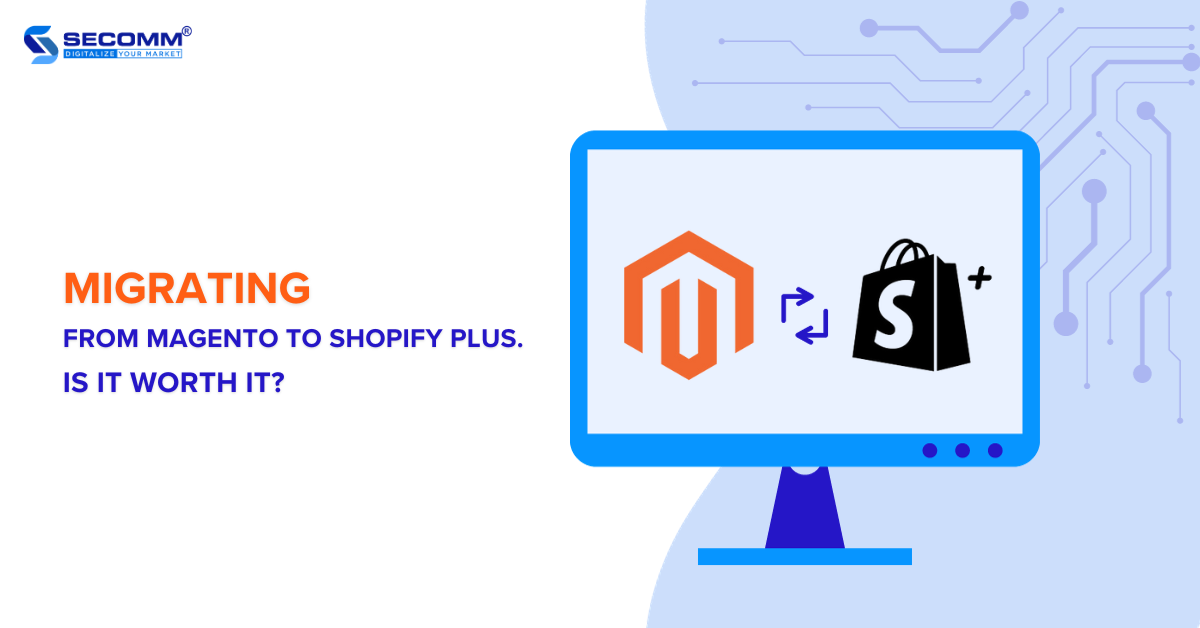
Migrating from Magento to Shopify Plus is a strategic decision that many businesses are considering. While Magento holds a prominent position in the eCommerce market, the ongoing trend of switching to Shopify Plus has raised questions about its reasons, prompting a comparison between the two platforms. Join us in exploring these aspects in this article.
Learn more: Adobe Commerce vs Shopify Plus
Magento is an open-source eCommerce platform with over 140,000 active websites and was acquired by Adobe in 2018. It offers many advanced features, allowing you to tailor your eCommerce websites.
It has two versions: Magento Open Source, a free option to download and install on your servers, and Adobe Commerce (formerly Magento Enterprise), a paid version with premium features such as Adobe’s hosting and security services.
Shopify Plus stands out as Shopify’s advanced SaaS eCommerce platform tailored for large and rapidly growing enterprises. With high scalability, it can handle surges in traffic and sales volumes reaching billions of dollars.
By leveraging Shopify Plus, you can benefit from a robust infrastructure that facilitates easy customization and centralized management of multiple stores, brands, languages, and currencies through a dashboard.
Also, the platform offers a range of superior solutions to enhance eCommerce operations, including Shop Pay, Shopify Flow, LaunchPad, Shopify Scripts, and more.
Many businesses opt to move away from the Magento platform in pursuit of a more optimal solution for their eCommerce websites. However, the following two reasons are widely regarded as the most prevalent.
After launching the Magento 2 (M2) version, the company has declared they’ll no longer support the Magento 1 (M1) version. This means that if you’re using the older version, you won’t receive security updates, bug fixes, and technical assistance.
So, the platform encourages their customers to upgrade to M2 to ensure continued technical support, enhanced security, and access to a variety of new and advanced features.
However, the upgrade process is complex, requiring significant investment in terms of cost and time for source code and interface customization. It may force you to halt your eCommerce operations.
In case you want to keep operating M1 alongside the update process, there’s a potential risk of disrupting system operations, causing significant disruptions to the customer experience, and ultimately affecting sales.
Moreover, there’s also a potential risk of compatibility issues, as some features and modules initially built on M1 may require significant customization to operate effectively on M2.
Faced with these risks, some businesses opt not to upgrade but rather switch to an alternative eCommerce platform. Frequently, these businesses turn to SaaS platforms that offer robust technical support and readily available solutions.
Learn more: M1 vs M2
Some businesses that have upgraded and used M2 for a while have realized that it may not be the best choice. Developing and maintaining a M2 website requires high technical expertise, especially if you want to integrate and customize specific features.
If you don’t have a sufficiently professional technical team or inefficiently collaborate with deployment partners, the customization process is even more complex.
Plus, while the open-source platform offers high scalability, it lacks flexibility. So, if you don’t set up and build your system properly, it may get issues during peak shopping times, leading to crashes and interruptions.
This, in turn, customers to be unable to access the website for purchases, causing significant harm to your brand.
Learn more: The costs of building a Magento eCommerce website
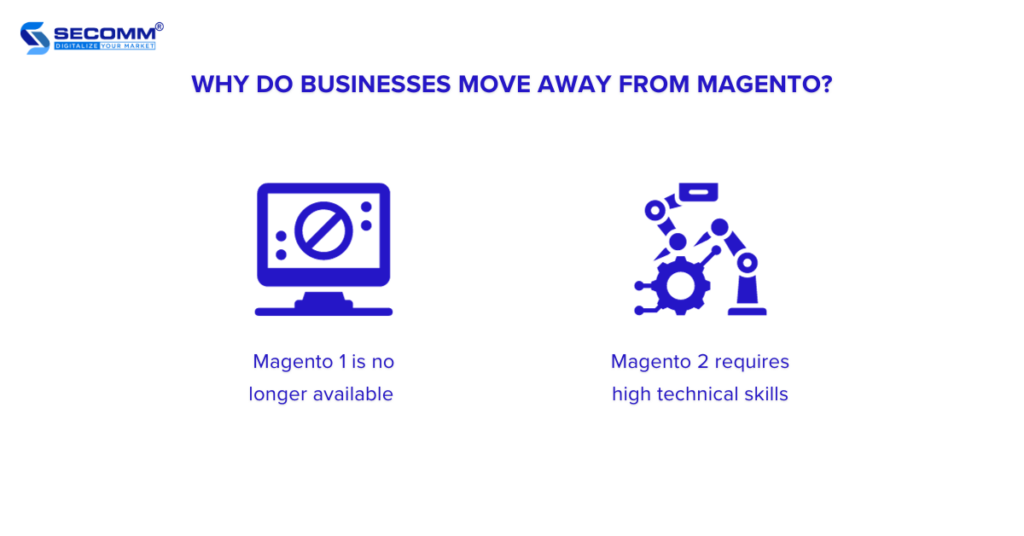
Learn more: 15 reasons why you should migrate to Shopify Plus
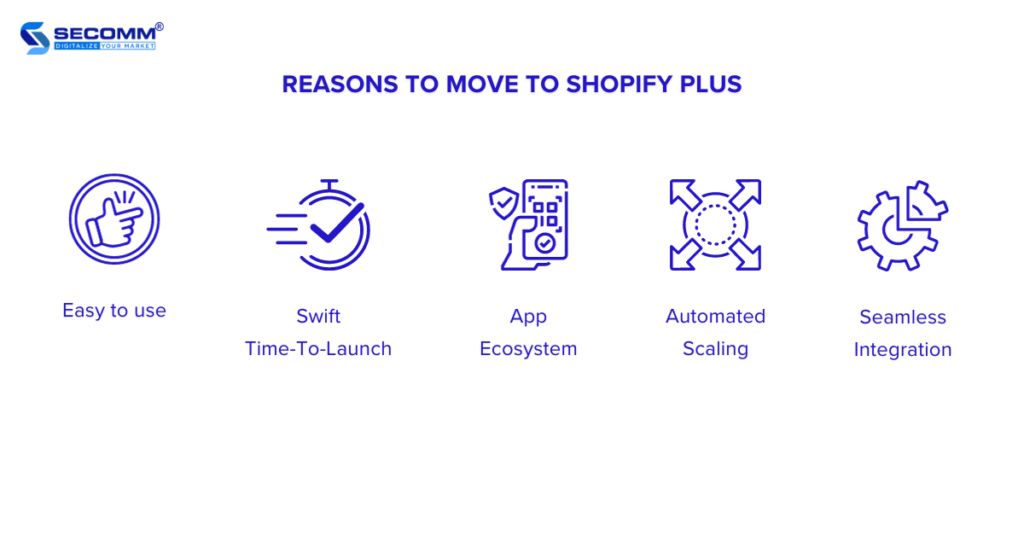
Below are some brands that have previously embraced eCommerce using Magento and switched to Shopify Plus to reduce technical complexities and costs.
Gymshark, a UK-based brand specializing in sportswear and fitness fashion, has emerged as a prominent and favored global sportswear brand since its inception in 2012.
Facing a website crash during the bustling Black Friday shopping season, Gymshark, previously on Magento, made the strategic decision to switch to Shopify Plus.
Despite time and financial investments in repairing and maintaining the system, there was no guarantee of long-term effectiveness.
Upon switching to Shopify Plus, Gymshark capitalized on available solutions such as Shopify POS to elevate both online and offline shopping experiences. The implementation of Shopify Scripts, an exclusive tool for the ‘Plus’ merchants, allowed them to customize and optimize the checkout process.
By using this advanced SaaS platform, Gymshark significantly boosted conversion rates and sales, particularly during major year-end shopping events. This success has firmly established Gymshark as one of the fastest-growing brands globally.

Founded in the United States in 2013, Bombas is a brand specializing in the manufacturing and retail of socks. Renowned for its “buy one, donate one” approach, Bombas pledges to donate a pair of socks to those in need for every pair sold.
Bombas faced website crashes on its previous Magento platform, occurring during Shark Tank program airings and major shopping events like Black Friday and Cyber Monday. These disruptions led to substantial financial losses and incurred significant fees for system repairs over an extended period.
To capitalize on the seamless scalability offered by Shopify Plus, Bombas moved away from the previous. The Bombas website remained resilient during significant year-end shopping events.
The brand not only recouped its investment quickly but also witnessed a remarkable 300% surge in sales compared to the same period the previous year.

Jack Rogers, an iconic American brand specializing in footwear and fashion accessories, has enjoyed widespread recognition globally for an extended period. The brand is not only distinguished for its use of the highest-quality materials in crafting sophisticated and luxurious footwear but also for its global prestige.
After running on the Magento platform for a while, Jack Roger’s eCommerce website started experiencing issues. Each minor update incurred significant time and costs, leading to the decision to switch to Shopify Plus. This move aimed to find a cost-effective solution for operations and maintain the overall stability of the system.
Jack Rogers implemented Shopify Flow to automate both operational and sales processes. The brand also integrated various third-party applications such as Smile, Gorgias, and more to augment the eCommerce efficiency.
Learn more:

Below are some notes to consider during the platform migration process.
There are several methods to migrate data to the Shopify Plus system, such as automated migration, manual migration, and data import/export. You can choose one of these methods or deploy all of them to streamline the migration process and enhance data accuracy.
Customer data
Product data
Transaction data
Switching an eCommerce platform in general and specifically migrating from Magento to Shopify Plus is a complex process that demands detailed planning, precision, and an investment in both budget and time, along with technical expertise.
Therefore, solution architects need to strategize to redesign the system, encompassing system architecture, infrastructure, technology, performance monitoring tools, etc.
When deciding to switch to Shopify Plus, there are some things related to website optimization you need to keep in mind. The URL structure of the two platforms differ, so you should check the navigation of all web pages to ensure the preservation of SEO value and user redirection to the correct pages.
During the platform migration process, a temporary decrease in rankings on search engines like Google or Bing is normal and not a cause for concern. These search engines may take a few days to process the new website and update essential indices.
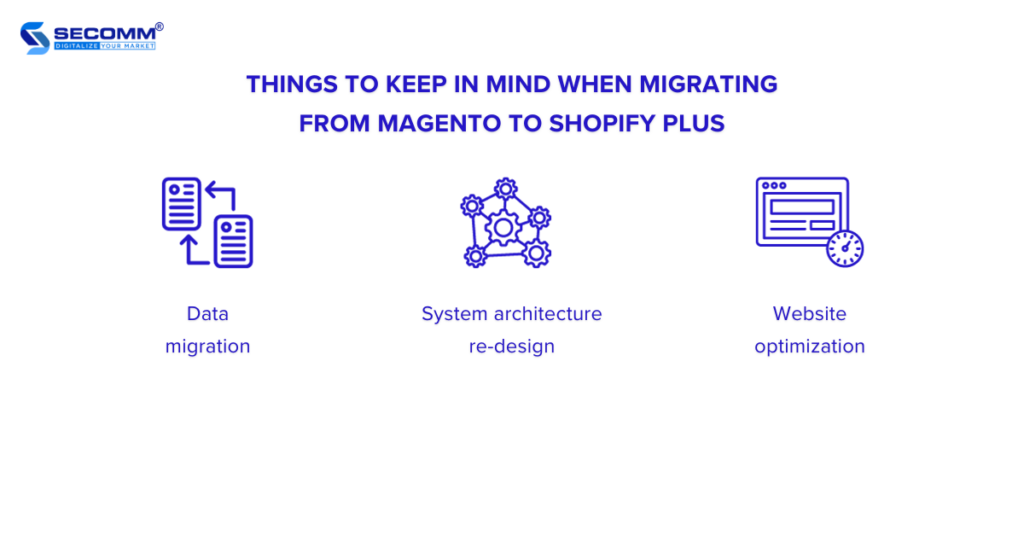
Lately, Shopify Plus has emerged as the preferred choice for businesses making the move from the Magento world.
Having extensive experience in developing eCommerce websites on both eCommerce platforms, and successfully executing the Shopify Plus migrations, SECOMM has become a reliable technology partner for many large enterprises such as Vinamilk and Suzuverse.
Contact SECOMM or call directly at the hotline (028 7108 9908) to start the project of the Magento to Shopify Plus platform migration process tailored to your business.
 2
2
 4,651
4,651
 0
0
 1
1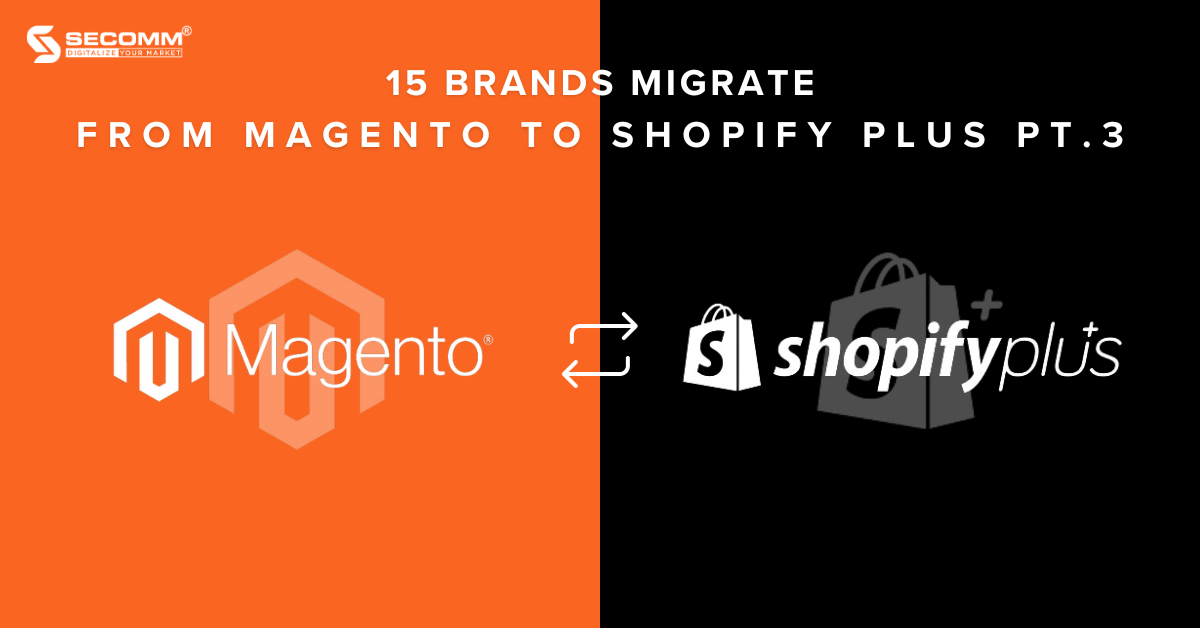
Building upon the narratives in parts 1 and 2, this third part invites you to delve into the stories of the remaining brands within the series of 15 that migrate from Magento to Shopify Plus. Explore how this strategic decision has led to their success in terms of sales and paved the way for sustainable growth in the future.
Learn more:
Beard & Blade is a wholesale business specializing in providing products for hair styling, beard care, and beauty and skincare for men. The brand is known for offering high-quality products tailored for men who aim to maintain their appearance and well-being.
Beard & Blade’s wholesale website was initially built and developed on the Magento eCommerce platform. However, according to the Beard & Blade team, operating the wholesale system on this platform proved to be challenging and required numerous manual tasks.
This resulted in time loss, and the overall cost for their wholesale system to operate on Magento was a considerable amount. Therefore, the brand decided to revamp its platform with Shopify Plus.
After considerable efforts, Beard & Blade’s Shopify Plus wholesale website for men’s products was officially launched.
By utilizing Shopify Plus’s dedicated solutions for wholesalers, Beard & Blade was able to automate inventory management, customize product pricing, and set discount levels based on the quantity of products ordered.
In contrast to the previous operational experience on Magento, wholesale orders on Shopify Plus are processed consistently, without interruptions, and without requiring manual tasks, thus avoiding disruptions to the customer experience.
Since the launch of the new website on Shopify Plus, Beard & Blade’s wholesale revenue has increased by 100%, and the average order value (AOV) for wholesale is five times higher than the retail AOV.

Milligram is a fashion and stationery brand headquartered in Melbourne, Australia. The brand primarily focuses on producing and providing stationery products, including notebooks, pens, and bags made from premium materials with unique designs.
Initially, Milligram built its eCommerce website on the Shopify platform, and later, in pursuit of brand growth, switched to using the Magento platform. After a while, as Milligram expanded its scale with more offline stores, the Magento website system started to operate slowly, and the backend database was overloaded.
Errors and delays occurred during updates, causing disruptions beyond the normal timeframe. Therefore, Milligram returned to Shopify, but this time opting for the advanced version – Shopify Plus.
Leveraging the available solutions of Shopify Plus, Milligram built and customized advanced features, such as an enhanced search function, to provide an optimal shopping experience for customers.
The platform transition from Magento to Shopify Plus was swift and smooth. Milligram easily executes promotional campaigns, uploads products without requiring technical skills, and finds managing and operating the Shopify Plus system more straightforward compared to Magento.
This allows Milligram to focus wholeheartedly on sales, marketing, and enhancing customer relationships.

Eden Park is a prestigious fashion brand originating from France, renowned for its high-end sportswear and fashion products. The brand specializes in providing premium sports and fashion items, with their collections often combining a blend of comfortable and luxurious styles.
In 2021, Eden Park turned its attention to Shopify when contemplating entry into the U.S. market. Moreover, at that time, Eden Park’s eCommerce website faced numerous operational issues.
Bastien Borget, the eCommerce Director of Eden Park, admitted that the business spent approximately 80% of its time operating the Magento website, yet the system consistently experienced errors, and the maintenance incurred substantial costs.
During Black Friday, the Magento website crashed due to overload from a sudden surge in traffic. At that point, Eden Park decided to revamp its platform with Shopify Plus, utilizing solutions within the Shopify ecosystem such as Shopify Payment and Shopify Flow.
Additionally, the superior integration capabilities of Shopify Plus allowed Eden Park to seamlessly integrate with third-party applications like Klaviyo, Gorgias, and Babak.
Eden Park’s Shopify Plus eCommerce website took less than 2 months to launch. One year after the introduction of the new website, Eden Park’s revenue increased by 30%, and the conversion rate rose by 48%.
The solutions provided by Shopify Plus alleviated the operational burden for Eden Park, allowing the business to allocate more time to marketing and sales rather than website maintenance, contributing to impressive business results.

Jack Rogers is a renowned footwear and fashion accessories brand headquartered in New York, USA. The brand is known for producing stylish sandals with traditional designs and premium materials, making Jack Rogers an icon of aristocratic fashion.
For a prominent fashion brand like Jack Rogers, utilizing a website as a potential sales channel remains crucial. However, the Jack Rogers website operating on the Magento platform began experiencing errors after a certain period.
Tasks such as repairs, changes, system operations, or running marketing campaigns consumed a significant amount of time for the technical team, leading to higher costs for Jack Rogers.
Moreover, inventory management posed challenges, with overselling issues occurring, and inaccuracies in the system’s quantity calculations resulting in revenue loss and a suboptimal customer experience.
Therefore, the Jack Rogers team sought to simplify their system, implement automation processes, and reduce technical burdens to focus on more critical business tasks.
The migration from the Magento platform to Shopify Plus helped Jack Rogers address these challenges. The new Jack Rogers website leveraged Shopify Flow solutions to automate operational, marketing, and sales processes, saving considerable time and labor compared to the manual processes of the previous Magento website.
Jack Rogers also utilized Shopify Plus Certified App applications to enhance the customer experience, including Returnly, Smile, Gorgias, and others.
During the Covid-19 social distancing period, Jack Rogers’ Shopify Plus website became the primary sales channel for the brand, experiencing a 60% increase in website traffic and a 30% increase in conversion rates.

Skin Inc is a skincare brand based in Singapore, specializing in providing personalized skincare products based on scientific principles and advanced technology. The brand is renowned for creating diverse and high-quality skincare products, particularly serums and unique skincare items.
With pride in their personalized products, Skin Inc also aimed to build an optimal online shopping experience with a high degree of personalization for customers. However, the business lacked the tools to achieve this.
Each time the technical team made a few changes, the website system immediately slowed down, lagged, and sometimes even had to temporarily suspend operations, causing disruptions to customer shopping.
This issue occurred frequently, especially during major year-end shopping seasons, resulting in substantial losses for Skin Inc, amounting to thousands of dollars.
Therefore, Skin Inc needed an alternative eCommerce solution that could be easily customized to deliver the best customer experience. Skin Inc transitioned from Magento to Shopify Plus and swiftly found solutions to enhance the customer experience.
With multi-store management features, Skin Inc could create multiple versions of eCommerce websites to tailor the experience for different customer segments in various markets.
In addition, Skin Inc implemented Shopify Flow and LaunchPad solutions to automate operational and sales processes. The seamless integration capabilities of Shopify Plus enabled Skin Inc to easily integrate with third-party applications to enhance marketing campaigns and customer loyalty programs.
As a result, this renowned beauty brand was able to reduce operational time by 50% and increase conversion rates by 200%.

So, SECOMM has gathered insights from 15 representative brands that courageously stepped out of the “Magento world” to revamp their eCommerce websites with Shopify Plus. These brands prioritize customer experience and streamlined processes, inspiring others to confidently opt for platform migration.
Contact SECOMM or call directly at (+84)28 7108 9908 for advice and implementation of the eCommerce migration process from Magento to Shopify Plus today!
 2
2
 4,486
4,486
 0
0
 1
1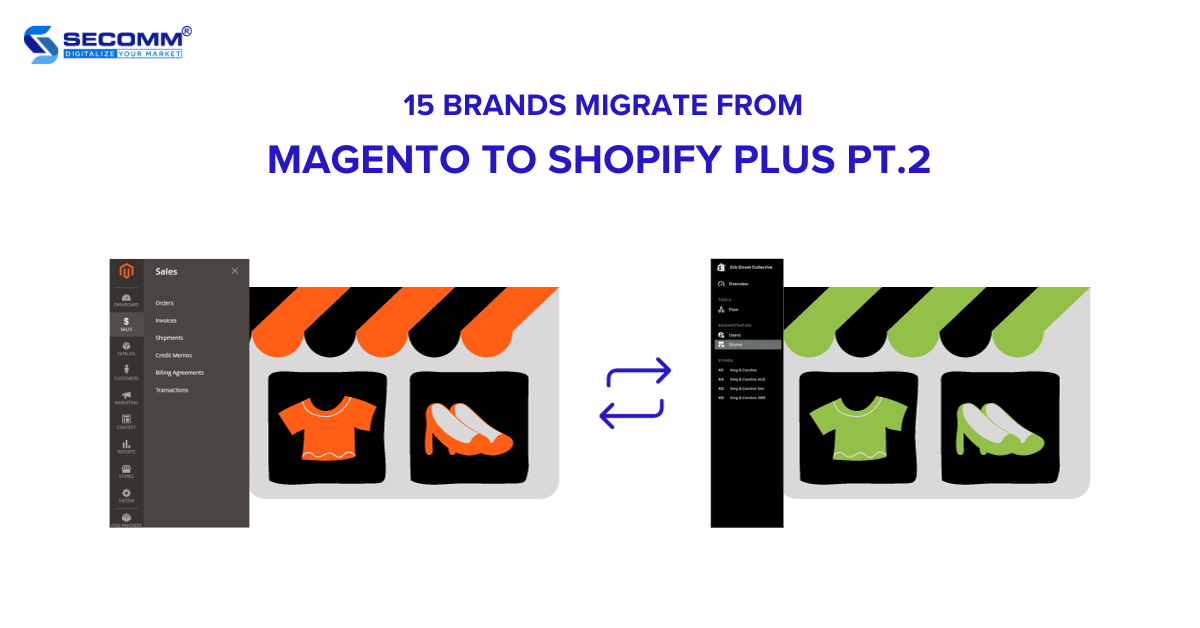
When it comes to brands that migrate from Magento to Shopify Plus, it’s good to read their success stories in sales behind. In the second part of this series, let’s continue to delve into more brands that chose to migrate their eCommerce platforms from Magento to Shopify Plus, and explore how this decision paved the way for boundless success.
Originally established as a wholesaler distributing high-quality underwear through pharmacies, Boody later identified new growth opportunities by venturing into online sales for environmentally conscious fashion enthusiasts.
Boody initially deployed an eCommerce website on the Magento platform, but the absence of a dedicated technology team severely limited management, operations, and customization capabilities.
Also, inconsistencies between the frontend on mobile devices and laptops, utilizing different technological solutions, resulted in a non-uniform user experience and inefficient use of system resources.
To address these challenges and pursue goals of international expansion, Boody sought a platform that could alleviate the burden of management and operations while providing a consistent customer experience.
The fashion brand switched from Magento to Shopify Plus, promptly implementing automated solutions for processes such as email and security checks using Shopify Flow. Boody also adopted Shopify Payments to facilitate online transactions without the need for integration with third-party payment service providers.
The platform overhaul with Shopify Plus significantly enhanced the operations. Leveraging the robust integration capabilities of Shopify Plus, Boody seamlessly integrated with third-party systems to strengthen customer relationships, including platforms like Klaviyo, Gorgias, and Odoo.
Benefiting from the flexibility and solutions offered by Shopify Plus, Boody developed a customized eCommerce website without requiring extensive technical expertise. This allowed the Boody team to focus on multi-channel sales strategies and international expansion.
Shortly after the platform transition, Boody rapidly expanded into 10 international stores, witnessing a 70% increase in online sales and a 5% rise in conversion rates. With Shopify Plus, Boody is realizing its mission to become the world’s most beloved sustainable underwear brand.
Learn more: 15 brands migrate from Magento to Shopify Plus Pt.1

Alessi is a renowned Italian brand specializing in the design and manufacturing of high-quality household and interior decoration products. The brand was established in 1921 and has since become one of the icons of Italian art and design.
Alessi pays attention to every detail in product design while relying on third-party units to enhance the aesthetics of its website design.
However, the Magento eCommerce platform, which Alessi had been using for a long time, suddenly announced the end of support for older versions, obliging merchants to upgrade to a higher version.
Faced with the complex and time-consuming upgrade process, Alessi decided to seek an alternative solution.
Moreover, the outbreak of the Covid-19 pandemic in Italy and across Europe prompted Alessi to make necessary changes to maximize online sales. The business executives aimed to re-establish the platform within just 12 weeks.
In reality, Boody achieved the goal in less than 3 months by completing the e-commerce platform transition from Magento to Shopify Plus.
Since implementing Shopify Plus, Alessi has seen a 233% increase in page views, a 109% increase in conversion rates, a 222% increase in transaction volume, and a 210% increase in total online revenue.
Alessi can now rest assured that customers will have an engaging shopping experience on the website, reflecting the true brand image that the business has spent a century building.

Rebecca Minkoff, a renowned high-end fashion brand from the United States, is well-known for its handbags, footwear, and fashion accessories. The brand’s products often embody a blend of alluring, practical, and creative styles.
Rebecca Minkoff not only focuses on creating aesthetically pleasing fashion items but also consistently leverages technology to provide customers with novel shopping experiences over the past decade.
In addition to this, the customer’s online shopping experience on the brand’s eCommerce website is a particular area of emphasis. The migration from the Magento eCommerce platform to the Shopify Plus platform is also part of Rebecca Minkoff’s strategy.
Utilizing solutions available within the Shopify Plus ecosystem, coupled with robust and seamless integration capabilities, has enabled this fashion brand to implement 3D and AR (Augmented Reality) technologies.
These technologies aim to enhance customers’ unique, detailed, and realistic views of products, ranging from styles to materials.
According to the company, individuals interacting with 3D models are 44% more likely to add that model to their shopping carts compared to those who do not interact. Among visitors who engage with 3D models, they have a 27% higher likelihood of placing an order compared to non-interacting individuals.
Rebecca Minkoff notes that when customers view a product in AR, their likelihood of making a purchase increases by 65%.
This positive step in eCommerce has significantly contributed to business growth. According to Rebecca Minkoff, 65% of customers interacting with AR products tend to make purchasing decisions swiftly, and with 3D technology, this figure is 27%.

Established in 2012 in the United Kingdom, Blakely is a unisex fashion brand known for its youthful and dynamic style. Blakely’s product range includes t-shirts, hoodies, sweaters, leggings, jeans, and fashion accessories. The brand aims to provide high-quality, beautifully designed, durable products that align with current fashion trends.
Blakely’s eCommerce website was initially built on the Magento platform. However, the system frequently experienced crashes, especially during peak shopping periods like Black Friday, affecting customer shopping experiences and the brand’s revenue.
Another concern for Blakely with the previous platform was its limitations in integrating with third-party applications, posing challenges in reaching target customers and efficiently managing customer data to drive real growth. Furthermore, the lack of tools for data management led to issues in the personalization and localization of the customer experience.
Therefore, after careful consideration, Blakely decided to migrate from the Magento platform to Shopify Plus. With the implementation of Shopify Plus, Blakely successfully launched two additional eCommerce websites specifically catering to EU and U.S. customers, enabling the brand to sell more efficiently in international markets.
Blakely also utilized Shopify Plus’s available themes and seamlessly integrated with third-party tools to not only provide an optimal shopping experience for customers but also support effective data management.
Switching to Shopify Plus brought about significant positive changes for Blakely in terms of sales. Specifically, the conversion rate increased from 1.4% to 2.6%, and the EU store witnessed an impressive 30% growth since its launch. Global sales increased by 49%, with a 130% increase in sales in the U.S. and a 60% increase in sales in the EU.

Peepers is a fashion brand specializing in reading glasses and sunglasses with its main headquarters located in Michigan, USA. The brand is known for blending modern design with quality, offering high-quality products at affordable prices.
Despite several redesigns that consumed considerable time and budget, Peepers’ Magento website failed to meet expectations.
The brand aimed to enhance page loading speed and provide customer-centric features, but the costs associated with each change or system update on Magento proved to be a significant expense for Peepers.
Therefore, Peepers made the switch to Shopify Plus to leverage the platform’s flexible customization capabilities with a more cost-effective approach than Magento.
Furthermore, offering a customized payment experience enhances the security of customers’ personal and payment information, thereby increasing customer trust when shopping on the Peepers website.
Since transitioning from the Magento platform to Shopify Plus, this fashion brand has witnessed a 30% increase in conversion rates and a 20% increase in the average order value (AOV).

Here are the next 5 brands in the series re-platform from Magento to Shopify Plus. While Boody’s motivation for the switch is to ease the burdens of management and operations, Alessi, in contrast, seeks to avoid the expenses and time involved in upgrading to a higher platform version.
Rebecca Minkoff, however, aims to capitalize on the existing ecosystem of Shopify to implement 3D and AR technology solutions for their eCommerce website.
Similarly, Blakely and Peepers overhauled their platforms to streamline operational time and costs, leveraging the advanced integration capabilities of Shopify Plus to deliver a distinctive customer experience.
Throughout SECOMM’s process of executing platform migration, the pivotal factor determining success is a detailed and well-structured conversion plan.
Contact SECOMM or directly call the hotline at (028 7108 9908) to collaborate on devising the optimal plan for the platform migration.
 2
2
 4,902
4,902
 0
0
 1
1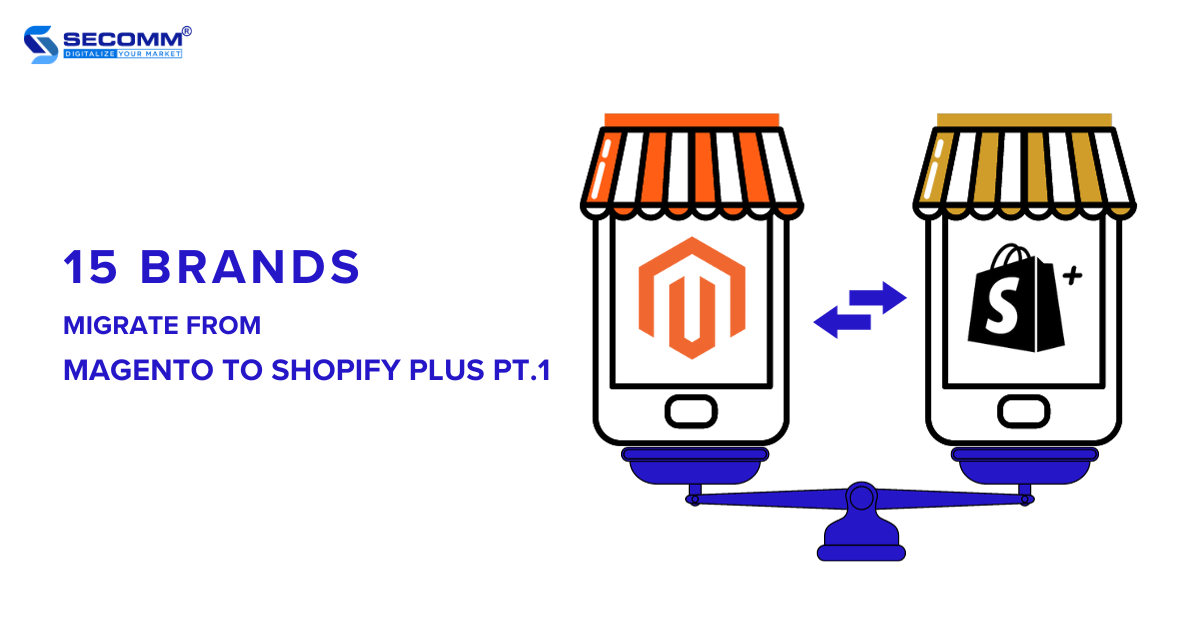
Magento is known as the ‘golden standard’ for many eCommerce businesses. With its scalability and flexible customization, Magento can provide a unique shopping experience.
However, the complexity of deploying, managing, and maintaining the system has led many brands to step out of the ‘Magento world’ in search of more optimal solutions. Shopify Plus is one of the popular choices today for streamlining the migration.
Let’s delve into why the following five brands opted to migrate from the Magento platform to Shopify Plus for their eCommerce websites, and how this strategic decision has contributed to increased conversion rates and sales.
Learn more: 15 Reasons You Should Migrate to Shopify Plus
Established in 2012, Gymshark, a renowned athletic wear retail brand, adopted Shopify Plus. However, before making the switch, the brand had built and developed its eCommerce website using Magento.
For a fashion retailer, year-end shopping seasons, especially Black Friday, represent opportunities for sales growth. Simultaneously, Gymshark’s rapid expansion since its inception required more from a platform capable of managing spikes in traffic and consistently scaling with its business objectives.
Dissatisfied with the existing system, the Gymshark team faced not only the time-consuming setup and operation but also significant costs – amounting to thousands of dollars – for repairing and maintaining the system that crashed precisely during the Black Friday event.
According to Ben Francis, the founder of Gymshark, the eCommerce website was down for about 8 hours, resulting in an estimated damage of over £100,000.
Therefore, Gymshark overhauled its platform with Plus, leveraging Shopify POS and Shopify Script solutions to bridge the gap between offline and online shopping experiences. They enhanced these shopping experiences with custom code snippets at the checkout page.
With these tools, Gymshark only needed to customize based on its specific needs and goals. In contrast, developing such features on Magento could have consumed considerable time and budget.
The platform switch to Shopify Plus helped Gymshark achieve a retail turnover of £41 million and garner over 5.1 million social media followers in 2017, propelling the business to become one of the fastest-growing brands globally.

Arising from an inspiring founding narrative, Bombas, a U.S.-based sock manufacturer and retailer, committed to donating a pair of socks for each pair sold to those facing homelessness. The company garnered successful funding on Shark Tank in 2013, capturing the interest of both investors and American consumers.
However, the joy quickly turned to dismay when Bombas secured a deal with investor Daymond John, and their Magento eCommerce website suffered not one but two crashes—first during the initial airing and then during the subsequent rerun of the episode.
Compounding the issue, the most disastrous moment for Bombas occurred when their Magento website collapsed amid the peak shopping season of Black Friday and Cyber Monday (BFCM).
The system failure hindered customers from completing transactions, resulting in Bombas incurring significant financial losses, additional expenses, and extended downtime for system repairs.
Therefore, Bombas needed a more reliable eCommerce platform that could effectively address the issues they encountered, leading them to choose Shopify Plus.
The infrastructure of Shopify Plus facilitated Bombas in effortlessly and seamlessly expanding their system. Moreover, the eCommerce website system consistently withstood the demands of major shopping events like BFCM and reruns of the Shark Tank program.
Despite the substantial cost of migrating from Magento to Shopify Plus, Bombas swiftly recovered the investment, generating $17.2 million in revenue during the first year of Shopify Plus deployment—a 300% increase compared to the same period the previous year.
The positive outcomes of transitioning to the Shopify Plus platform are evident not only in financial metrics but also in how Bombas has bolstered its reputation and image in the eyes of customers, delivering a premium shopping experience.

In 2010, from the beaches of Costa Rica, two young entrepreneurs, Griffin Thall, and Paul Goodman, started Puravida Bracelets with a mission to collaborate and provide better income opportunities for bracelet artisans in Costa Rica and around the world.
The Puravida Bracelets story gained attention on social media as customers became curious about the close-to-nature lifestyle in South America, particularly in Costa Rica. Over time, the brand expanded its product portfolio to include necklaces, anklets, earrings, and hair ties.
Similar to many other businesses, Puravida Bracelets began its eCommerce journey with the Magento platform.
However, both Thall and Goodman were ambitious young entrepreneurs who desired rapid growth and development for their bracelet brand. Therefore, the challenge was to scale the eCommerce website system while ensuring the most optimal deployment costs.
This led Thall and Goodman to deploy Shopify Plus to find a solution to seamlessly integrate and combine various tools and applications to manage business operations more efficiently, provide a more engaging shopping experience, and increase sales.
The decision to switch from the Magento platform to Shopify Plus helped Puravida Bracelets increase retail revenue by 50% compared to the same period the previous year. Email sign-ups increased by 350%, and email revenue quadrupled compared to before the platform revamp.

PittaRosso is a renowned footwear retail brand from Italy with over 150 retail stores across Europe. The brand’s goal is to provide customers with an omnichannel shopping experience and implement several enhancements for its eCommerce website.
However, issues related to poor website performance, leading to suboptimal product pages on search engines, made PittaRosso hesitate before deciding to pursue the next goal with Magento. The complexity, time, and budget associated with Magento led PittaRosso to revamp its platform with Shopify Plus.
Simultaneously, they implemented a headless architecture for the eCommerce system and redesigned the SEO architecture and content strategy.
The footwear brand customized the frontend and integrated the CMS platform into the Shopify Plus backend to improve page loading speed, user experience, and SEO results. PittaRosso’s strategic shift coincided with the significant growth of eCommerce spurred by the Covid-19 pandemic, boosting the business’s eCommerce sales in 2021.
By 2022, the sales figures even surpassed expectations, with a 37% increase in net profit compared to the same period the previous year.
Building on this success, PittaRosso implemented payment integrations and automation to optimize multichannel sales operations and the overall shopping experience.
Re-platforming from Magento to Shopify Plus helped the business maintain a steady annual increase in conversion rates, sales, and notably, Black Friday Cyber Monday (BFCM) sales.
Learn more: What is Headless Shopify?

After six years of using Magento, the world’s largest retailer of military surplus and collectibles, IMA, fell victim to a hacker attack that resulted in the theft of a considerable amount of customer credit card information.
This incident led to IMA facing substantial fines from VISA, and Alex Cranmer, the Vice President of IMA, criticized Magento for its delayed notification to merchants about this security vulnerability.
IMA spent over $50,000 and three months rectifying security flaws in its system. Shortly after, Magento announced the discontinuation of support for older versions, implying that IMA needed to upgrade to a higher version, incurring potentially tens to hundreds of thousands of dollars in expenses and an extended timeline for completion.
In response, IMA decided to replatform from Magento to Shopify Plus, seeking a more secure solution for IMA’s system and enhancing the customer experience. Besides security and customization, some unique solutions such as Shopify Flow and LaunchPad significantly boosted IMA’s profit margins.
The costs associated with platform usage, maintenance, operations, and updates were notably reduced compared to deploying Magento.
Cranmer admitted to being complacent, thinking that Shopify was only suitable for individuals selling a small volume of products.
However, the Plus version surprised him with its specialized solutions and features designed explicitly for large, unlimited-growth businesses on their journey.

Here are five brands that have witnessed a remarkable change in sales by migrating to Shopify Plus. An important point to note is that while Magento provides high scalability and customization, the process demands a substantial budget and an extended deployment timeline.
Additionally, there is a need for technical expertise to determine when and how the system should expand. Sometimes, businesses may even face security vulnerabilities, as in the case of IMA.
On the other hand, Plus provides flexible customization with optimized costs, a faster time to market, and simplified maintenance and updates, following the platform’s rules.
Through accumulated experience in numerous eCommerce platform migrations, SECOMM is not only a solution provider but also a reliable partner for every business on its eCommerce journey.
Contact SECOMM or call directly on the hotline (028 7108 9908) for professional advice on planning the migration from Magento to Shopify Plus, unlocking unlimited development opportunities in the digital age.
 2
2
 4,998
4,998
 0
0
 1
1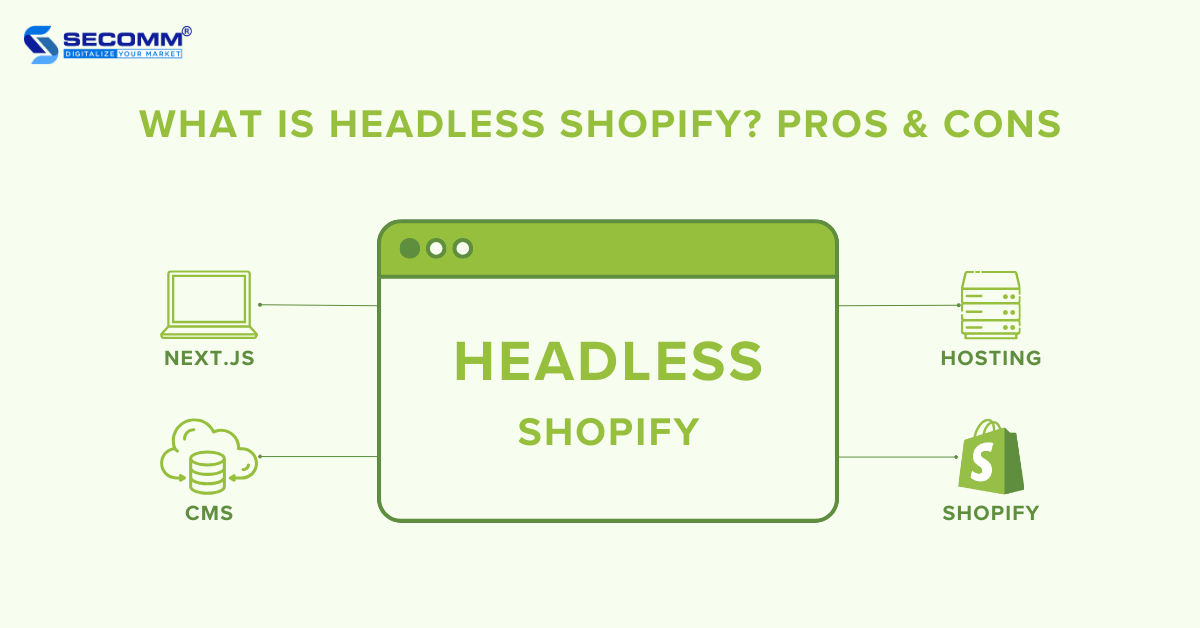
eCommerce is undergoing a revolution, where businesses no longer need to strictly bind to traditional eCommerce models like Monolithic Commerce. Instead, they can create distinctive and adaptable customer experiences across a variety of digital channels through a methodology known as Headless Commerce.
Headless Commerce involves the separation of the frontend and backend of an eCommerce website. This allows the backend to transmit content through APIs to diverse frontends, including websites, mobile apps, IoT, POS, and more. Headless Commerce also gives you greater flexibility in customizing frontends compared to monolithic systems.
Learn more: Monolithic, Headless, Composable or MACH artchitecture
Among the prominent eCommerce platforms today, Shopify stands out with numerous effective solutions for headless deployment. This article on Headless Shopify delves into the concept, advantages and disadvantages, and solutions, and offers insights to help determine whether it is a suitable fit for every business.
It is a way to build an eCommerce website using Shopify but separate the frontend (user interface) and backend (product management, order processing, payment system).
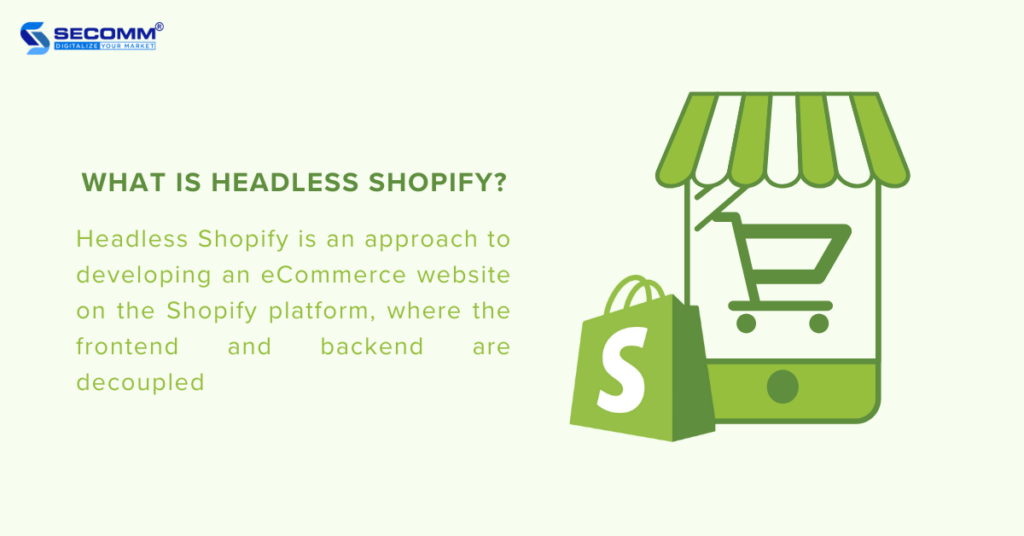
With this headless solution, businesses have the flexibility to use their preferred content management system (CMS) or frontend technology and then connect it to Shopify’s backend through the Storefront API.
Key features of a Headless Shopify store include:
Learn more:
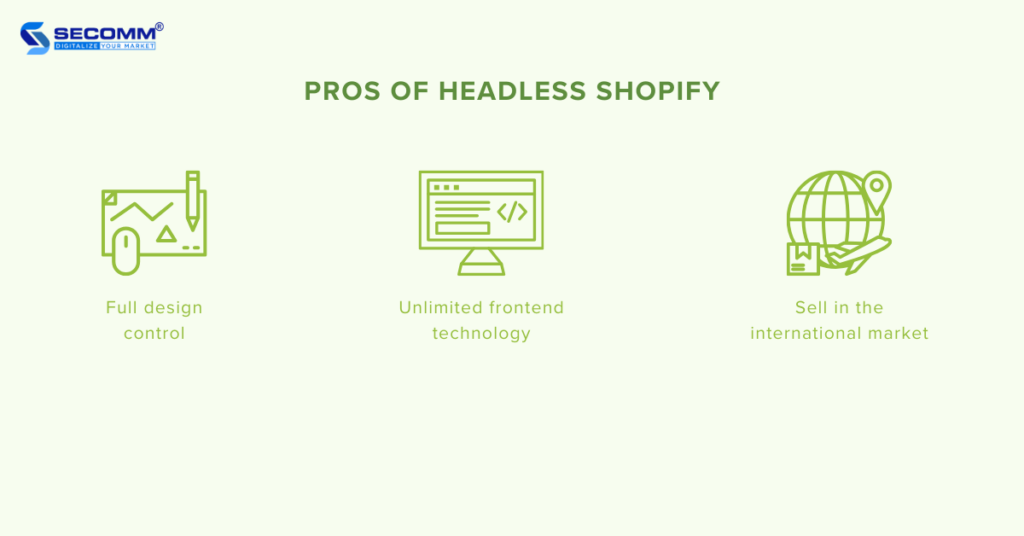
Headless Shopify provides extensive customization for interface design and personalized user experiences. While the themes, including both free and premium options, boast attractive and modern designs with diverse choices for various business niches, these themes still come with constraints in terms of customization and features.
By using it, you can maximize customization for both interface design and user experience, creating a unique identity and enhancing your competitive edge.
It imposes no limitations on the type of devices or platforms that can display content. Content created and managed on the backend system can be displayed on any device or platform that the business desires.
In other words, content data from the Headless Shopify system is distributed in API format to various modern frontend technologies, such as websites, mobile apps, IoT, POS, etc. This facilitates the distribution of user-tailored content across different devices and platforms, ensuring seamless and optimized multichannel selling.
With Headless Shopify, you can customize frontend interfaces, integrate Headless CMS, and incorporate local payment systems to distribute content and provide a shopping experience tailored to users in each market. This customization includes aspects such as domain, language, currency, payment gateways, and local payment methods.
Plus, you can leverage the Shopify Markets solution, which offers a full range of features, both basic and advanced, enabling you to expand your reach globally.
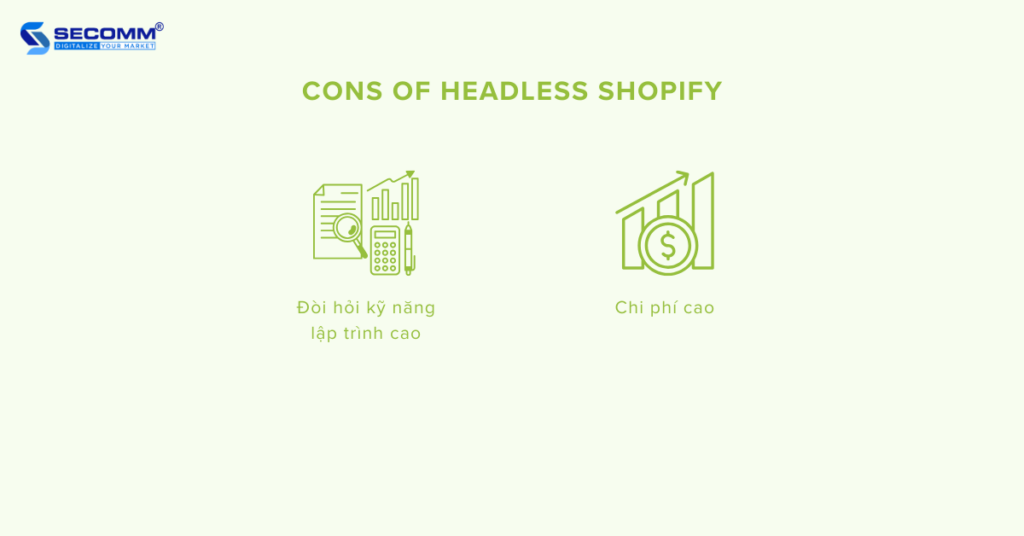
Traditionally, Shopify has provided businesses with a ‘Plug-and-play’ solution, meaning that applications or utilities can be integrated into an online store and activated for easy use without the need for complex programming.
However, The headless solution provides you with advanced customization and scalability, requiring a higher level of technical expertise and complexity.
To address this challenge, you can partner with specialized developers like SECOMM for tailored guidance throughout deployment. These experts can provide insights on the recommended customizations to enhance system performance and user experience.
When deploying Headless architecture, there are three types of fees to consider: platform fees, development fees, and maintenance fees.
As deploying Headless Commerce requires high technical expertise, the development cost will be significantly higher than implementing a Monolithic Commerce model.
Moreover, going Headless with SaaS platforms such as Shopify or CMS, ERP, PIM, and CRM requires monthly payment fees, making cash flow management challenging due to the potential fluctuations in platform usage, affecting monthly expenses.
Learn more:
Throughout the evolution of eCommerce technology, Shopify has accurately anticipated and provided solutions to meet the deployment needs of businesses worldwide.
Notably, the trend of adopting Headless Commerce has been shaping the global landscape for several years, and Shopify has offered outstanding solutions for businesses to implement Headless based on its platform infrastructure.
The beauty brand Victoria Beckham Beauty was launched in 2019, aiming to provide an optimal user experience across multiple global markets with high performance. To achieve this, the company deployed Headless Shopify Plus to manage products, orders, and payments.
It integrated Contentful as a Headless CMS to store and distribute content data to frontends, including the website and mobile app, through the Storefront API.
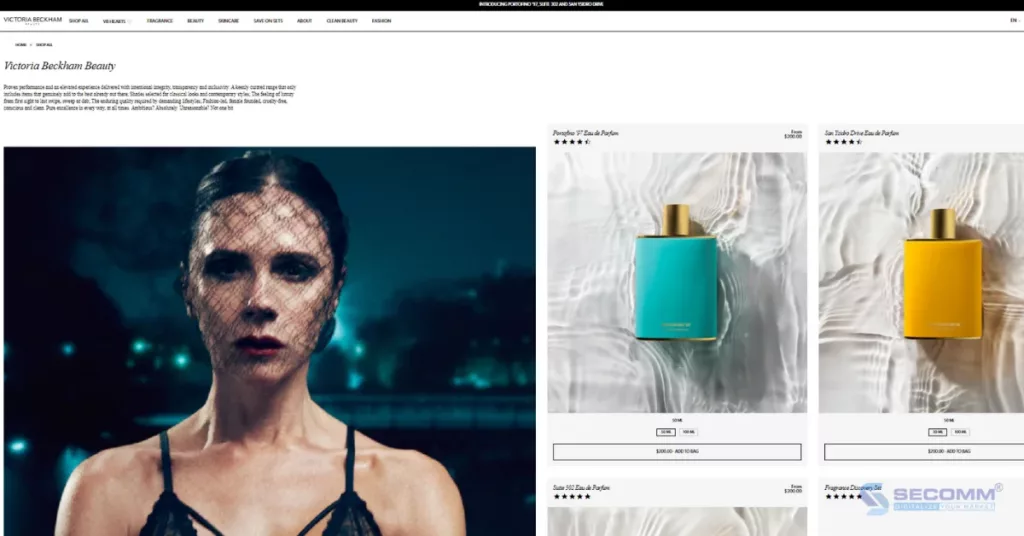
Since its establishment in 2015, Paul Valentine has become a major global jewelry brand with over 12 local stores, each with its dedicated sub-domain, to cater to diverse user demographics.
To streamline content management for these 12 stores within a centralized system, Paul Valentine has developed a Headless eCommerce website using the Vue.js framework on the Shopify Plus platform for backend management.
The Headless CMS platform, Contentful, is seamlessly integrated into the Shopify Plus backend system, enhancing the efficiency of content management and distribution across the interfaces of the 12 local stores, spanning both the website and mobile app through the Storefront API layer.

To meet the requirement of integrating an eCommerce website and a corporate information website into a unified user experience, SECOMM has supported Vinamilk in restructuring the system with a Headless architecture. Shopify Plus manages the ‘eCommerce’ aspect, while a Headless CMS platform is utilized for storing, managing, and delivering content to user interfaces. This results in a comprehensive custom Headless Commerce + Headless CMS model.
Learn more: 15 brands deploy Headless Commerce with Shopify Plus

The answer is no.
While both the core and the Plus can implement Headless Commerce, the high flexibility of Shopify Plus makes the process easier, especially when utilizing the Headless solutions.
In essence, headless architecture is better suited for businesses with high demands for flexibility, customization, and scalability, as well as a desire for uniqueness to craft a diverse and seamless customer experience. If your business simply wishes to engage in straightforward online selling, core Shopify is sufficient.
On the other hand, for those seeking a balance between flexibility and stability, Plus is a viable option.
With a wealth of experience going headless for major enterprises like Vinamilk and Suzuverse, SECOMM boasts a highly skilled technical team with deep expertise in Shopify and the execution of Headless solutions on this platform.
Contact or call SECOMM’s hotline directly at (028 7108 9908) to receive advice on deploying Headless Shopify that is suitable for each business model. The team will also provide a detailed development roadmap divided into different stages.
 2
2
 6,799
6,799
 0
0
 1
1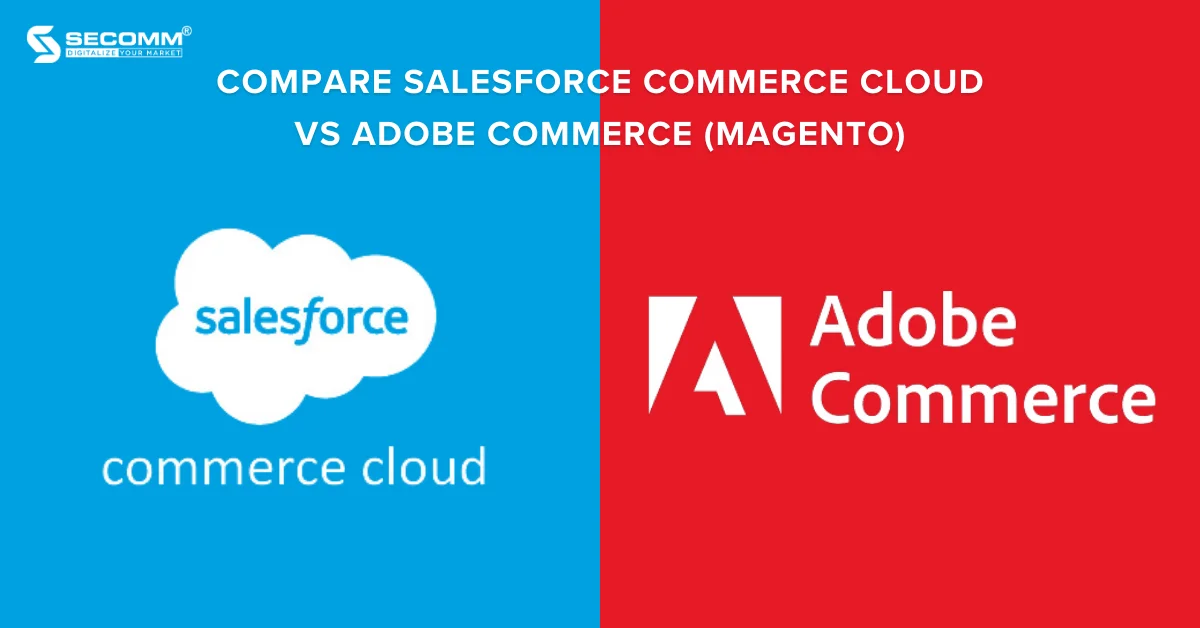
Salesforce Commerce Cloud and Adobe Commerce (Magento) are two leading platforms in the field of eCommerce, trusted by many large enterprises. However, both of these platforms have significant differences.
Let’s explore the important aspects of both with SECOMM to help businesses decide which platform is suitable for the brand’s business needs.
Salesforce Commerce Cloud, formerly known as Demandware, is a cloud-based eCommerce platform. Salesforce Commerce Cloud operates on the SaaS (Software-as-a-Service) model, providing high scalability and a range of features and capabilities to help businesses create a seamless and effective shopping experience for their customers.
Within Salesforce Commerce Cloud, there are three main editions for building eCommerce websites: Salesforce B2C Commerce, Salesforce B2B Commerce, and most recently, Salesforce B2B2C Commerce.
In the B2C model, there are three solution packages:

Similarly, the B2B model is also divided into 2 solution packages, including:
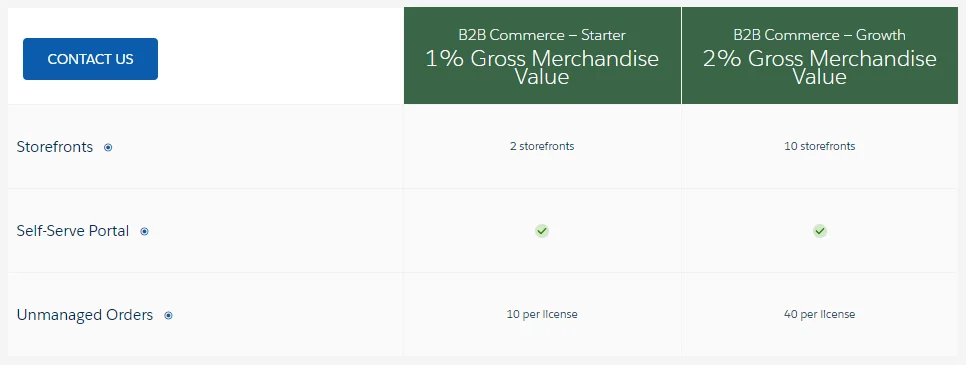
For the B2B2C model, it will be calculated based on 1% Gross Merchandise Value (GMV).
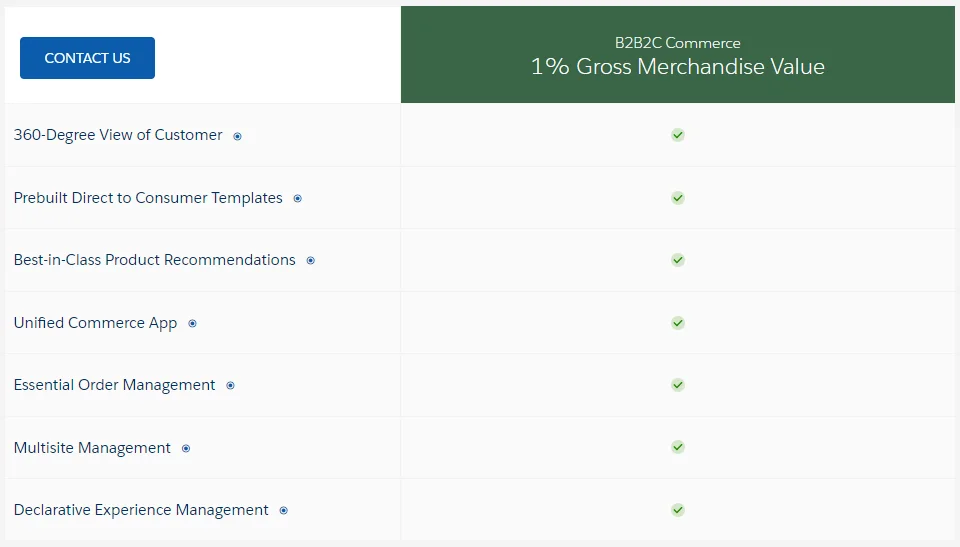
Related article: Top 10 Websites Built On Salesforce Commerce Cloud
Adobe Commerce (formerly known as Magento) is an open-source eCommerce platform designed under the PaaS (Platform-as-a-Service) model, assisting businesses in constructing professional eCommerce websites.
Adobe Commerce can be categorized into two main types:
Additionally, Adobe Commerce still supports the Magento Open Source version – a free version that can be downloaded and used by anyone.
Related article: Top 20 eCommerce Websites Using Adobe Commerce (Magento)
In summary, Salesforce Commerce Cloud and Adobe Commerce are two leading eCommerce platforms with significant differences.
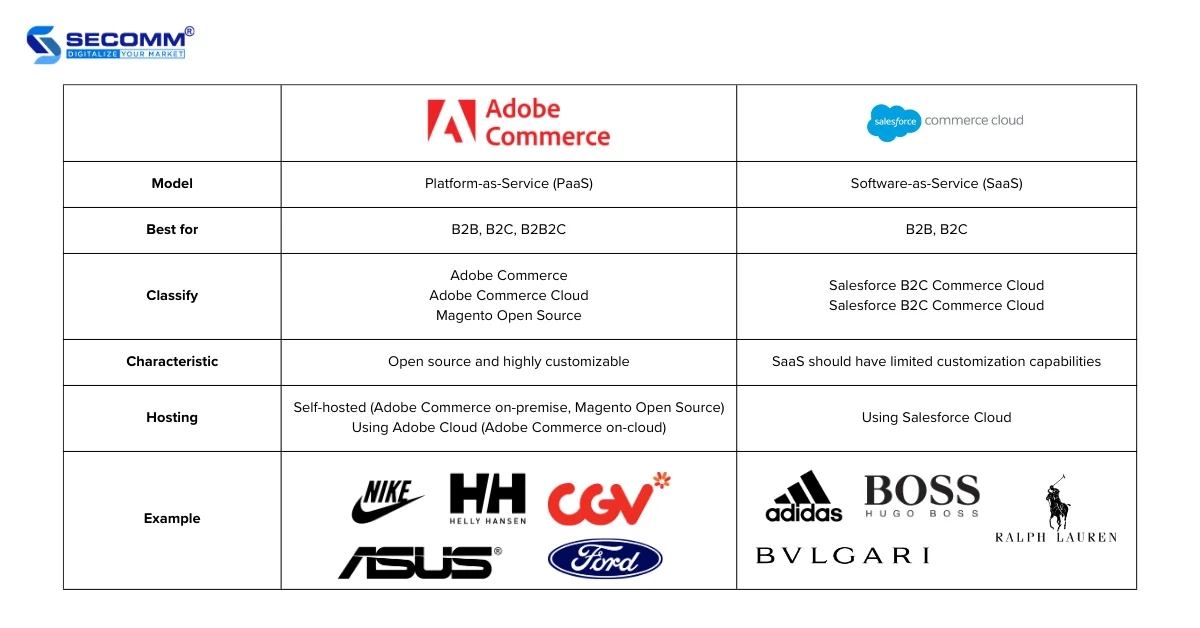
The cost of Salesforce Commerce Cloud depends on various factors but largely hinges on the scale of the business.
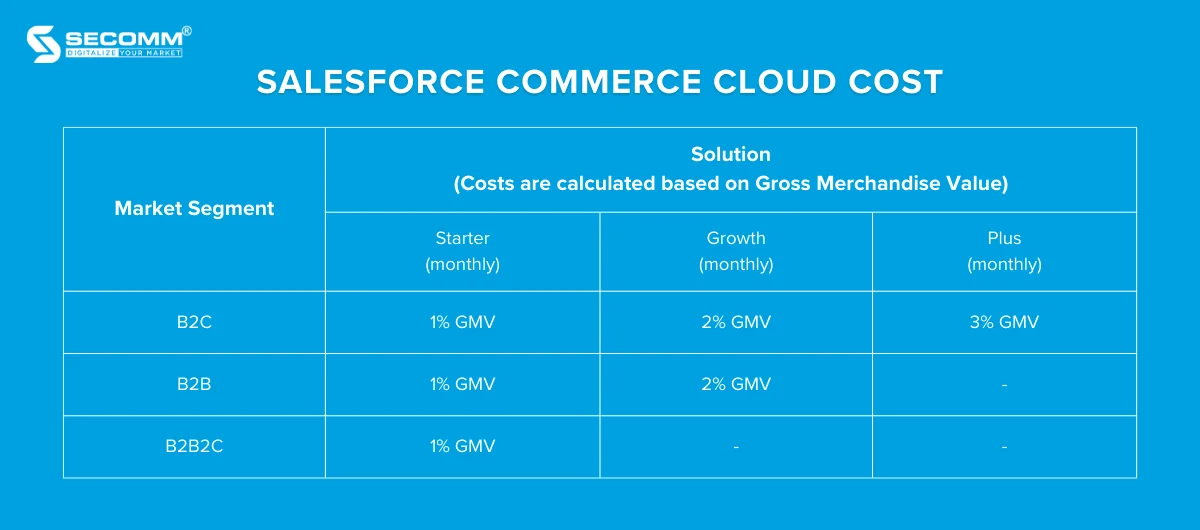
Operating as a SaaS solution, businesses pay a monthly fee based on the number of users and the revenue generated by the website. Costs start from depending on the GMV, averaging around $2,500 per month and can increase to tens of thousands of dollars for larger enterprises.
The cost of Adobe Commerce (Magento) also depends on various factors, including the chosen version and the monthly revenue of the business.
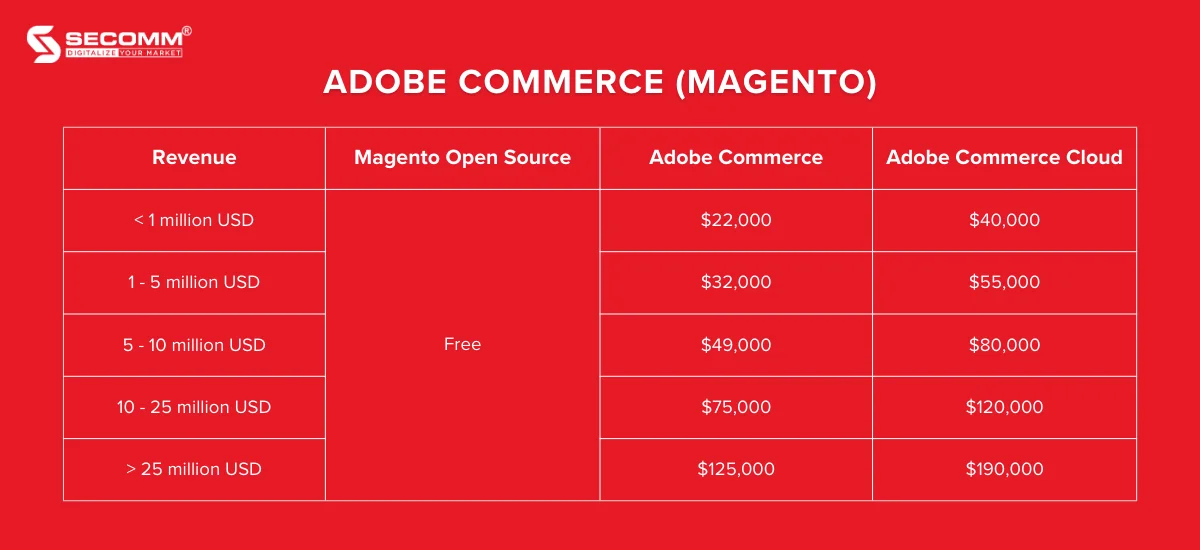
Adobe Commerce is a PaaS solution, meaning businesses must purchase software licenses annually and then pay a monthly fee for hosting and support if needed. License costs start from around $22,000, and hosting costs start from approximately $3,000 per year.
It can be observed that the costs of Salesforce Commerce Cloud and Adobe Commerce (Magento) may vary depending on the business scale, specific requirements, and customization levels.
For instance, for a business with a GMV of $25 million, the platform usage cost for Salesforce Commerce Cloud might be around $250,000/month, whereas for Adobe Commerce Cloud, it could be approximately $120,000/month.
In general, Salesforce Commerce Cloud tends to have higher costs compared to Adobe Commerce.
Related article: The Cost Of Building An Adobe Commerce (Magento) Website
Adobe Commerce (Magento) is built on an open-source architecture, allowing high customization and flexibility. Users can modify a significant amount of source code, making this platform suitable for complex eCommerce needs.
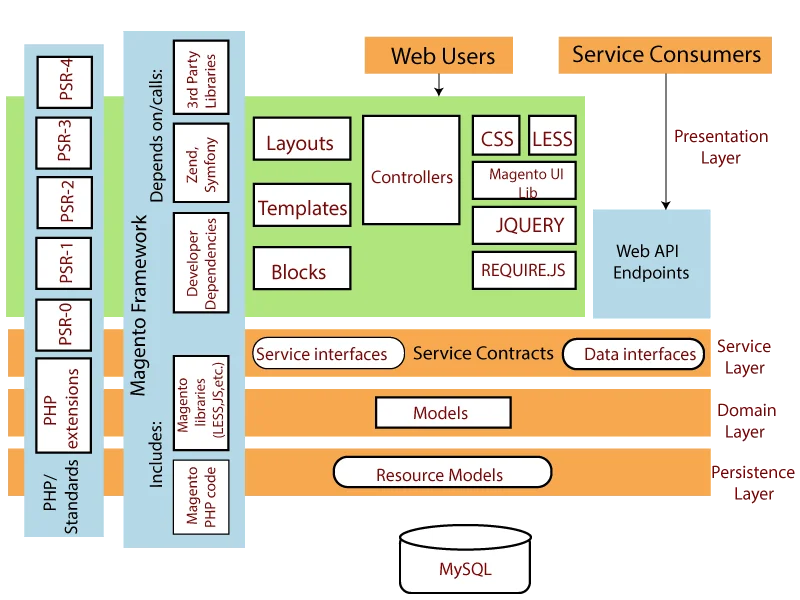
Salesforce Commerce Cloud utilizes a cloud-native, multi-tenant architecture. While this architecture provides significant customization capabilities, it is less flexible for modifying deep code segments compared to open-source architectures like Adobe Commerce (Magento).
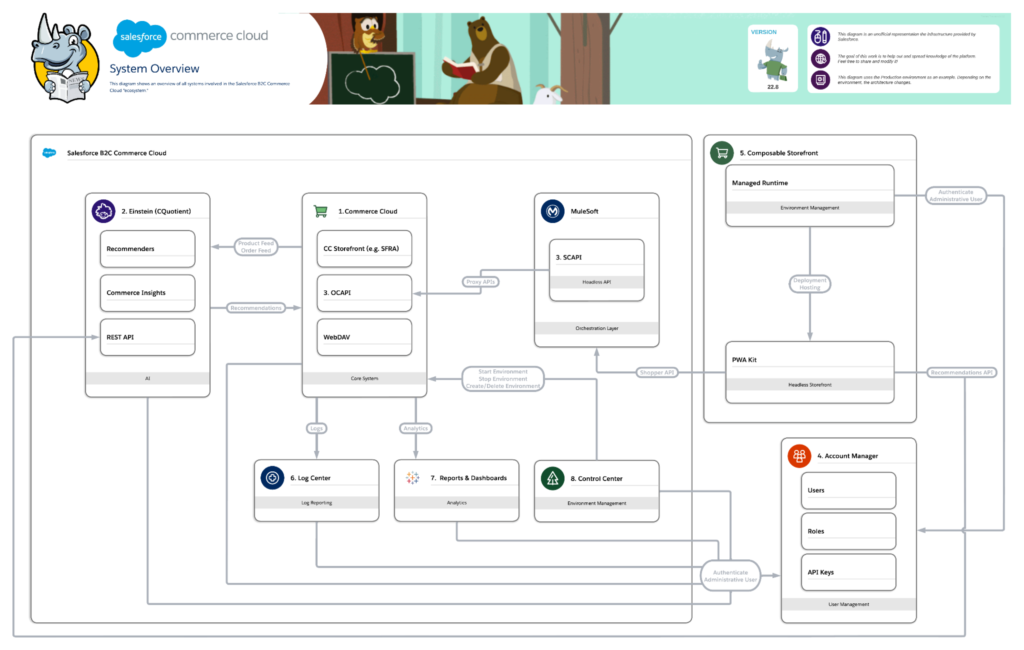
Salesforce Commerce Cloud is part of Salesforce, the leading Customer Relationship Management (CRM) platform today. Salesforce is renowned for its CRM services, including sales, customer, and marketing management.
Consequently, Salesforce Commerce Cloud seamlessly integrates with Salesforce CRM, providing a unified platform for managing and interacting with customers. This tight integration can be a significant advantage for companies heavily reliant on Salesforce for customer management.
Additionally, Salesforce Commerce Cloud seamlessly integrates with the Customer 360 ecosystem, including business management software like data, AI, or third-party utilities partnered with Salesforce.

On the other hand, Adobe Commerce Cloud is part of the Adobe Experience Cloud, a comprehensive set of solutions for marketing and customer experience.
Thus, Adobe Commerce Cloud integrates with other Adobe tools to support seamless multi-channel customer experience and marketing.
Some commonly used utilities in Adobe Experience Cloud include:
Moreover, Adobe Commerce Cloud offers various integration options and supports third-party extensions and plugins. This means Adobe Commerce can integrate with a wide range of systems such as CRM, POS, WMS, OMS, ERP, etc.
Salesforce Commerce Cloud and Adobe Commerce (Magento) are two widely used leading eCommerce platforms in the market, partially due to their incredibly powerful and diverse feature sets.
Below is a comparison of features between Salesforce Commerce Cloud and Adobe Commerce:
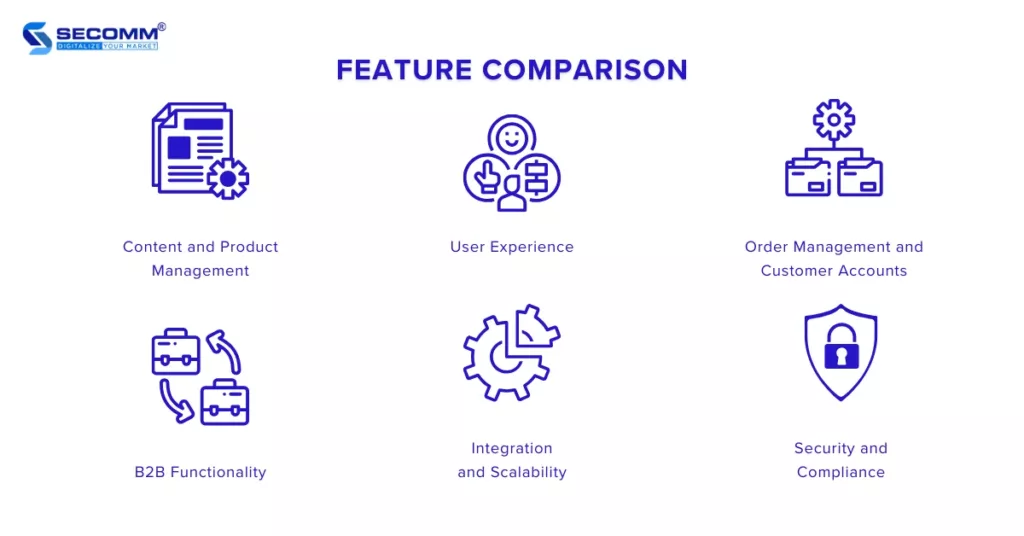
Content and Product Management:
User Experience:
Order Management and Customer Accounts:
B2B Functionality:
Integration and Scalability:
Security and Compliance:
Salesforce Commerce Cloud and Adobe Commerce (Magento) are both powerful eCommerce platforms. However, Salesforce Commerce Cloud is suitable for large enterprises seeking a tightly integrated eCommerce solution with their CRM system.
On the other hand, Adobe Commerce would be a better choice for businesses with high customization needs and a desire for more control over the eCommerce platform.
The selection of the most suitable eCommerce platform for each business will depend heavily on the core needs of the brand.
With deep expertise and the development of complex eCommerce systems for clients such as Changi Airport Group (Singapore), Trentham Estate (Australia), and The Warehouse (Vietnam), SECOMM understands the challenges in choosing a platform and deploying eCommerce that businesses are facing.
Contact SECOMM now or call directly at the hotline number (028 7108 9908) for free advice on the eCommerce website building roadmap!
 2
2
 3,890
3,890
 0
0
 1
1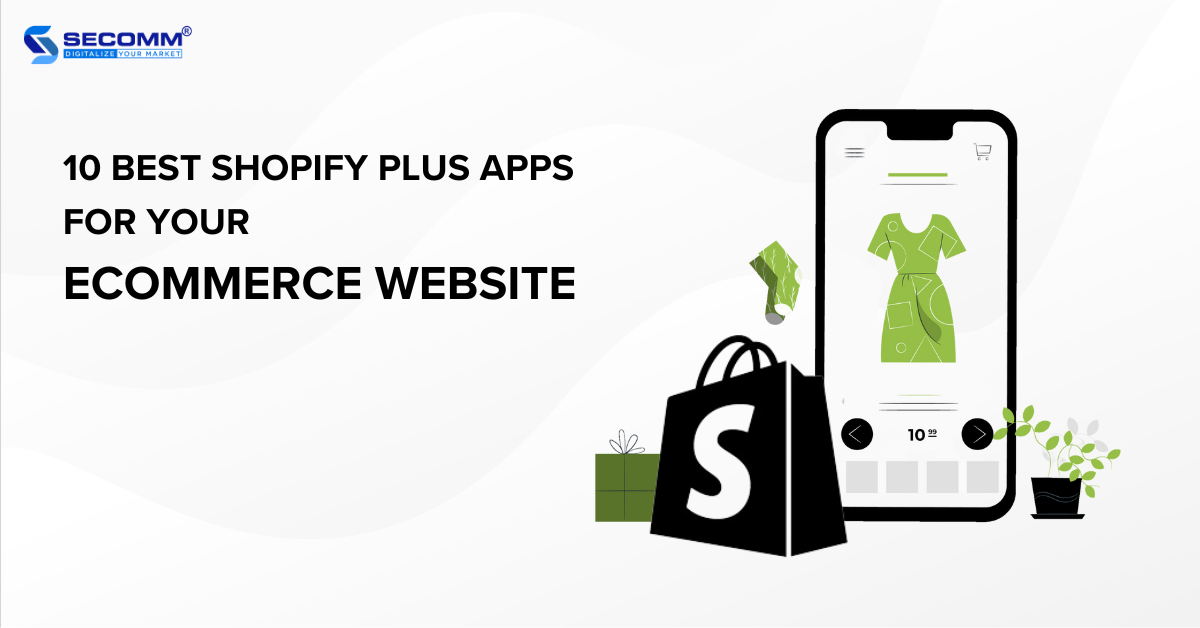
The Shopify Plus eCommerce platform is known not only for its flexibility and high customization but also for its ability to integrate with a variety of apps in the Shopify Plus Certified App, optimizing customer experiences, managing sales, shipping, etc.
The eCommerce world continues to evolve, and choosing the right integrated apps can be a crucial factor in the successful deployment of an eCommerce website.
This article introduces 10 Shopify Plus apps that businesses should consider integrating into their eCommerce websites. These apps not only help optimize operational processes but also ensure that businesses meet all customer needs, create effective campaigns, and increase conversion rates.
Shopify Plus is the premium version of Shopify, offering superior customization and scalability designed to meet the needs of large-scale businesses. Shopify Plus apps are third-party applications or services integrated with the Shopify Plus system to provide management capabilities for various aspects of eCommerce operations, such as marketing, sales, order and shipping management, analytics, and performance reporting.
Using Shopify Plus apps can bring various benefits to businesses, including:
Judge.me is an excellent app designed for businesses using the Shopify Plus platform. This app focuses on collecting, managing, and displaying product reviews and ratings from customers.
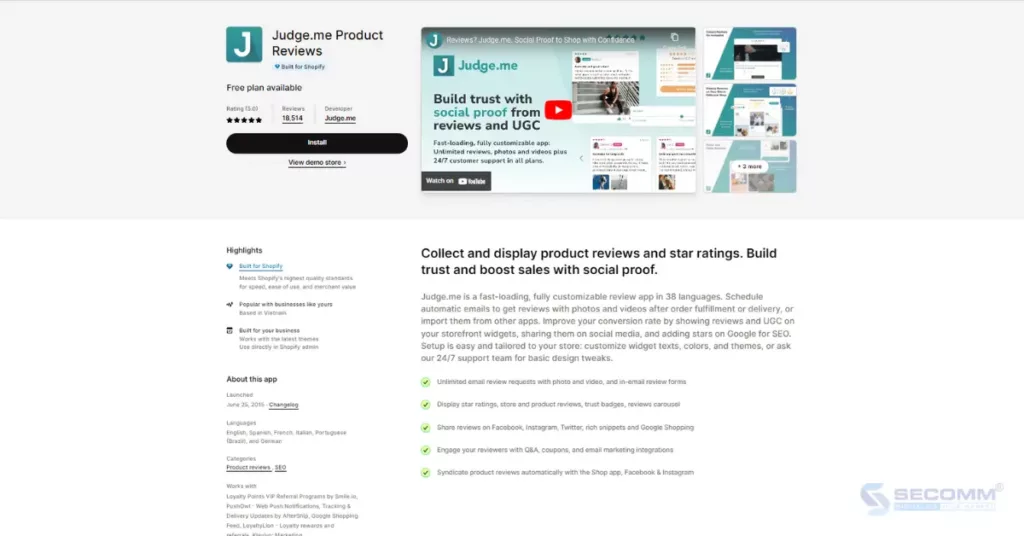
Rating: 5/5
Reviews: 18,391
Core features:
Price: The Judge.me app offers two available solution plans, including:
This is a Shopify Plus app that allows businesses to design personalized customer experiences. This app ensures that the business website provides suggestions and offers products that customers truly care about to satisfy them and thereby increase sales.
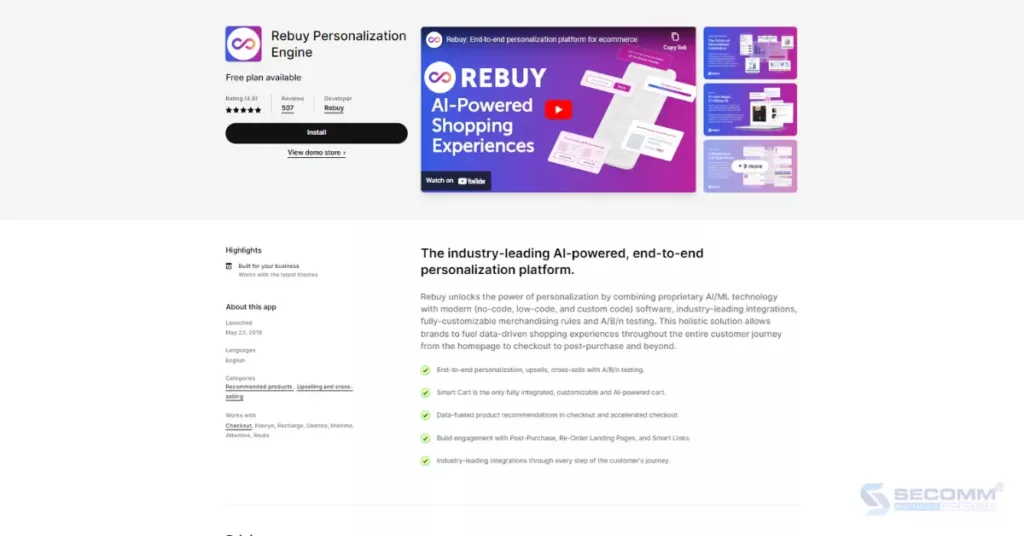
Rating: 4.9/5
Reviews: 508
Core features:
Giá: Rebuy offers Shopify Plus users three solution plans, including:
Among the Shopify Plus apps recommended for eCommerce websites, Smile is frequently mentioned for its Loyalty program applications. This Shopify Plus app helps businesses build and manage customer loyalty programs on Shopify Plus stores to enhance customer interactions, increase conversion rates, and attract potential customers.
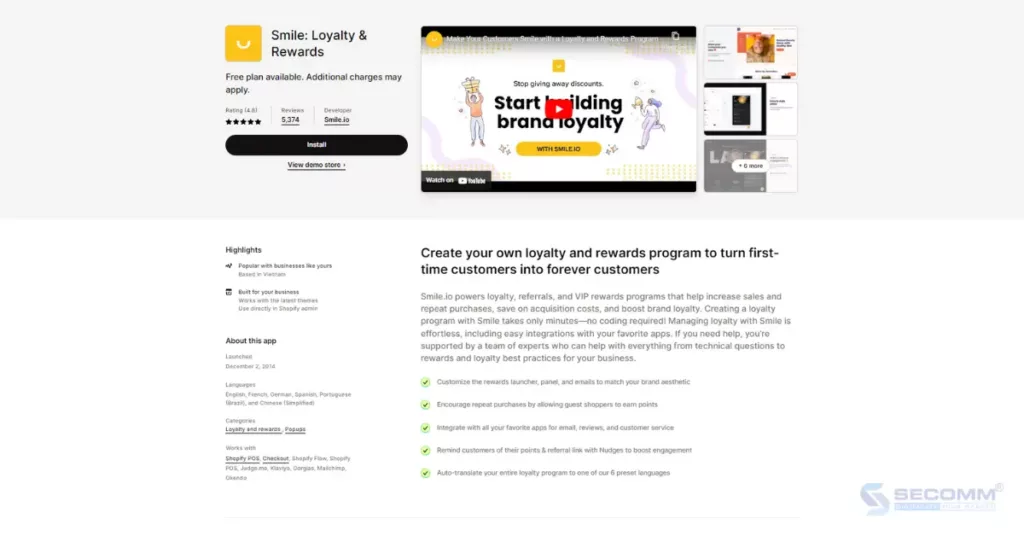
Rating: 4.8/5
Reviews: 5,354
Core features:
Price: Smile offers three solution plans:
Another popular Shopify Plus app is the Shogun Landing Page Builder. This app allows retailers to create beautiful and effective landing pages by providing a visual drag-and-drop editor, enabling Shopify Plus merchants to create custom landing pages without requiring any programming skills.
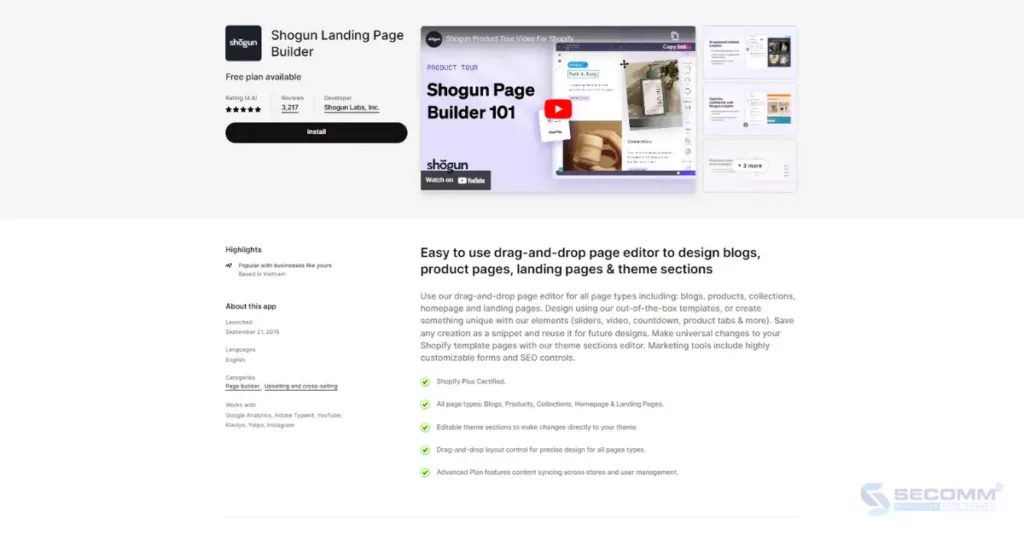
Rating: 4.8/5
Reviews: 3,216
Core features:
Price: Shogun offers four solution plans for Shopify Plus businesses:
Referral is a Shopify Plus app that allows merchants to create and manage referral and affiliate programs. This Shopify Plus app offers a range of features and options to help businesses encourage customers and influencers to refer to their products or services.
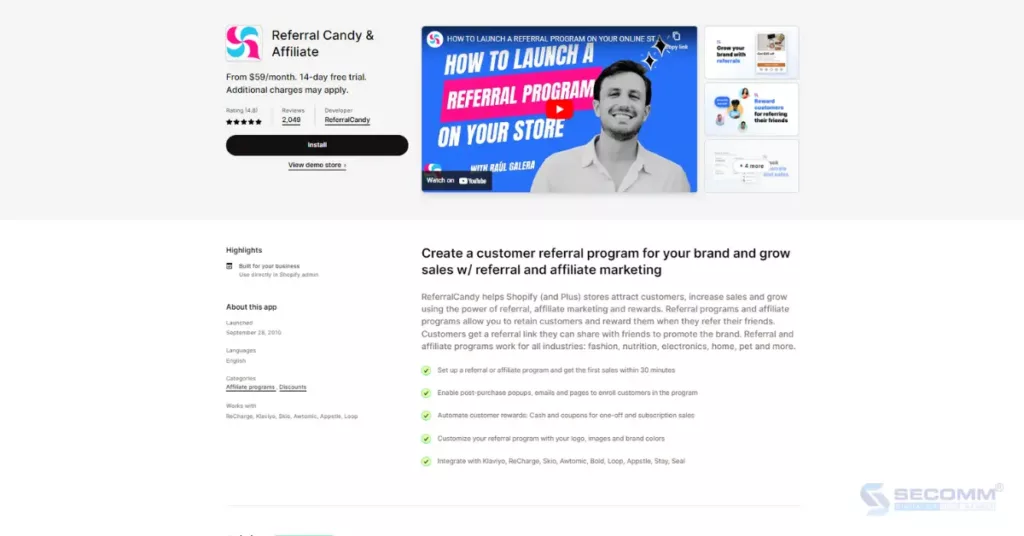
Rating: 4.8/5
Reviews: 2,049
Core features:
Price: Referral offers two solution plans with a 14-day free trial:
AfterShip Returns by Shopify Plus is an optimal solution for businesses seeking to improve the return experience and enhance customer loyalty. The app provides many user-friendly features and options, allowing businesses to automate the return and refund processes and optimize inventory costs.
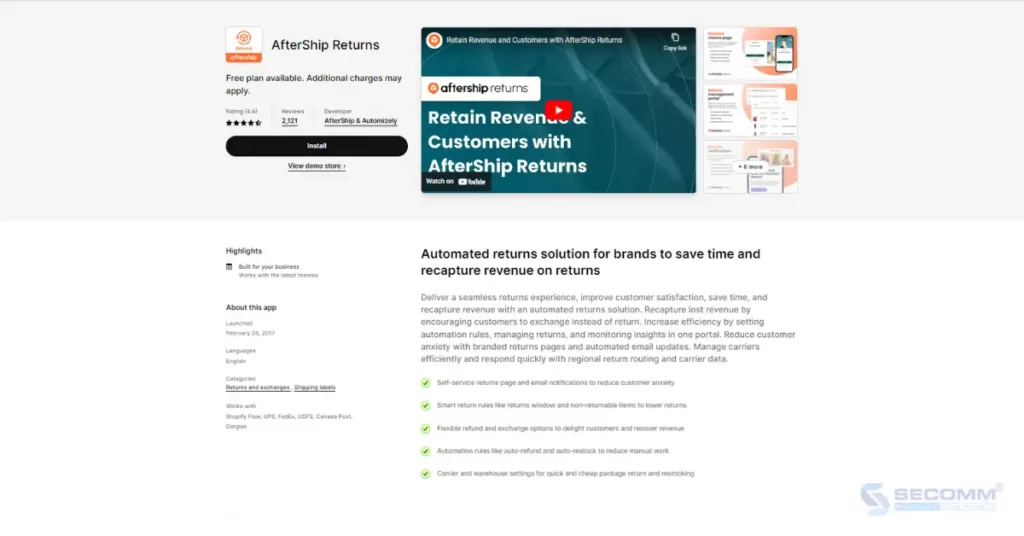
Rating: 4.6/5
Reviews: 2,118
Core features:
Price: AfterShip offers three solution plans for Shopify Plus businesses:
Recharge Subscription is a popular Shopify Plus app that enables businesses to build a seamless shopping journey to maximize revenue and create long-term loyal customers.
With Recharge’s outstanding features, businesses can easily, quickly, and effectively create subscription plans for products or services.
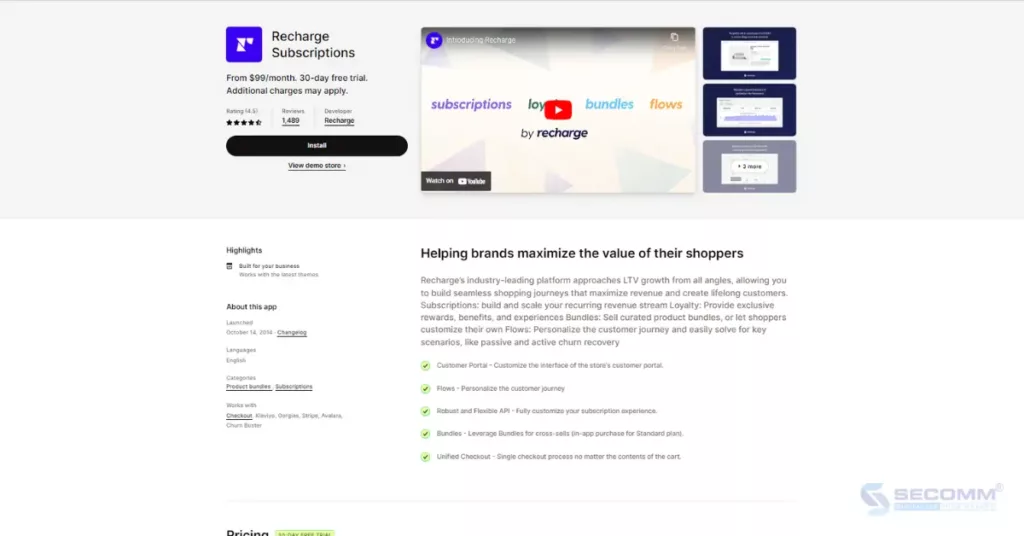
Rating: 4.5/5
Reviews: 1,488
Core features:
Price: Recharge offers a 30-day free trial for businesses.
Gorgias is an app designed for Shopify Plus businesses, focusing on customer service management and online support. Deeply integrated into the Shopify Plus store, Gorgias provides a range of features to help businesses optimize support processes and enhance the customer experience.
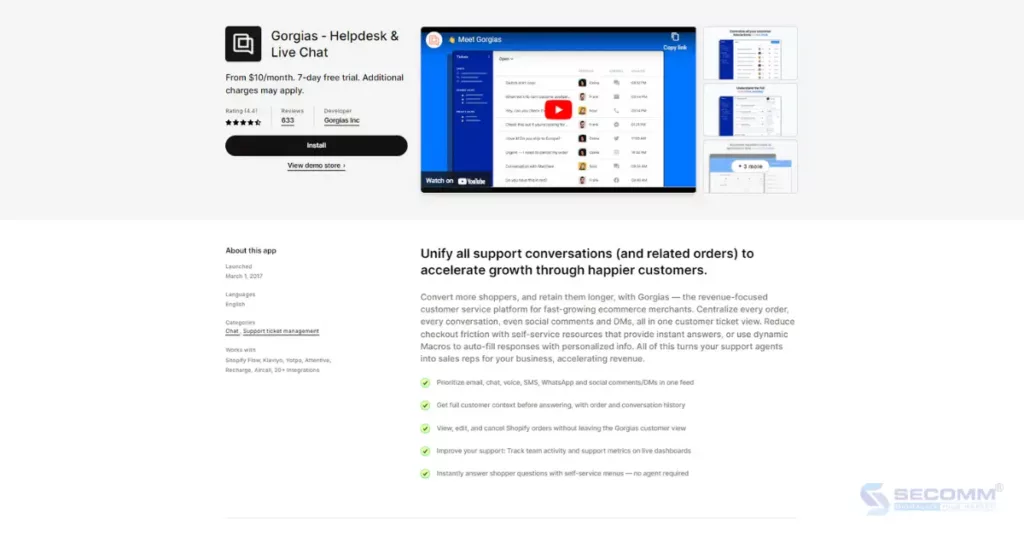
Rating: 4.4/5
Reviews: 632
Core features:
Price: Gorgias offers a 7-day free trial with four solution plans.
Among the Shopify Plus apps, Klaviyo stands out as an application specializing in automated email & SMS marketing. This app helps businesses build and manage automated email or SMS campaigns based on customer data to optimize interactions with customers.
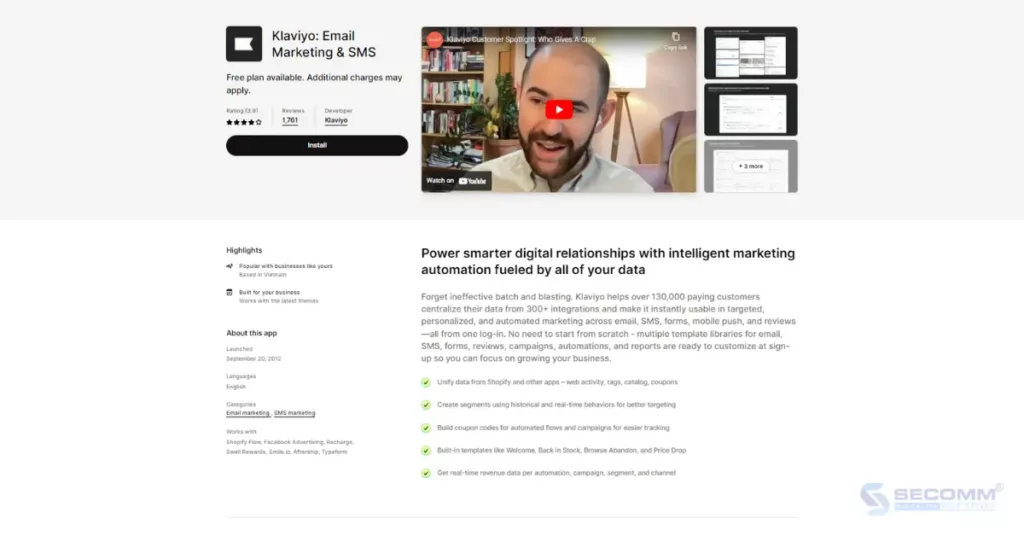
Rating: 3.9/5
Reviews: 1,758
Core features:
Price: Klaviyo offers three solution plans for businesses.
ShipStation is a popular application for managing shipping and delivery processes, integrated into the app store of Shopify Plus. This app helps businesses efficiently manage shipping and delivery processes, optimize label printing, and expedite delivery times.
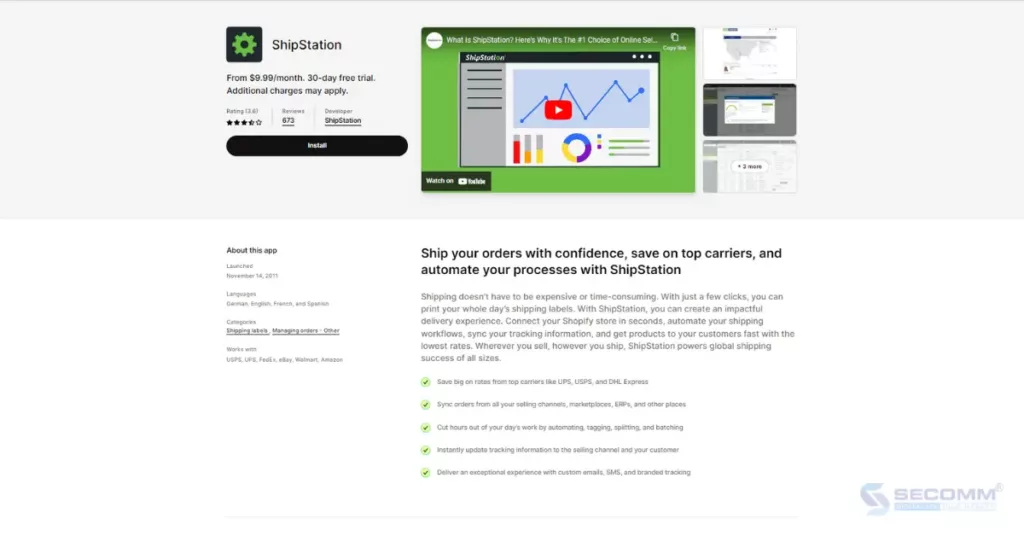
Rating: 3.6/5
Reviews: 674
Core features:
Price: ShipStation offers a 30-day free trial for businesses.
Above are the top 10 Shopify Plus apps in the Shopify Plus Certified App Store. The introduced apps in this article are designed to help businesses optimize the shopping experience, improve sales management, and create more effective marketing campaigns.
However, not all of them may be suitable for every business. Businesses must research and carefully consider before deciding to install and integrate these Shopify Plus apps.
Contact or call SECOMM directly at their hotline (028 7108 9908) for advice on selecting the most suitable apps for your Shopify Plus eCommerce website.
 2
2
 7,384
7,384
 0
0
 1
1Subscribe to get the latest eBook!
Hotline